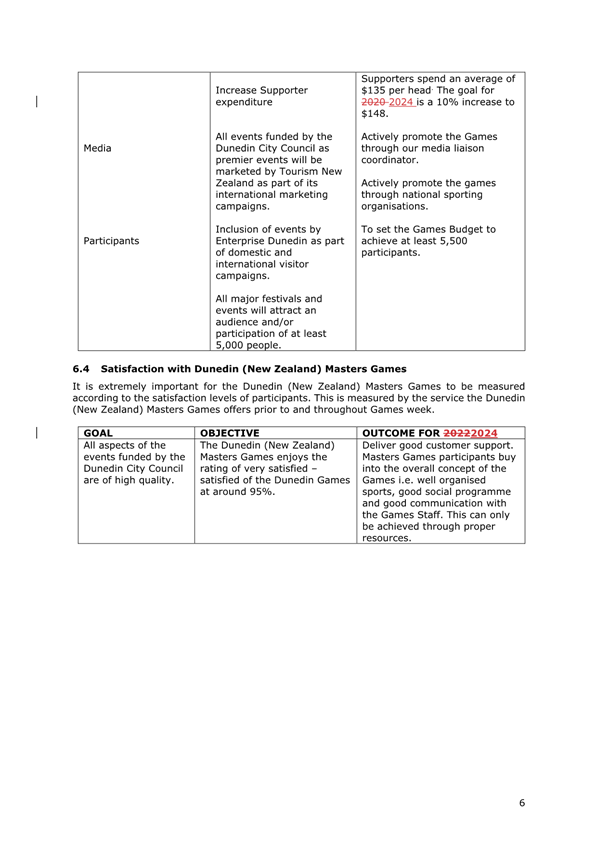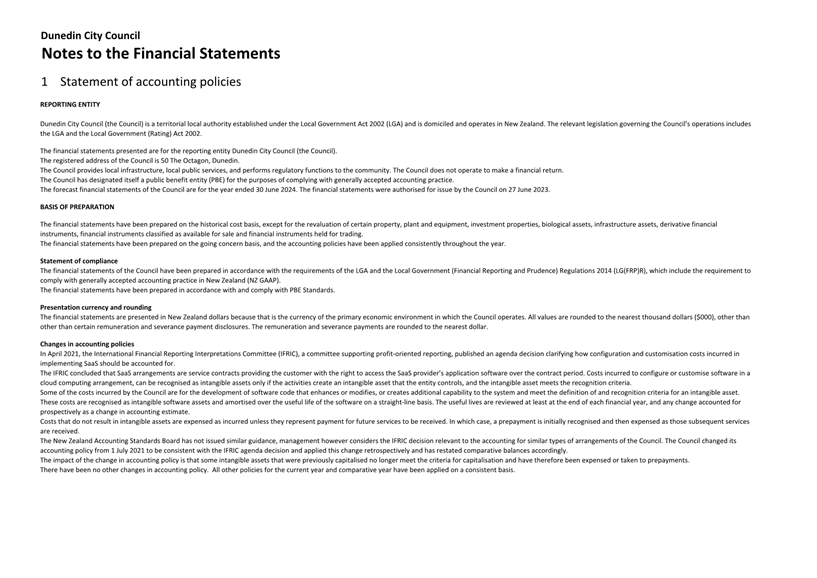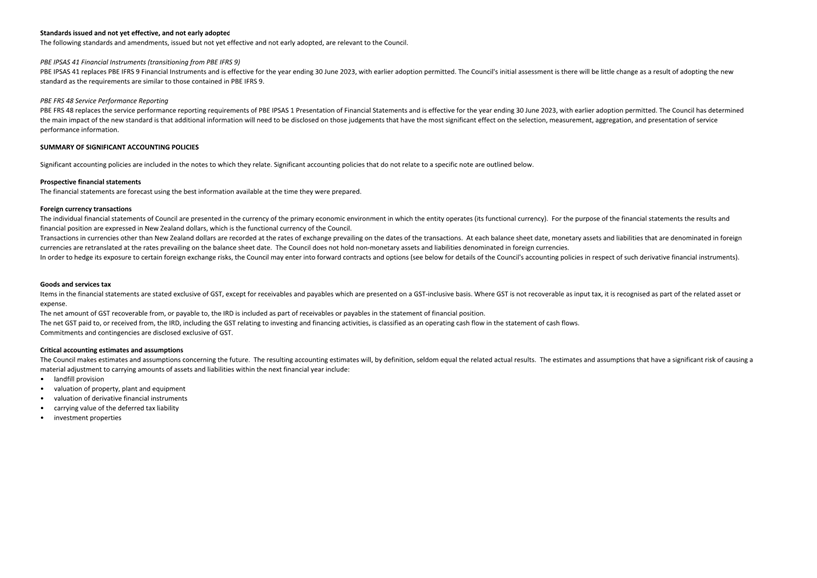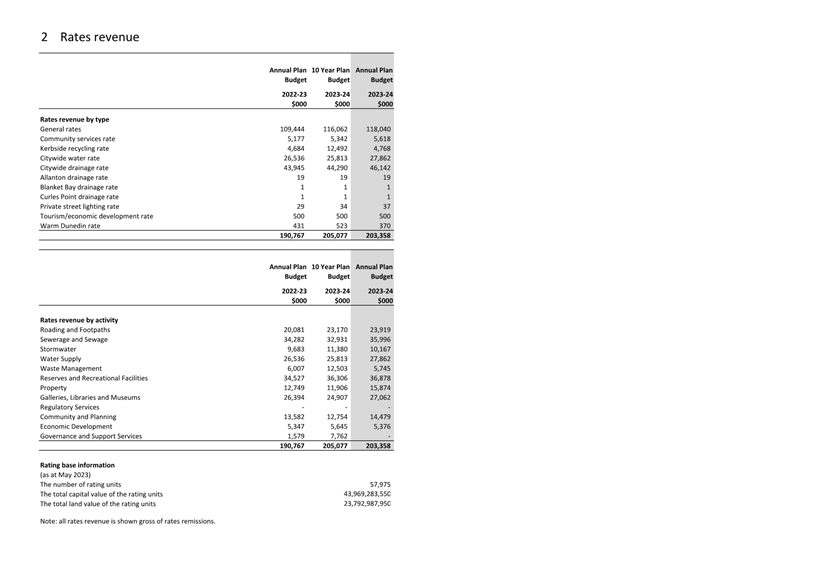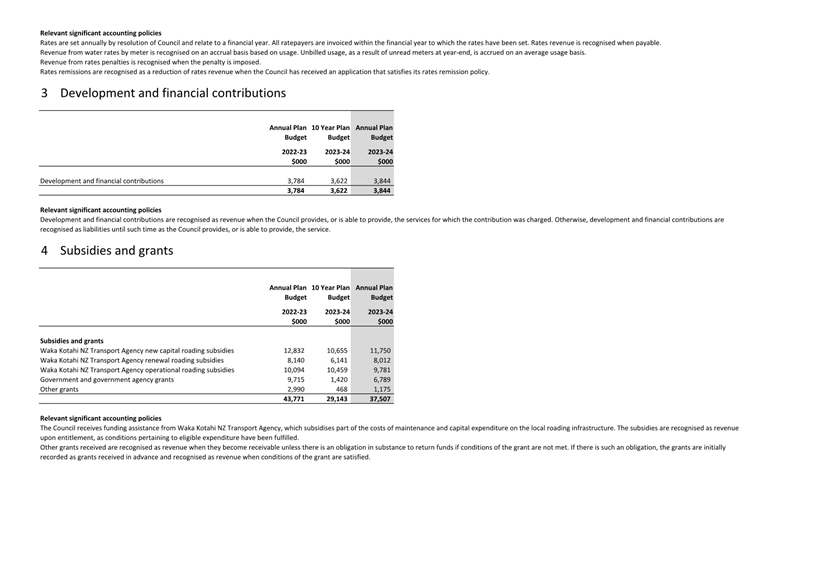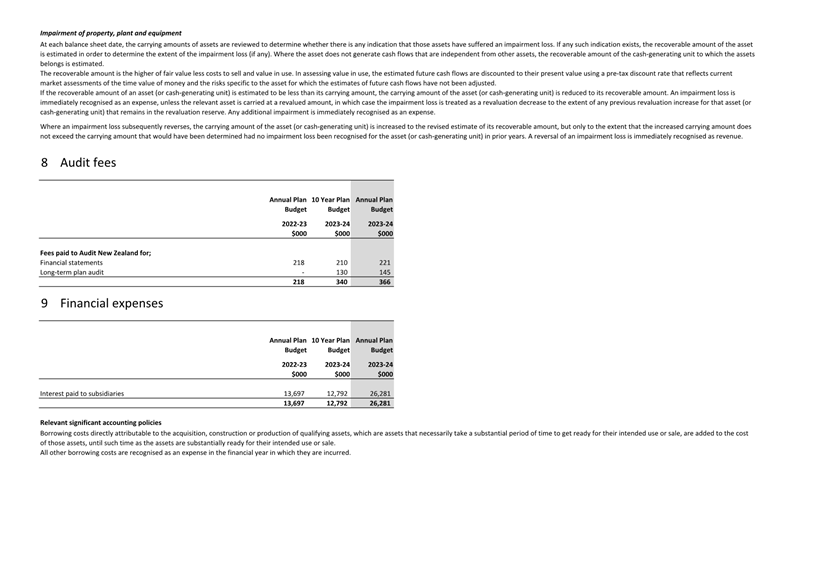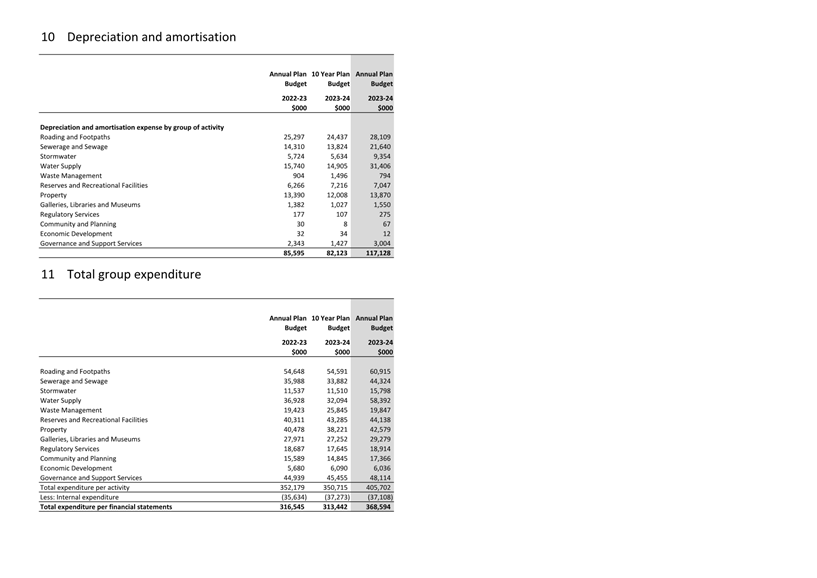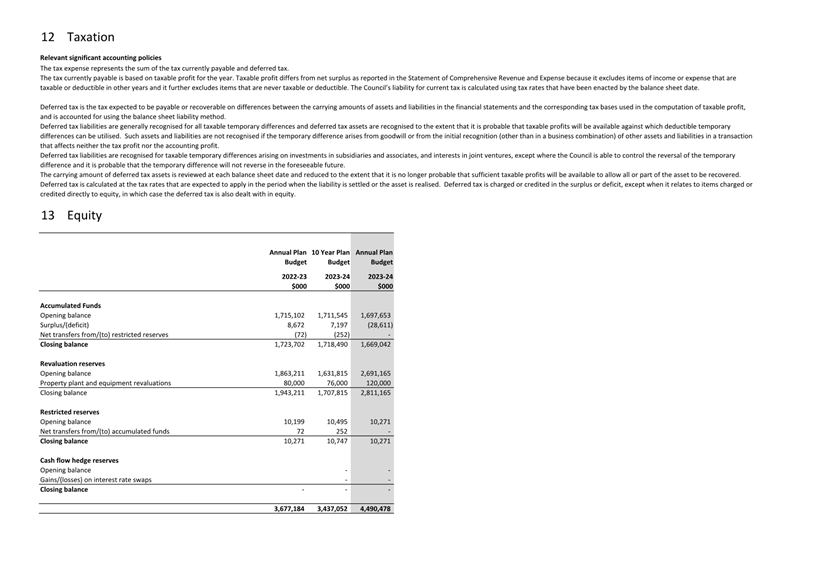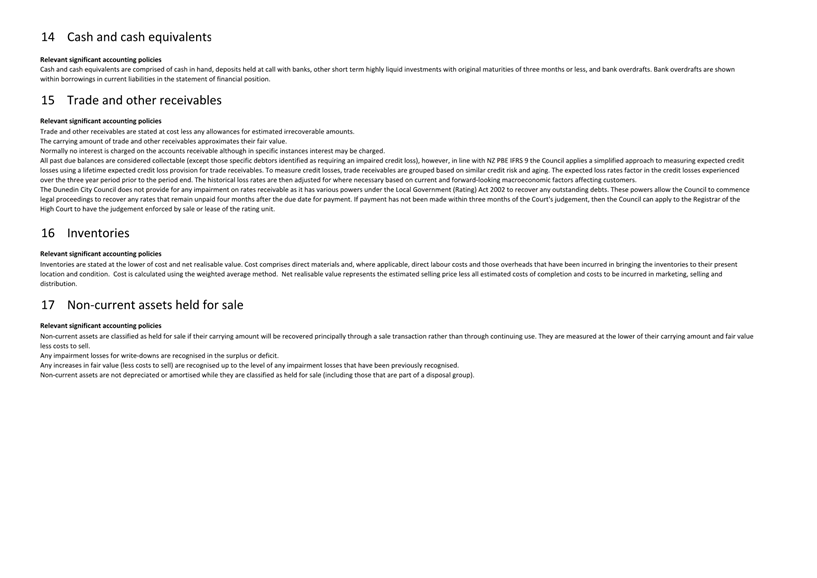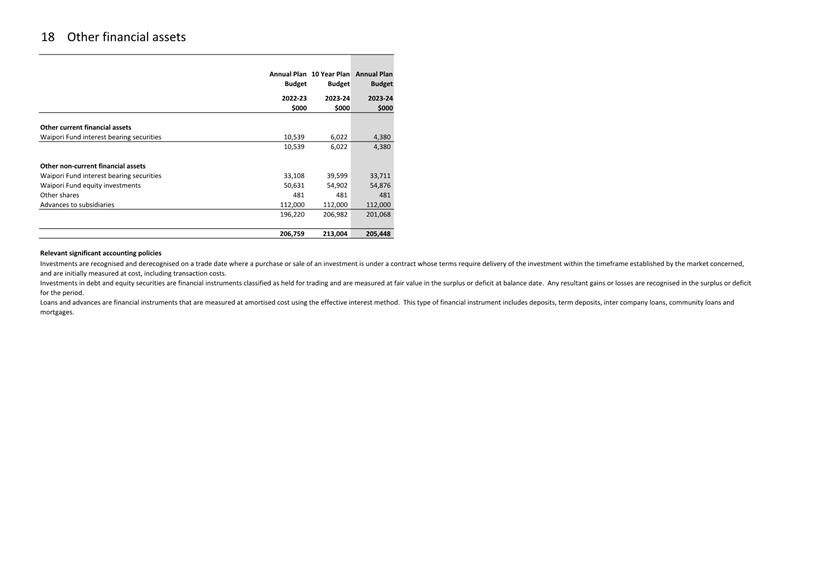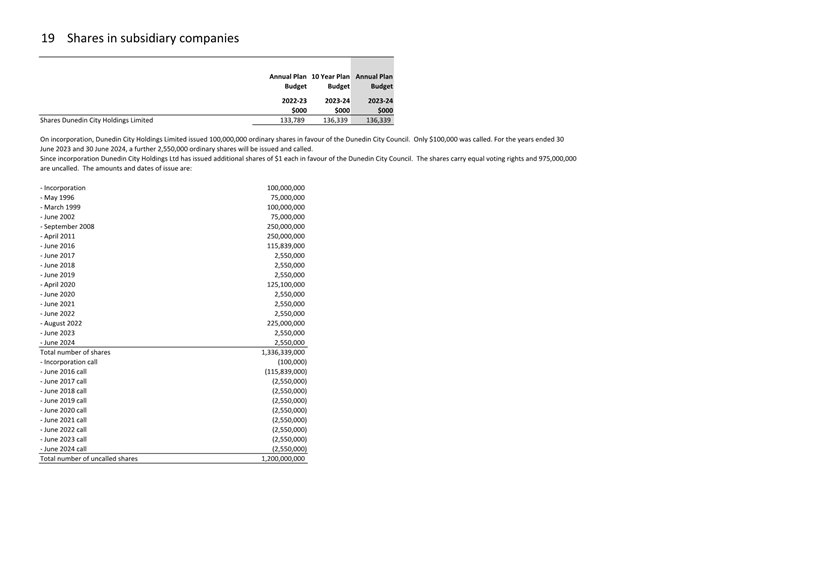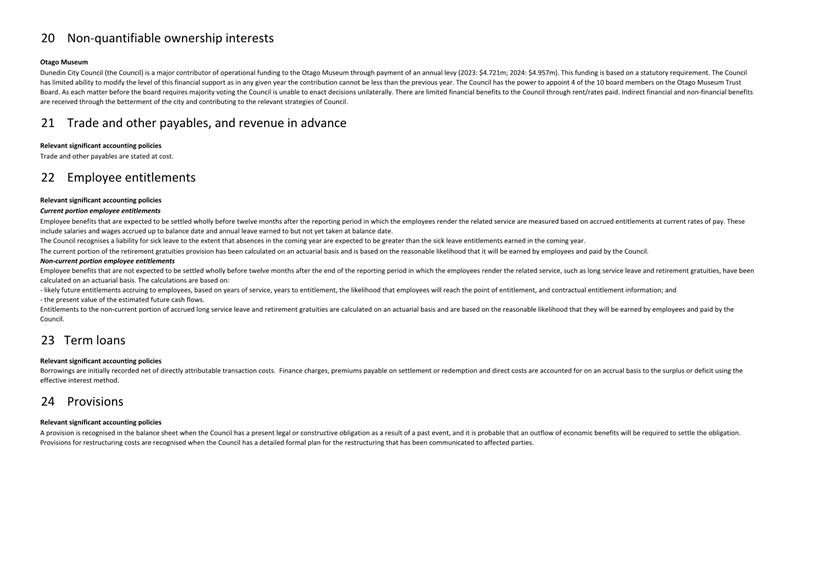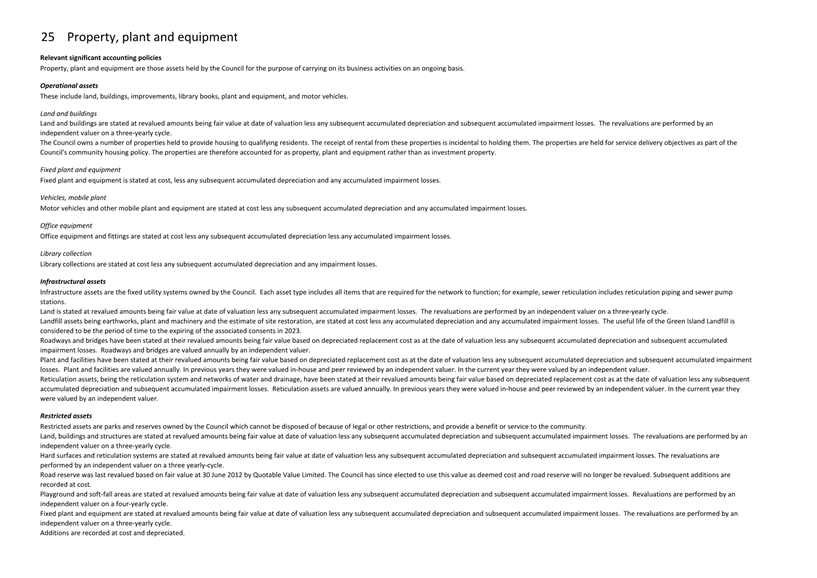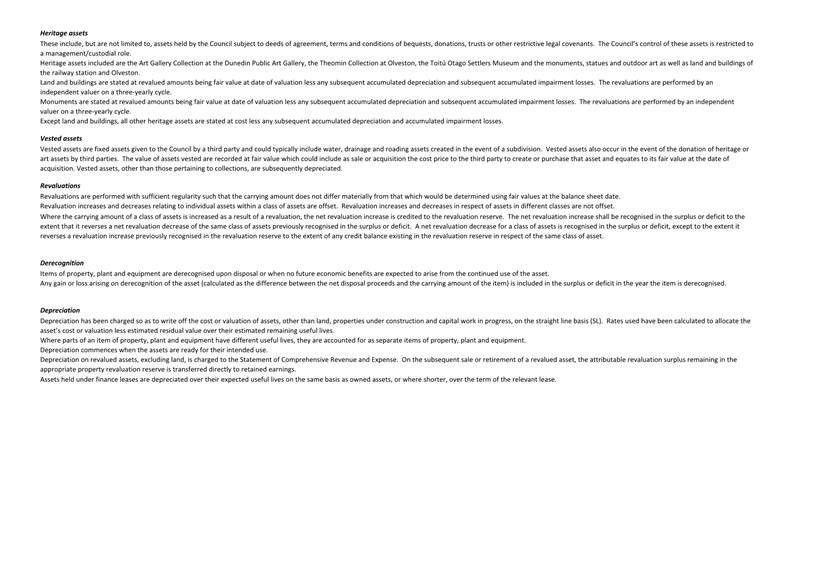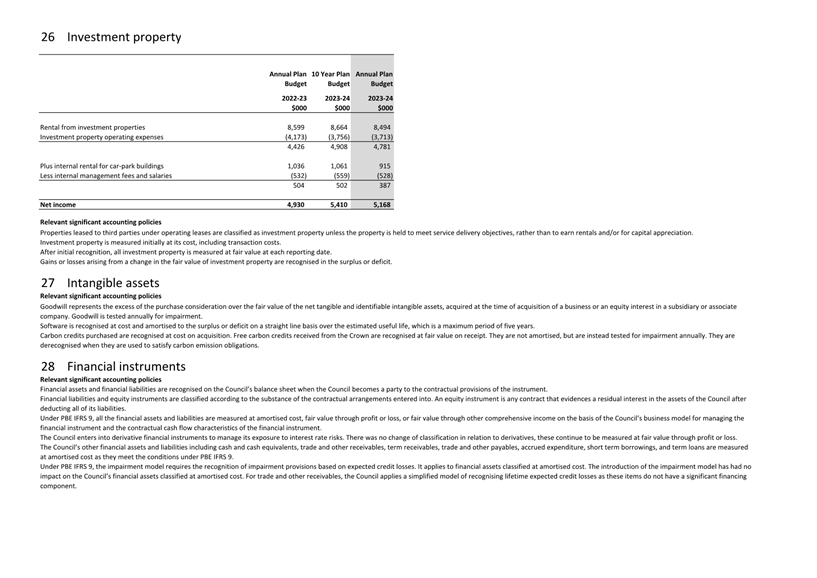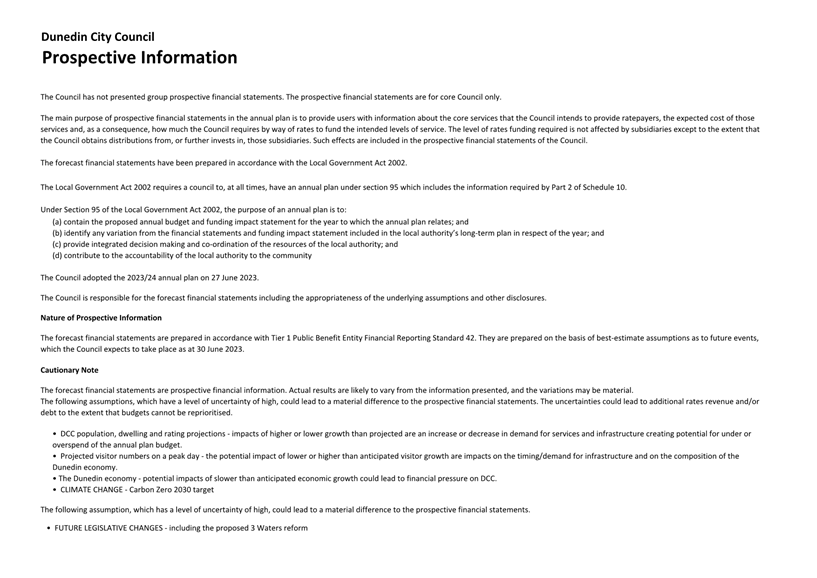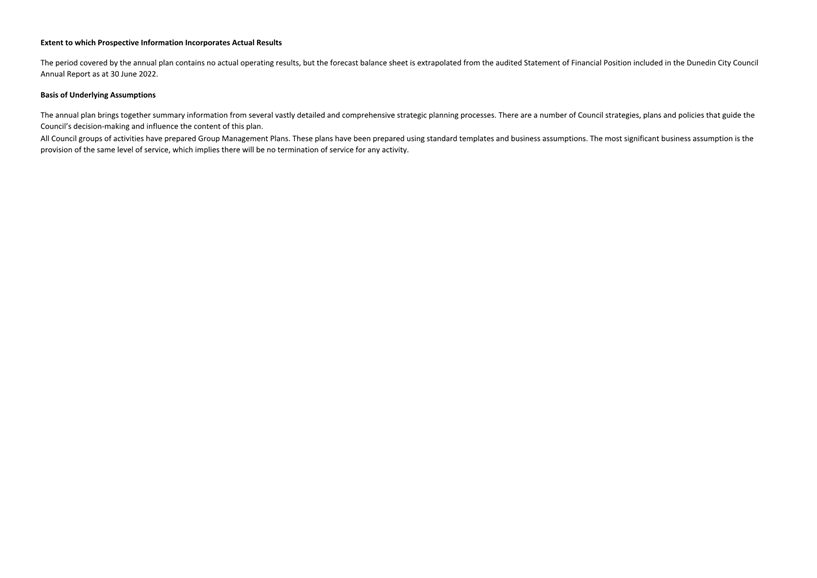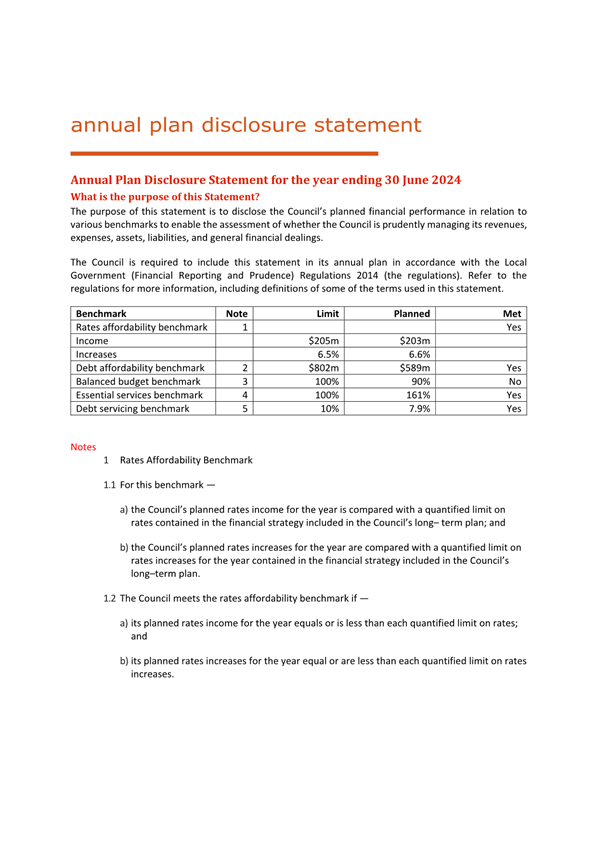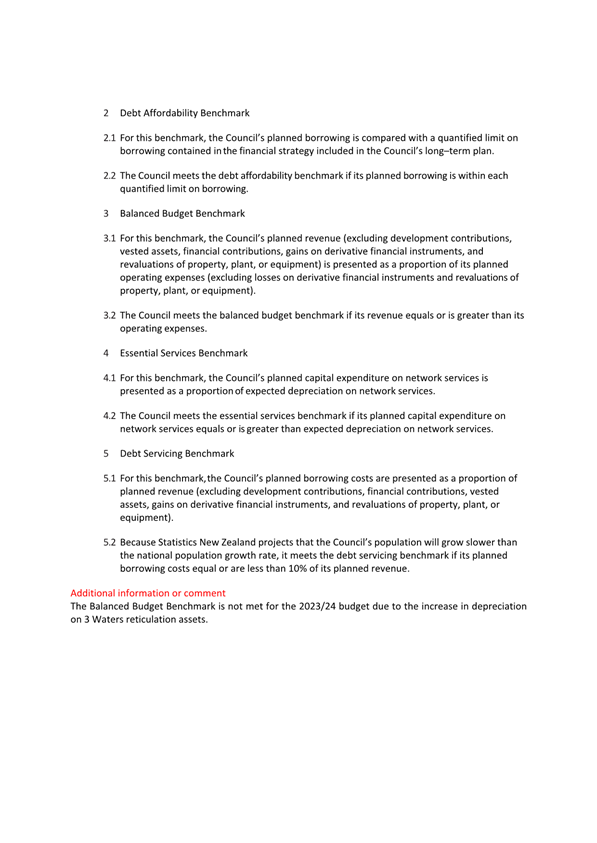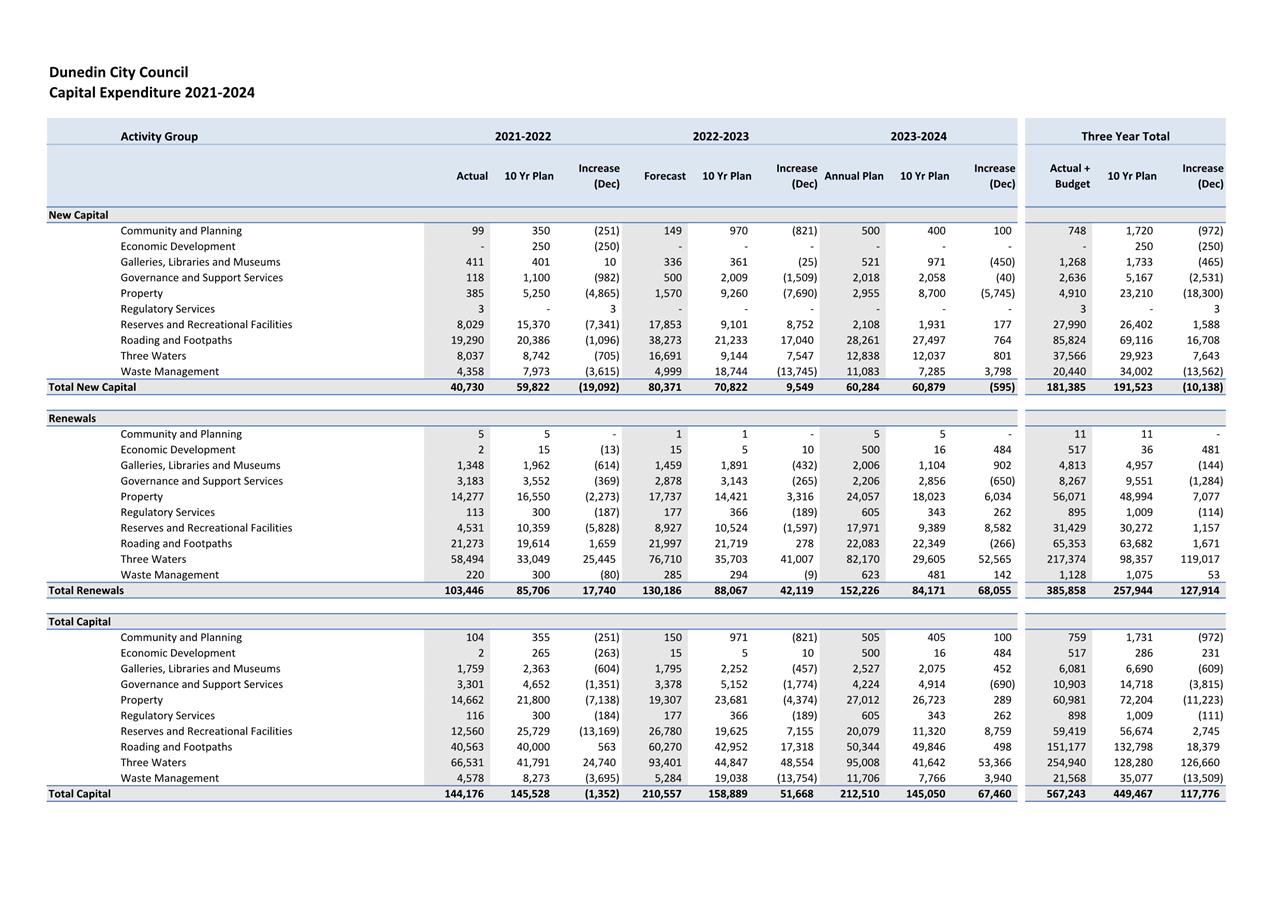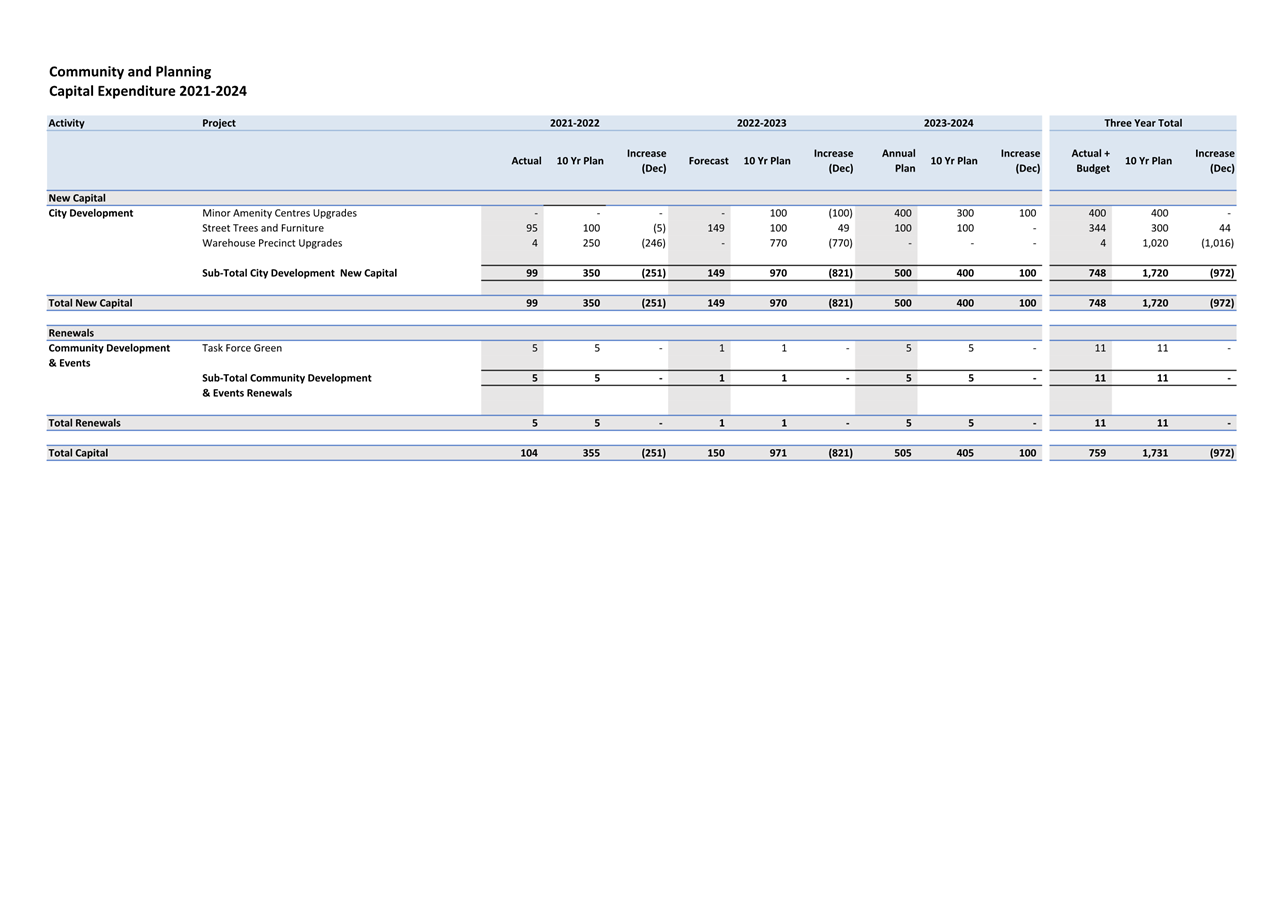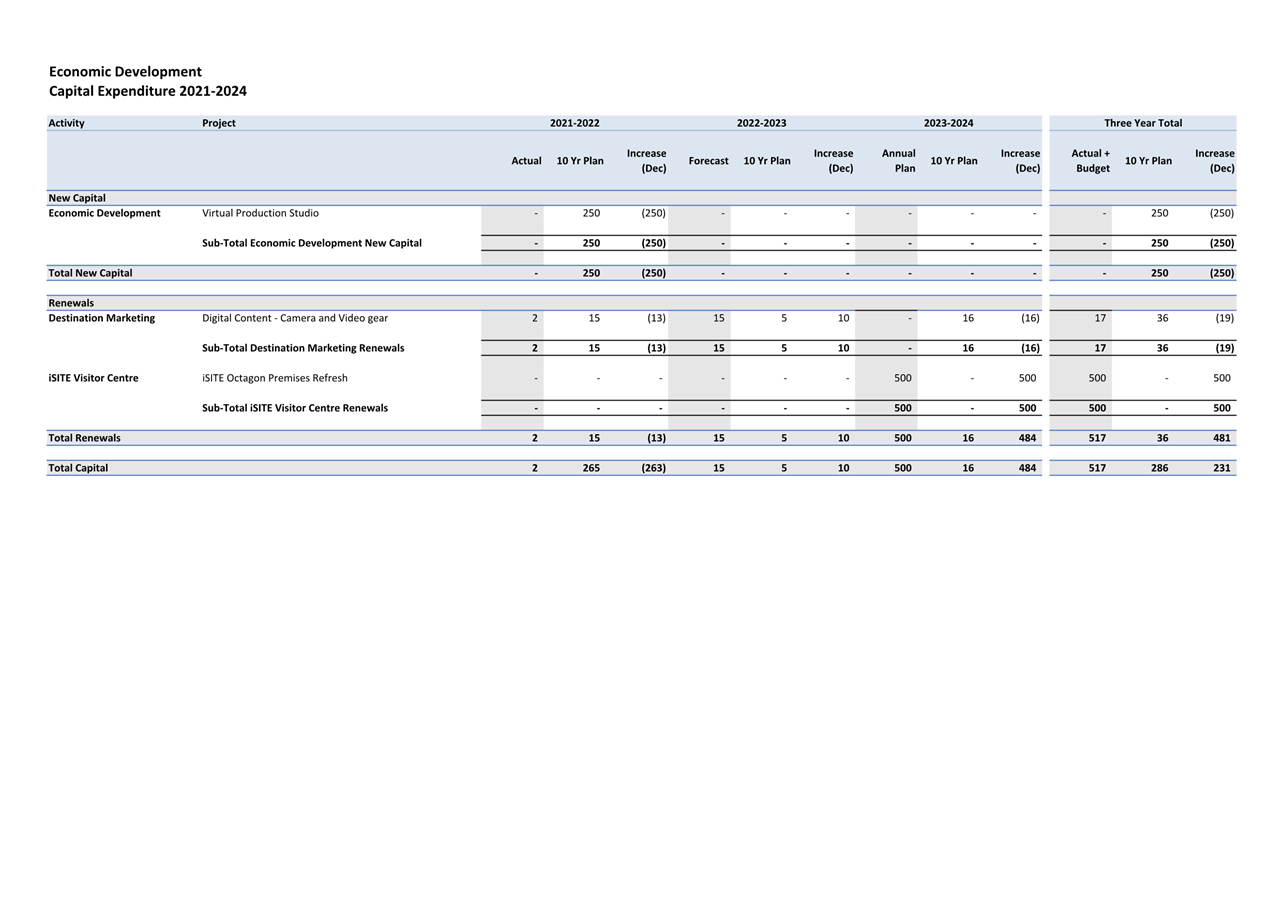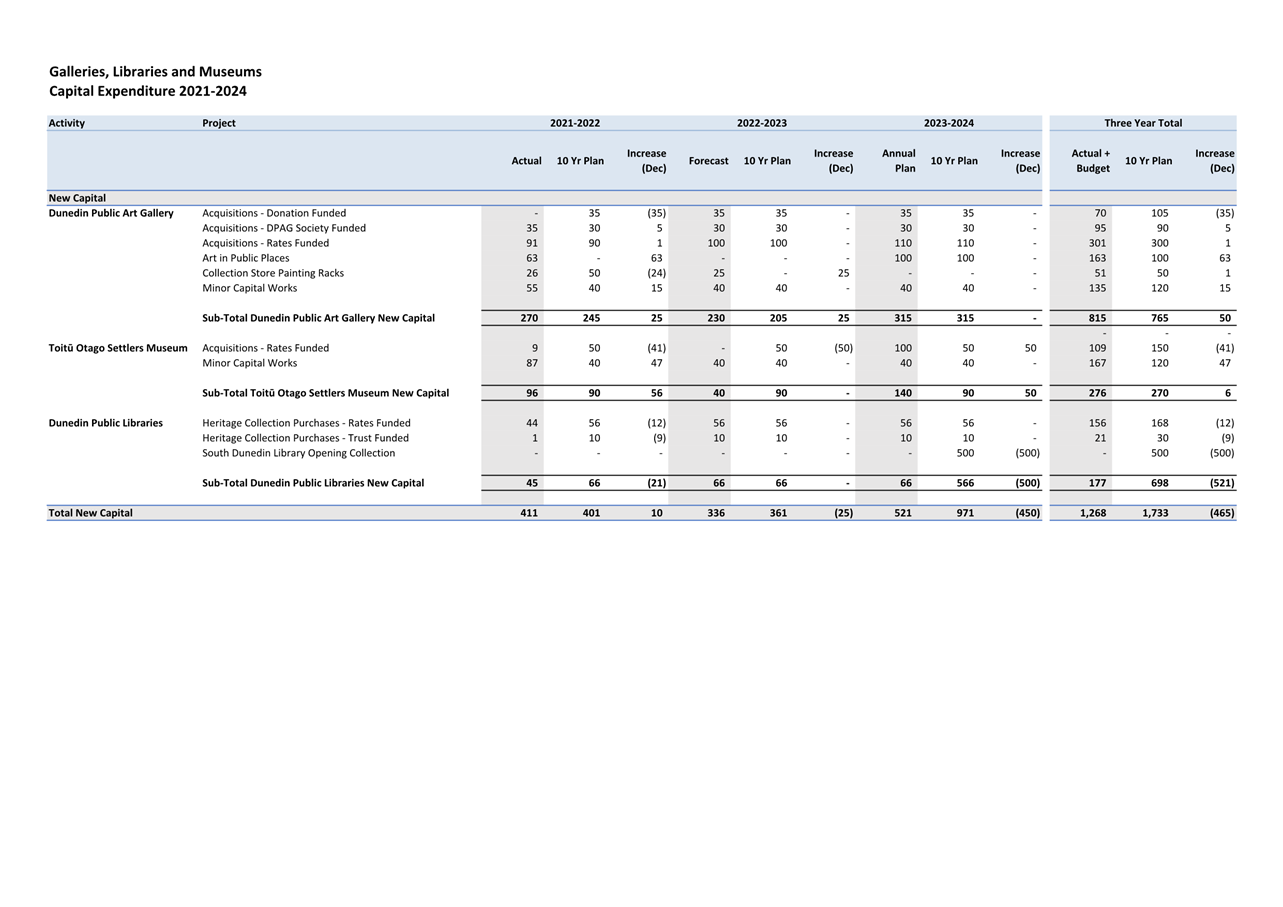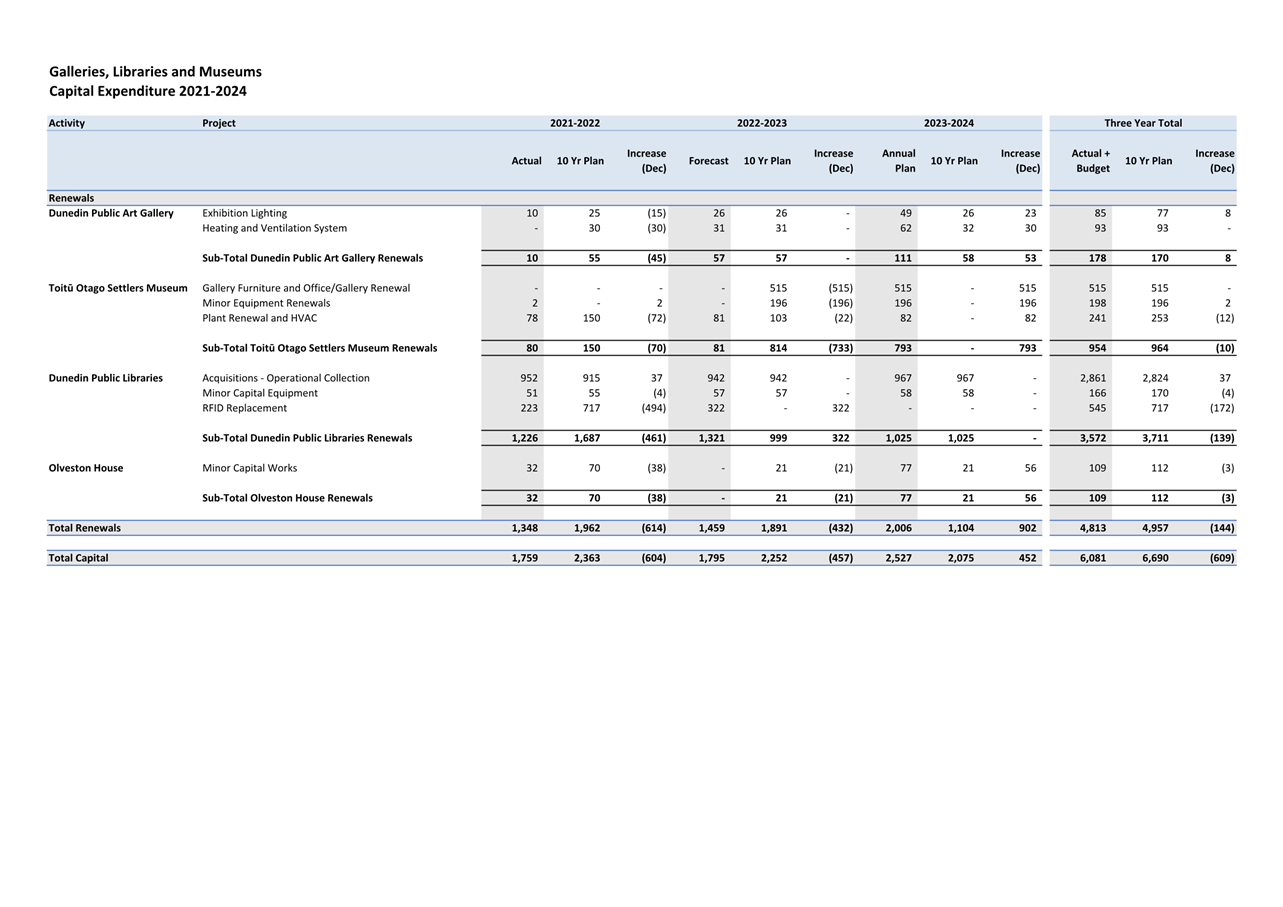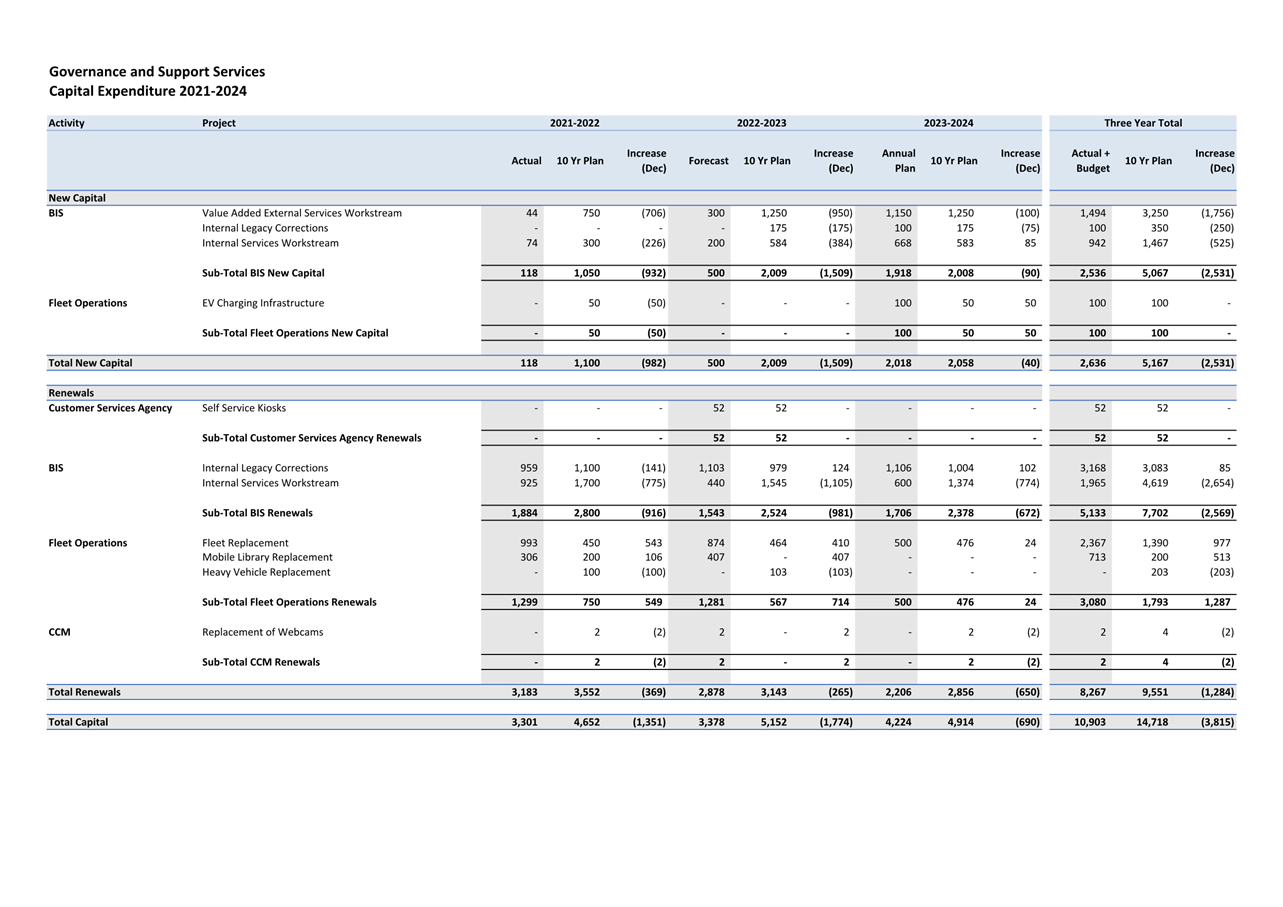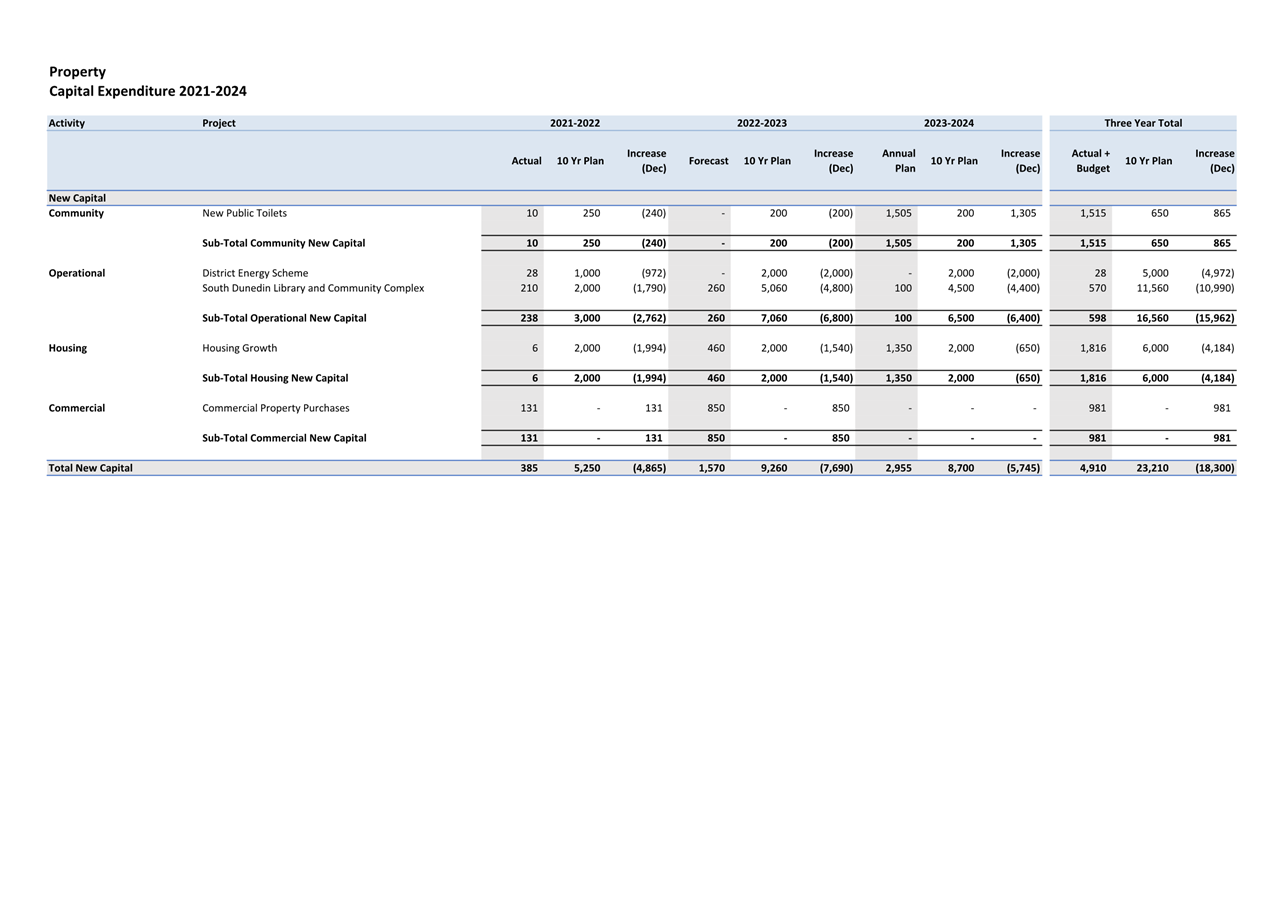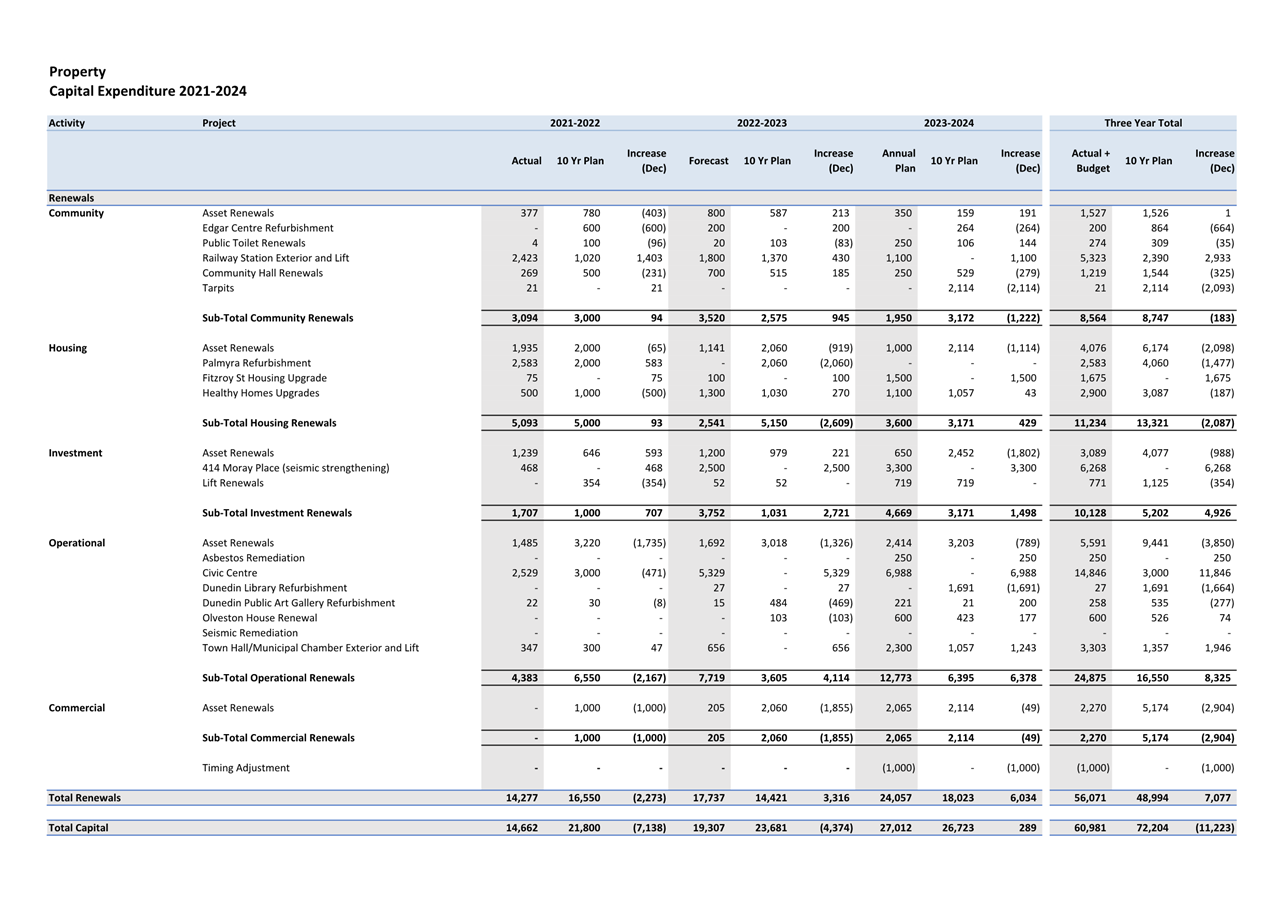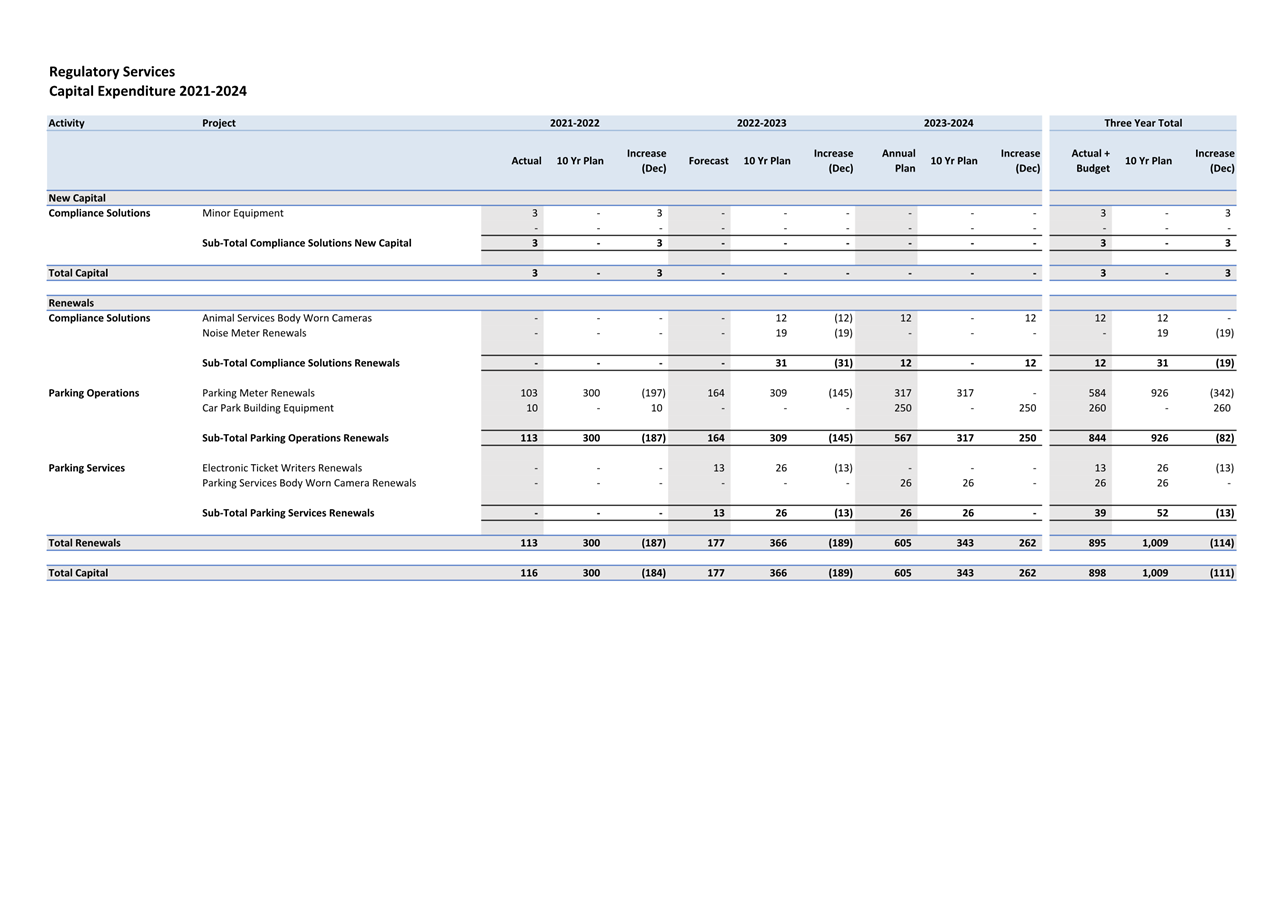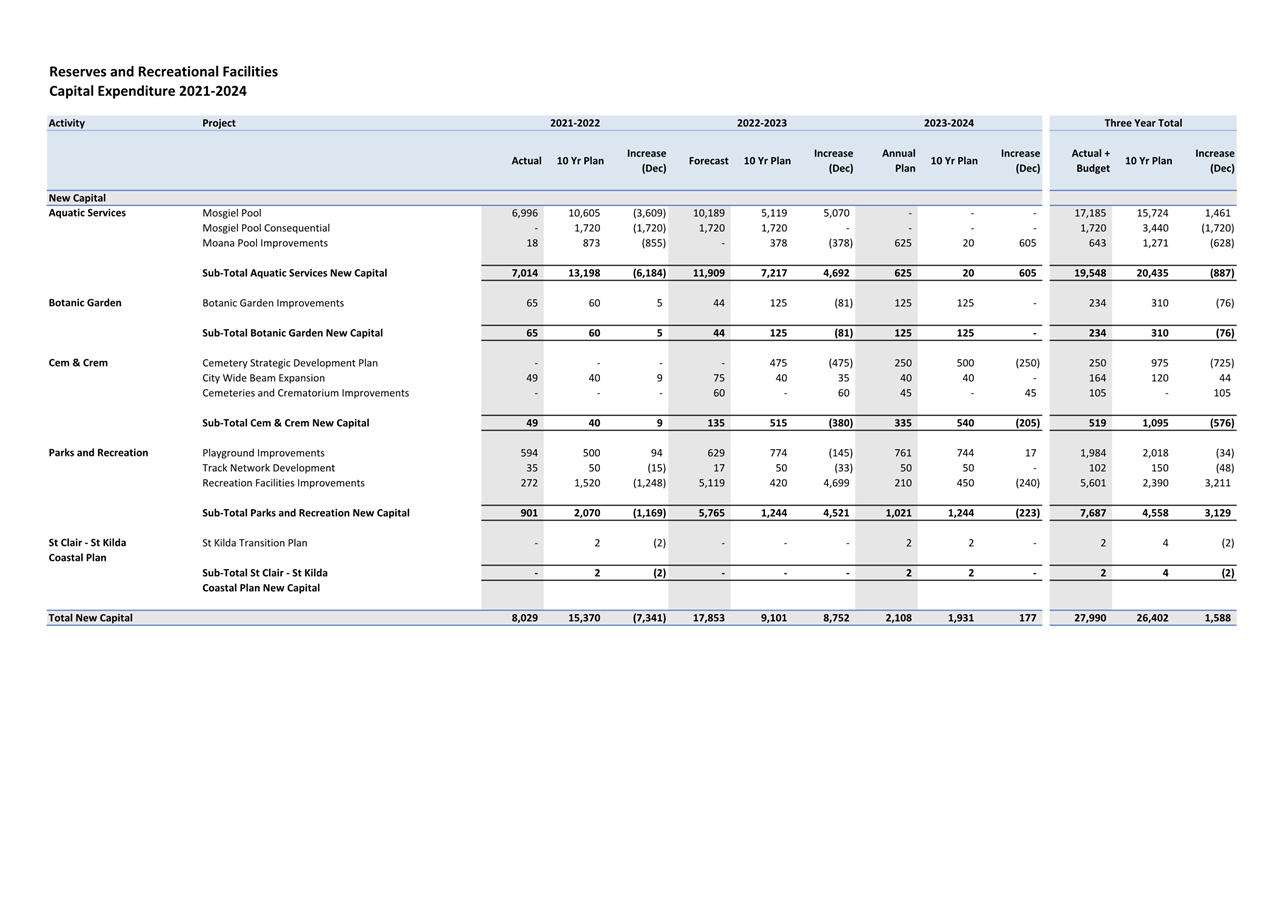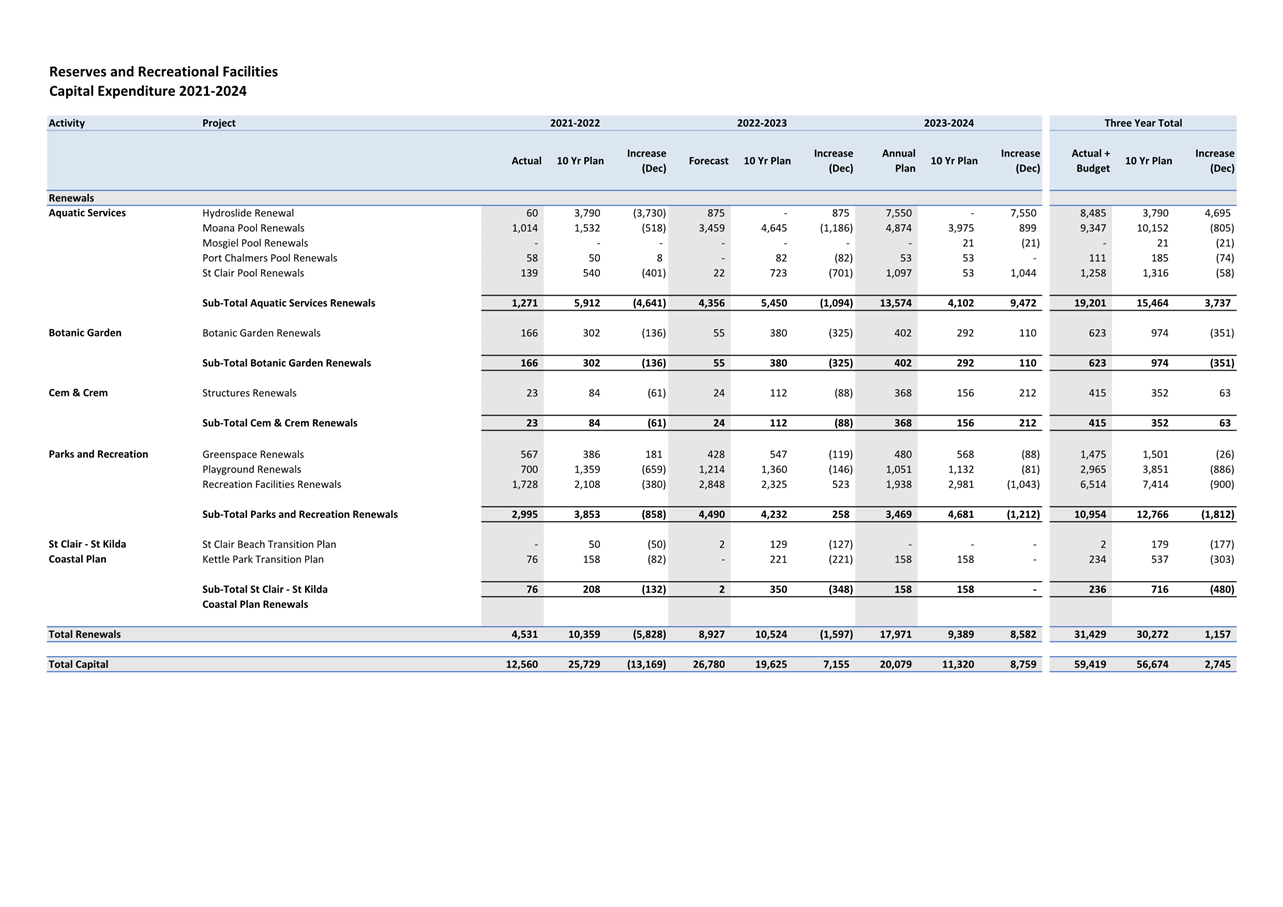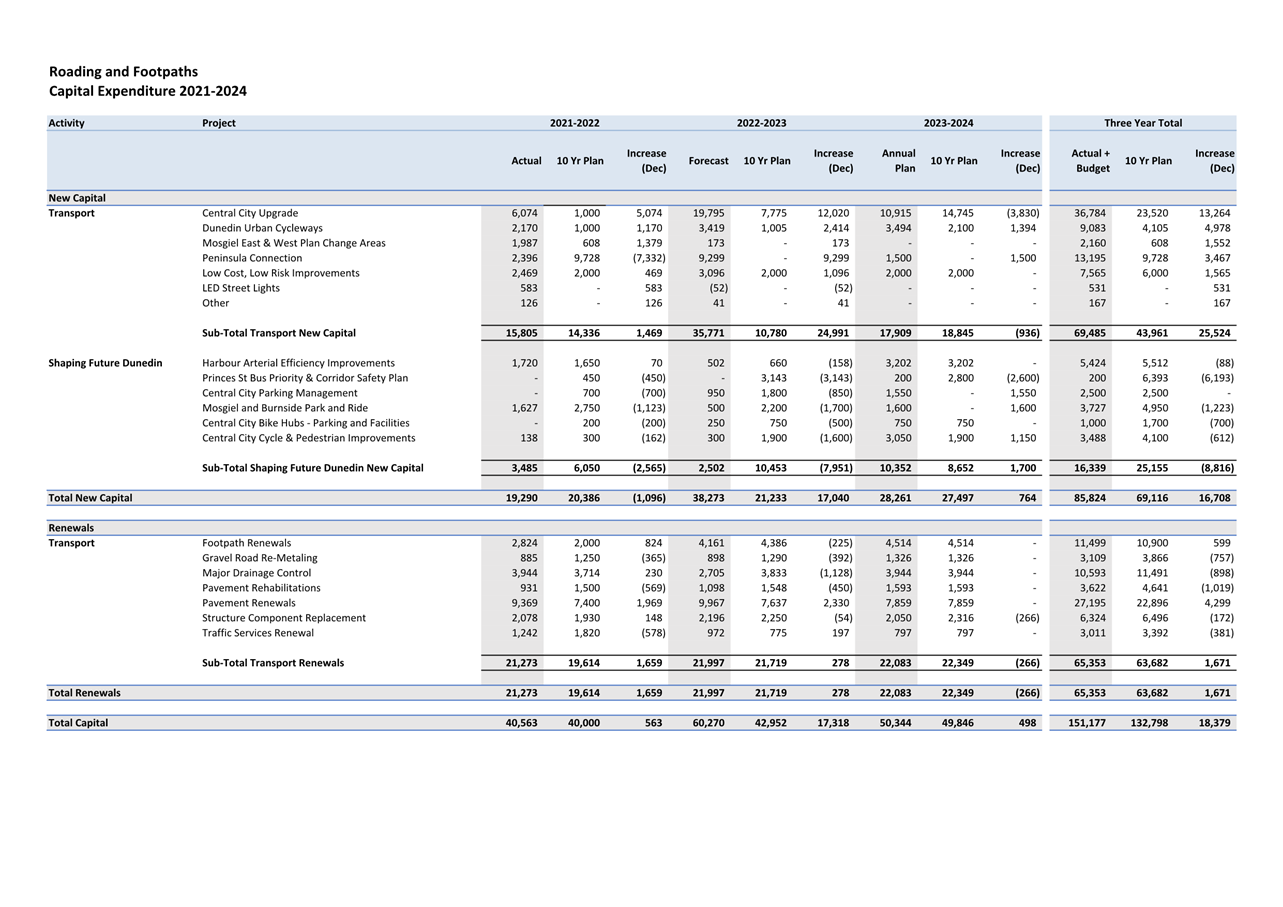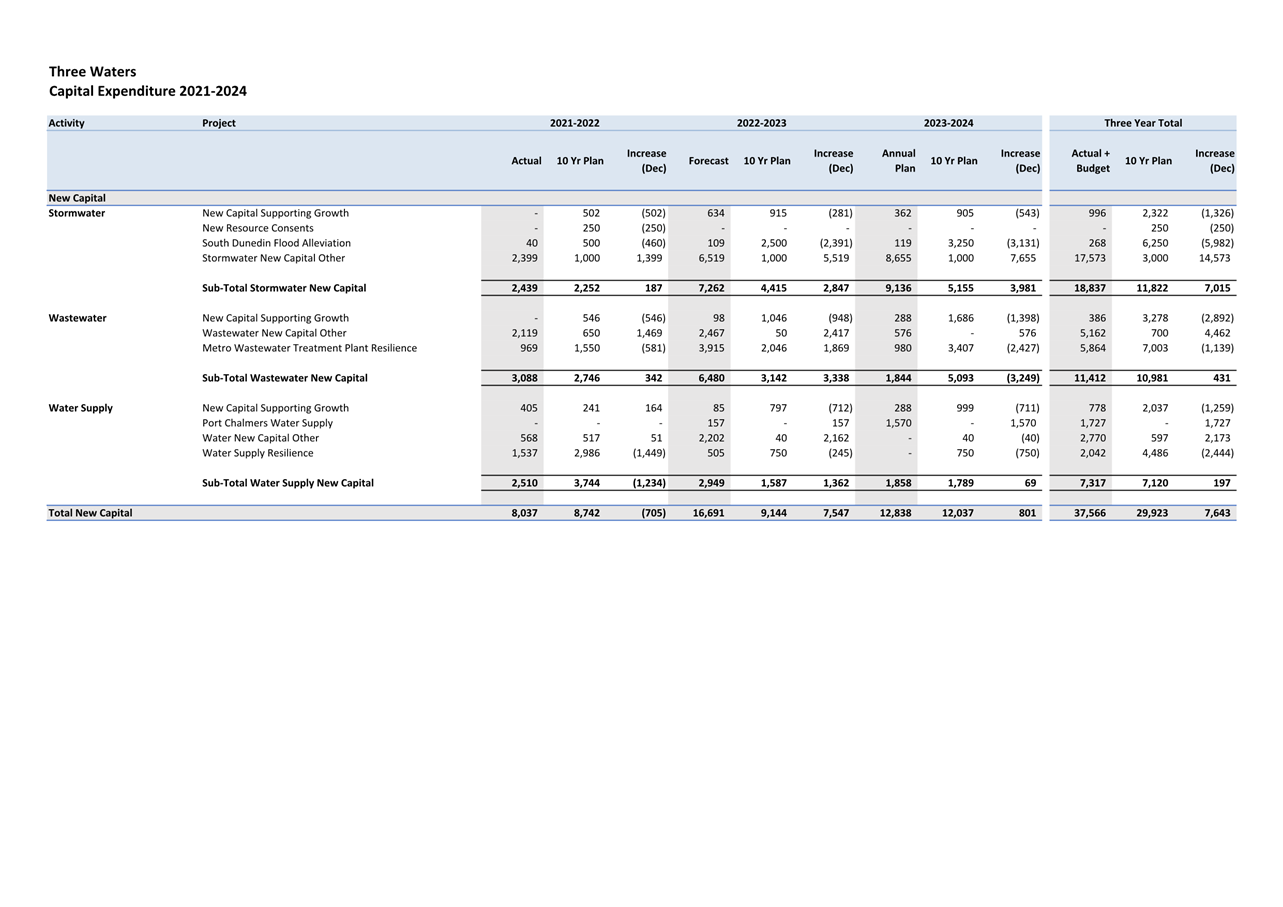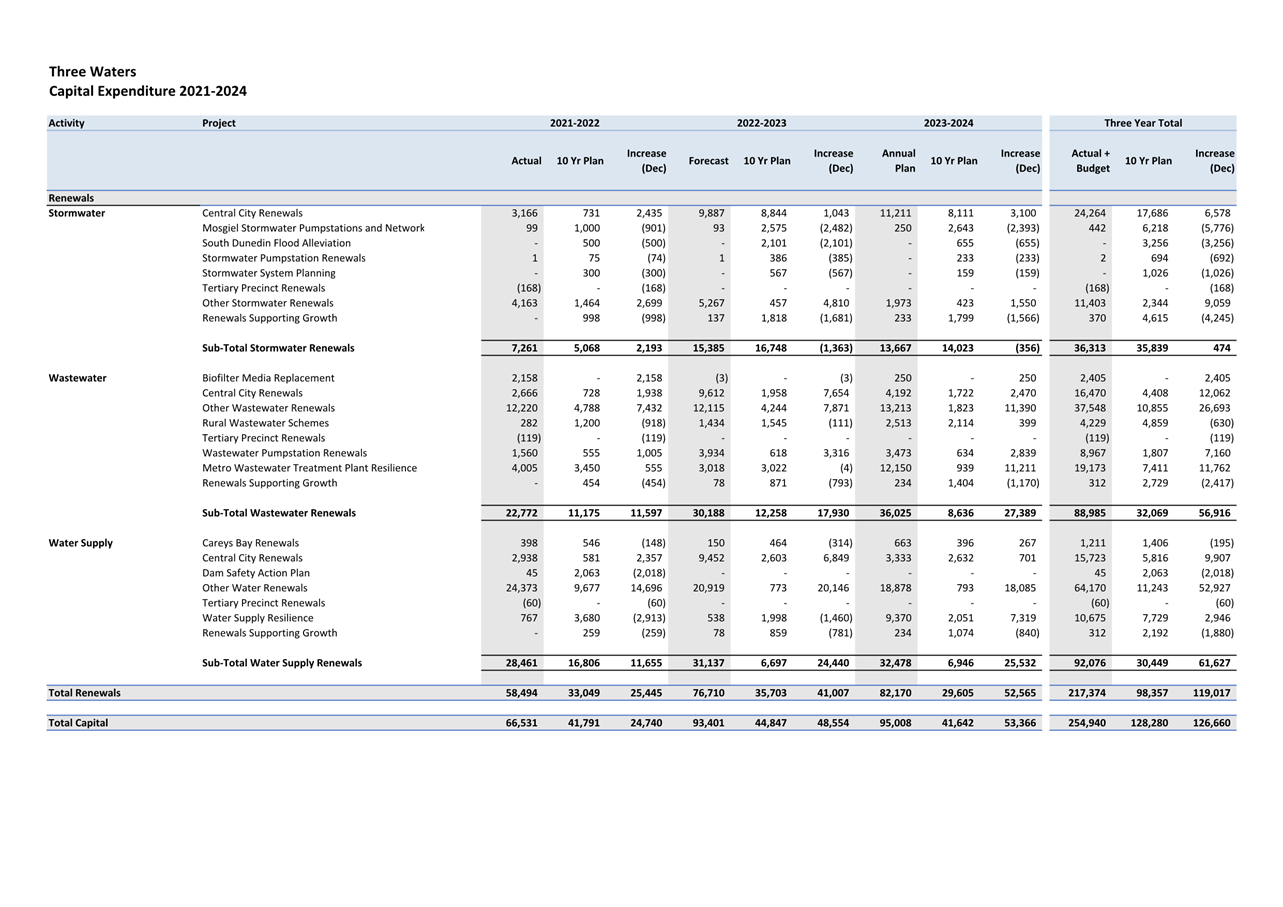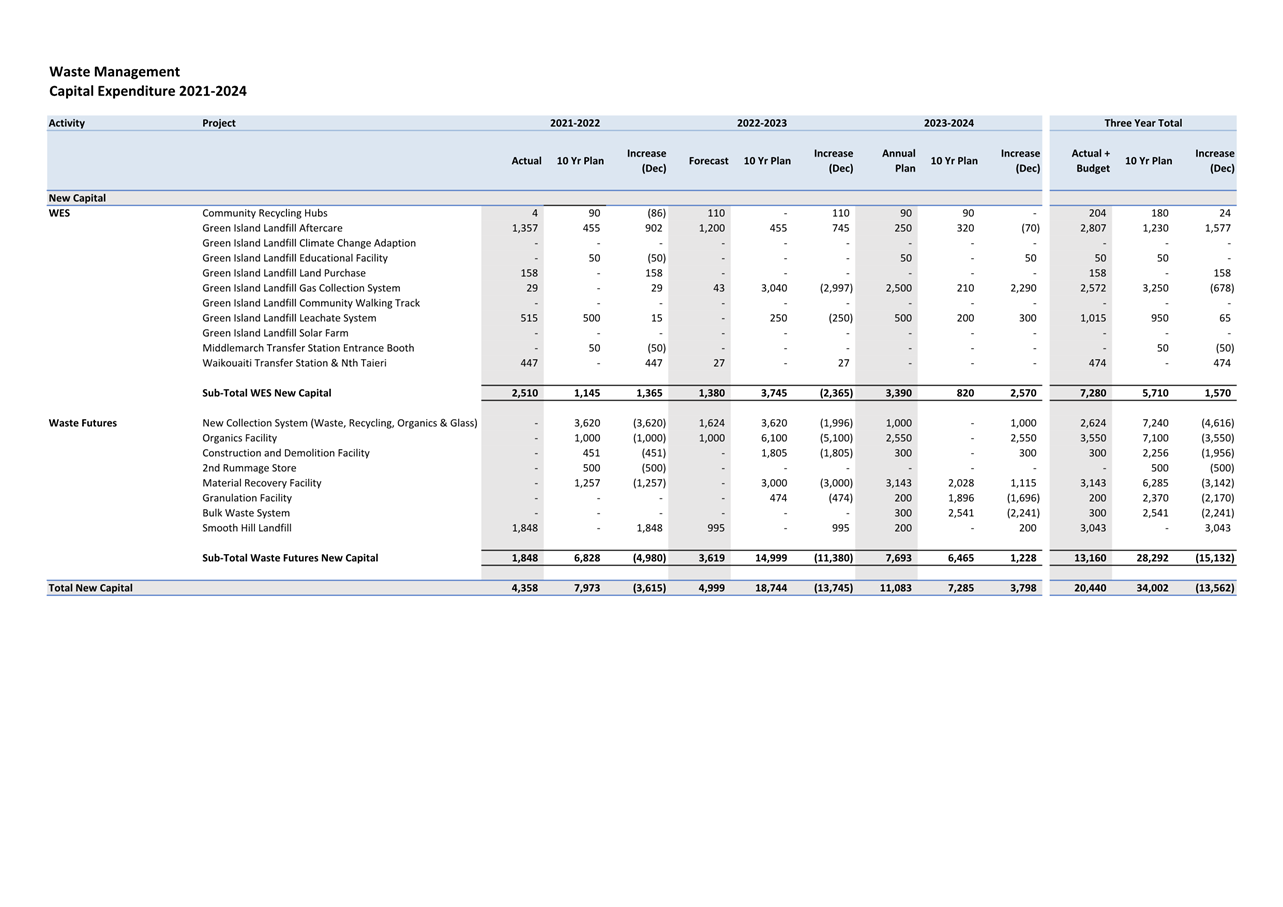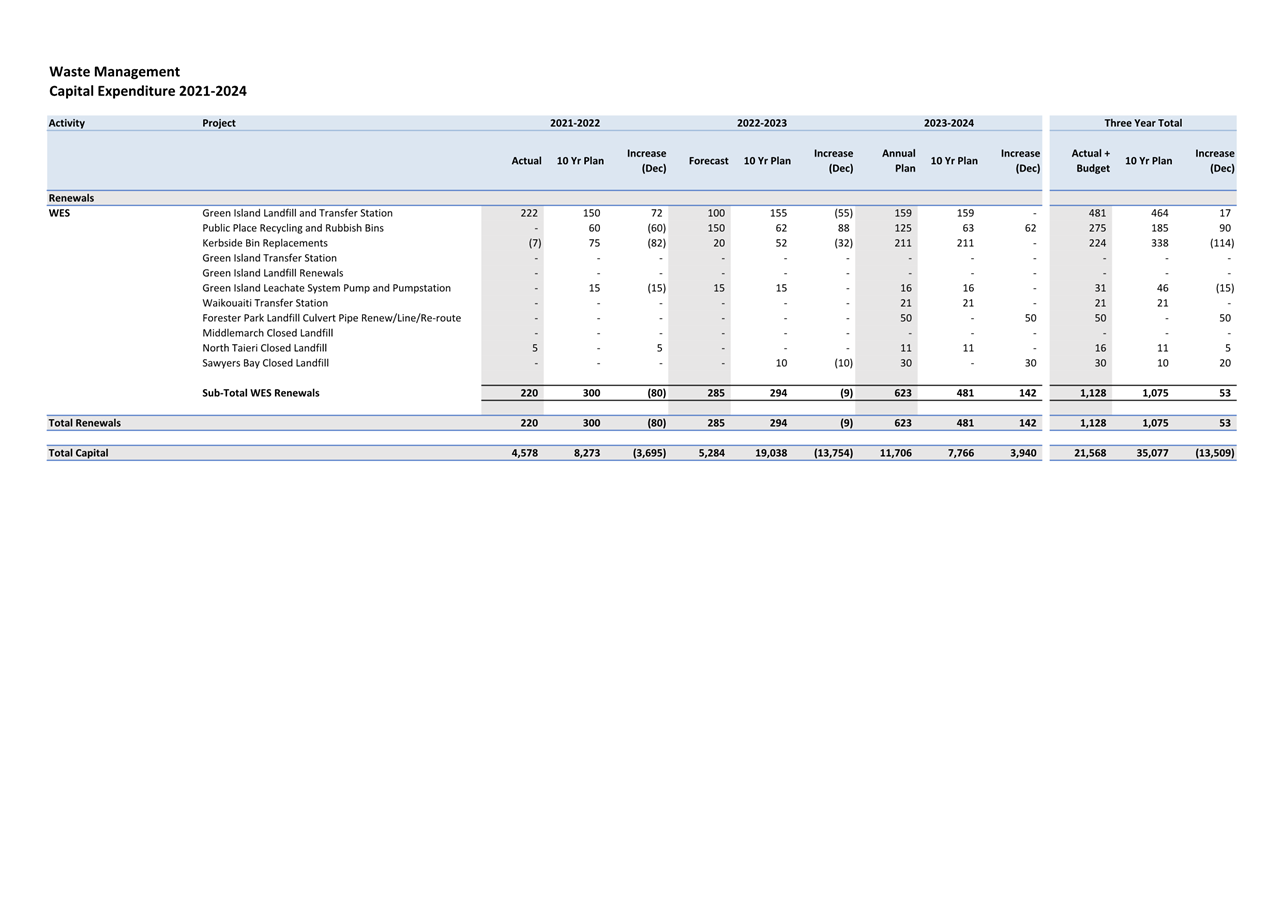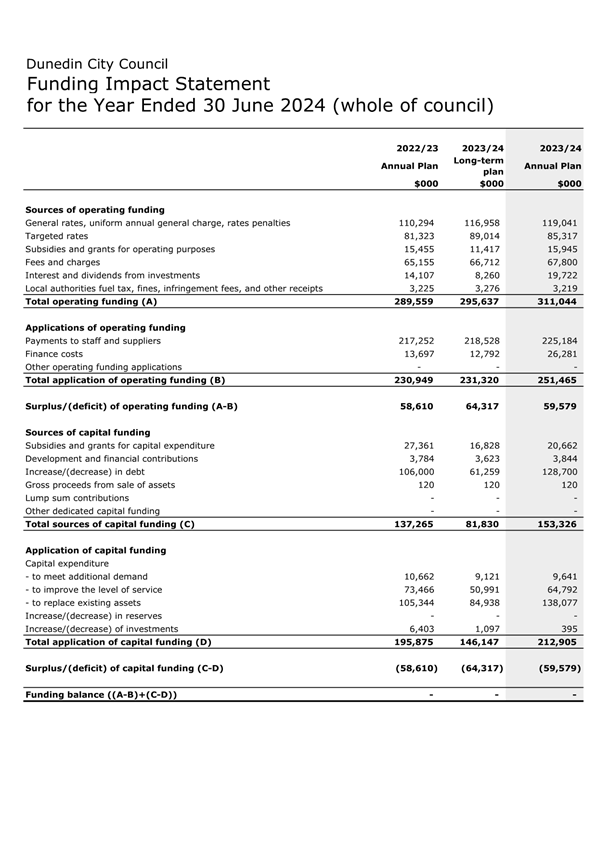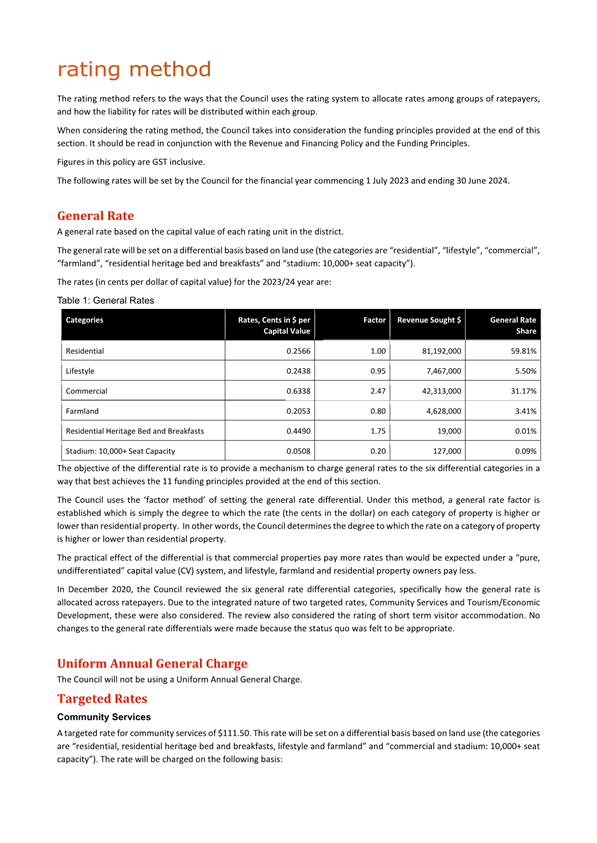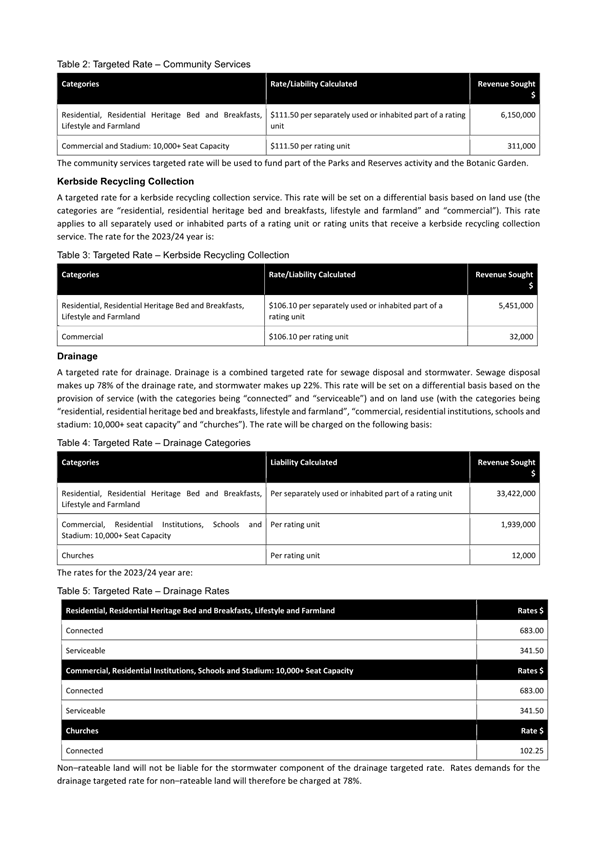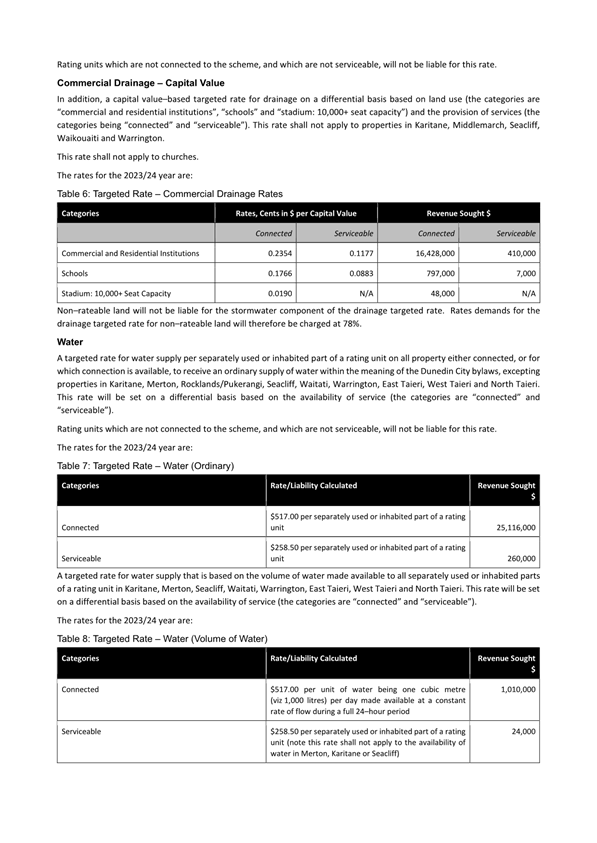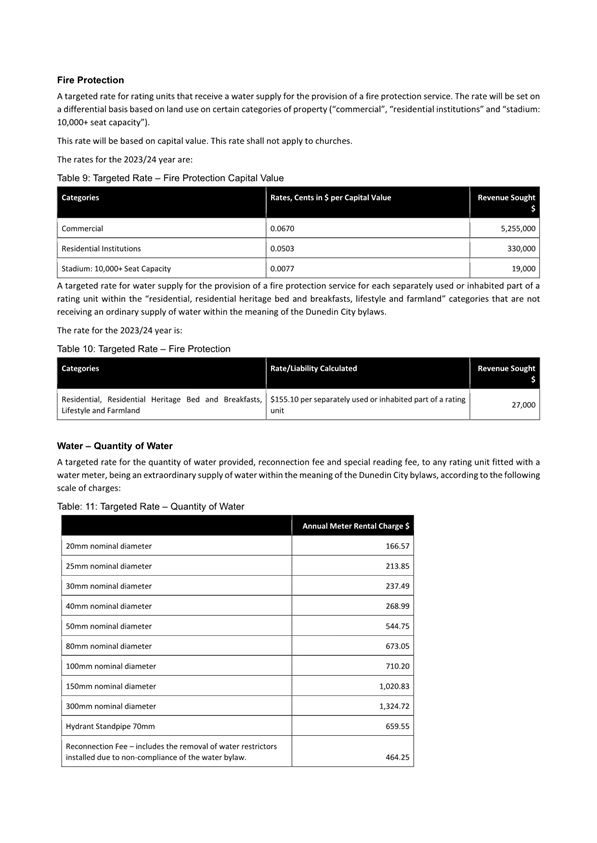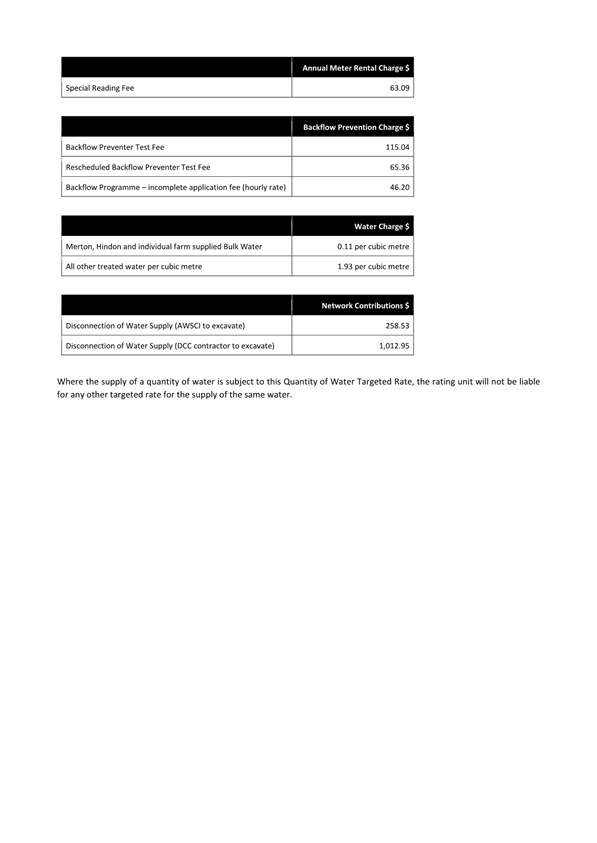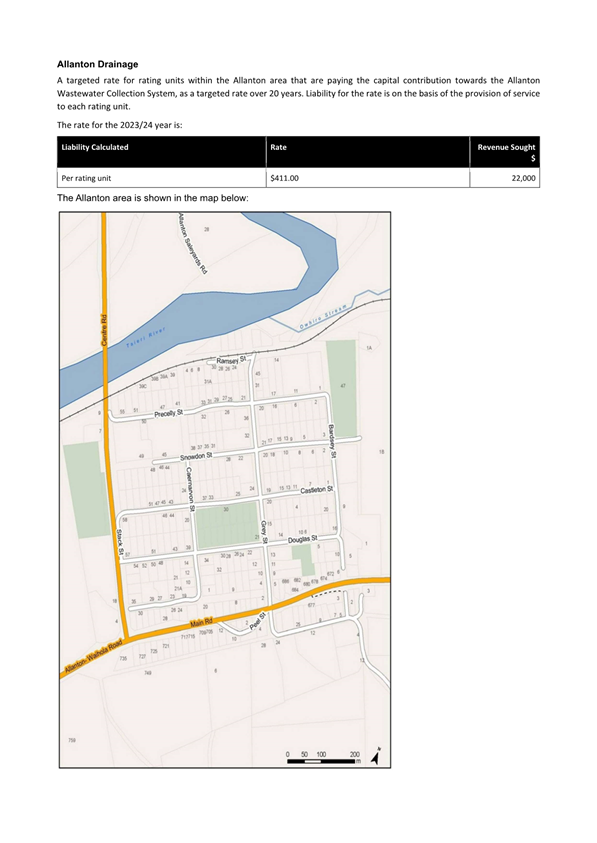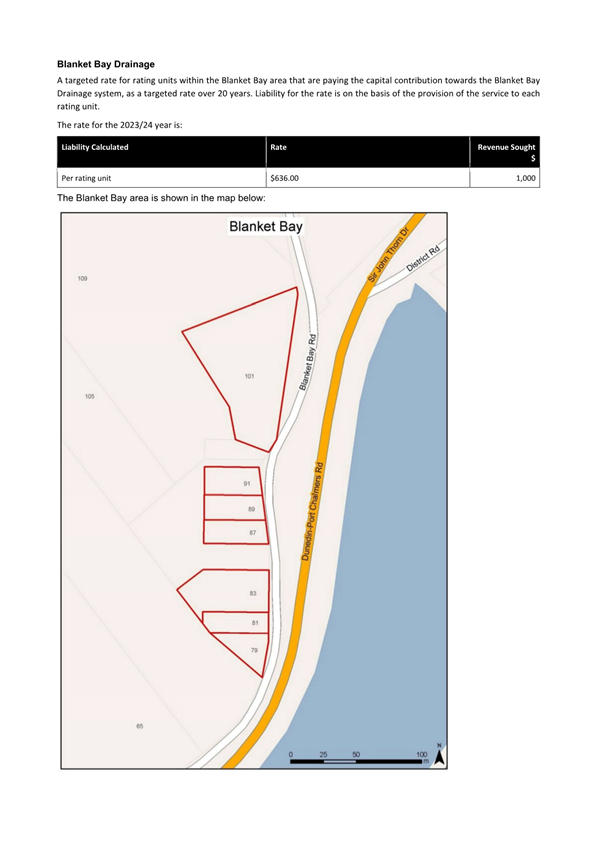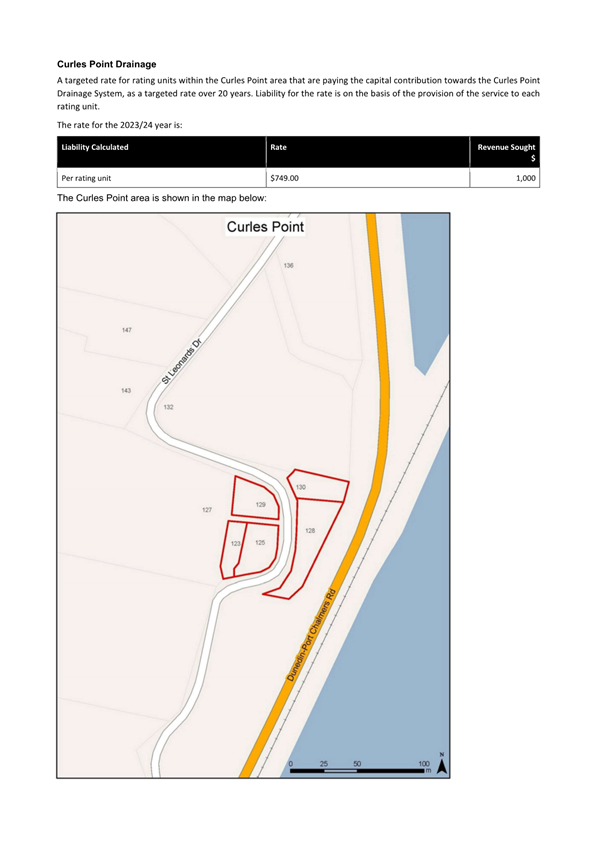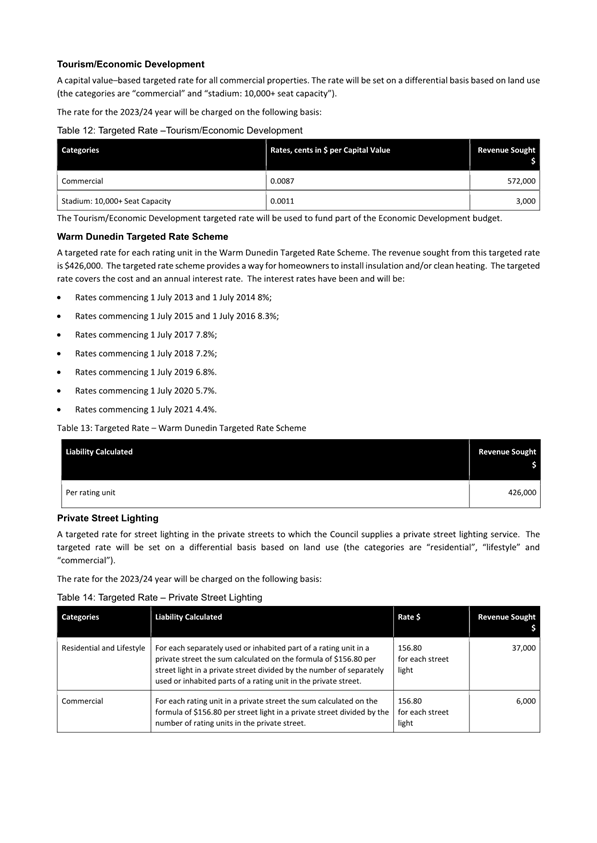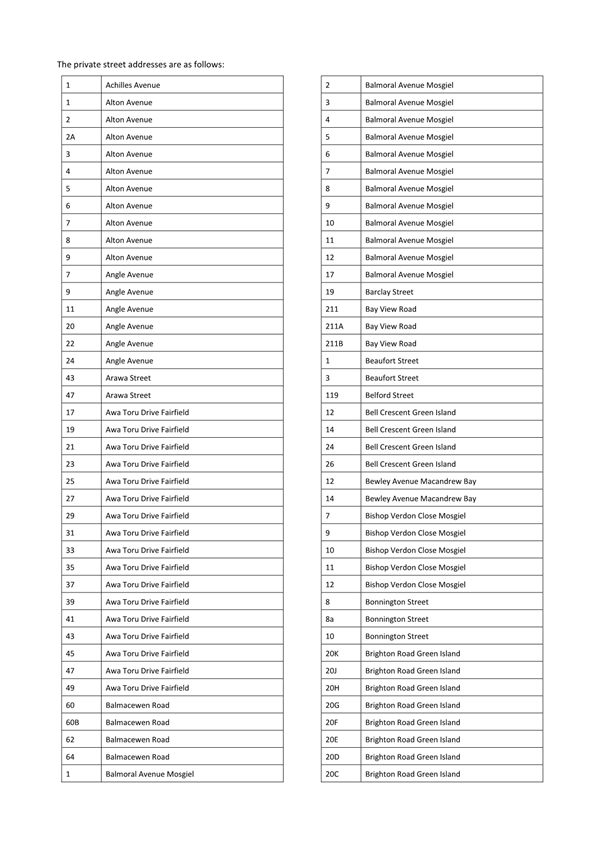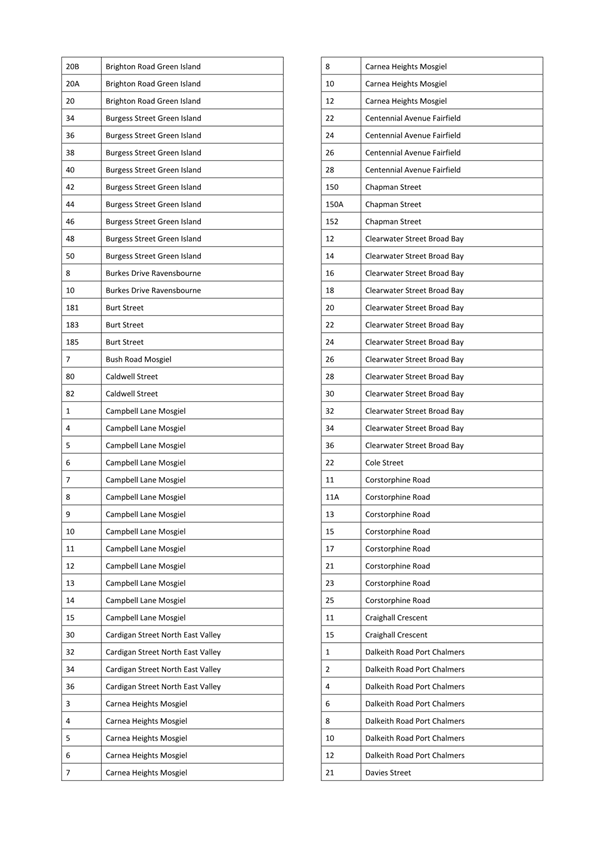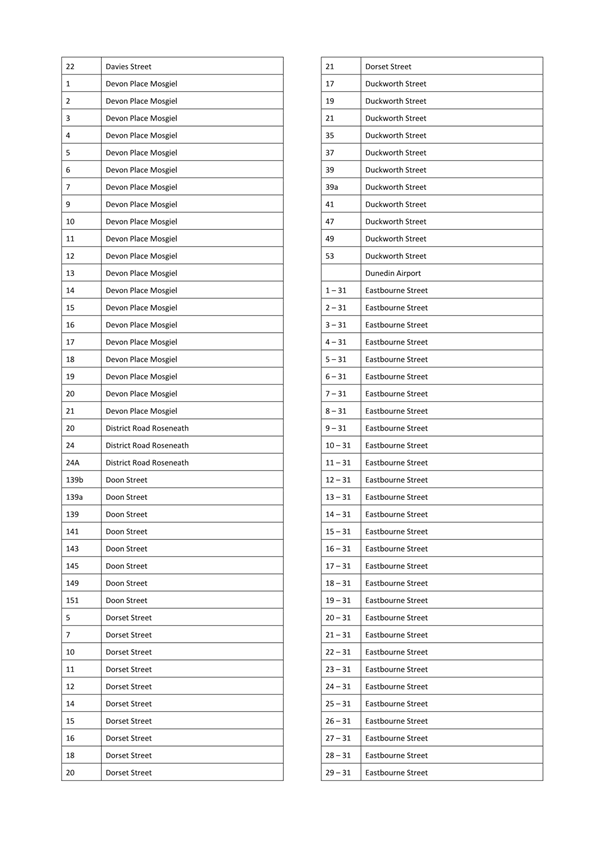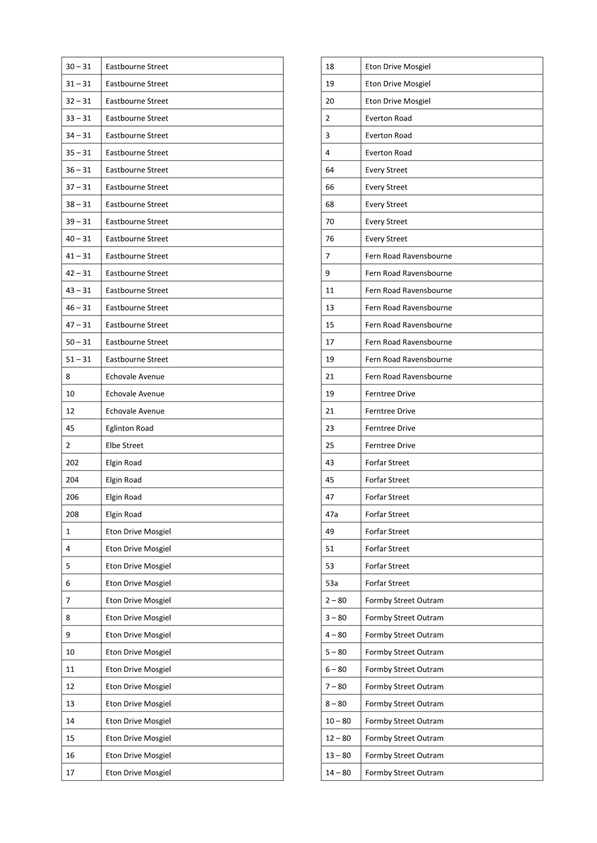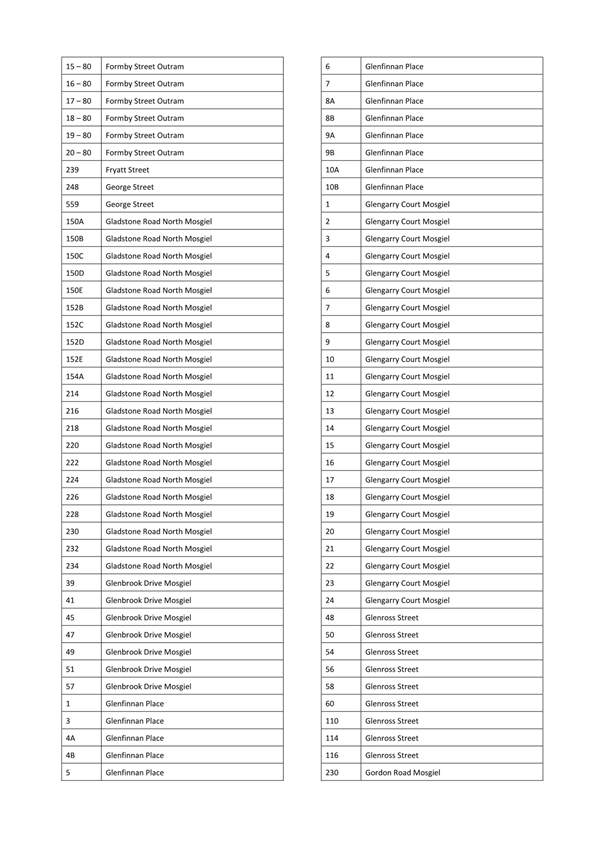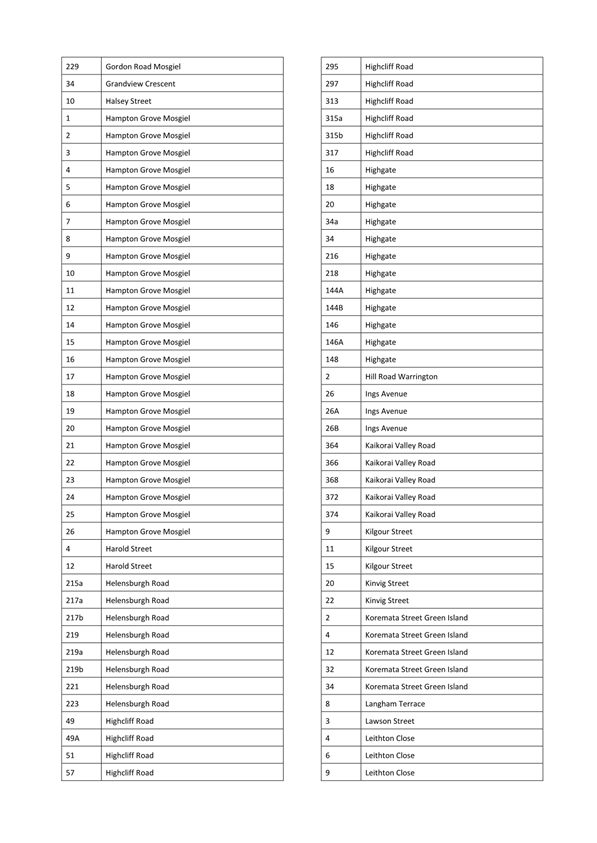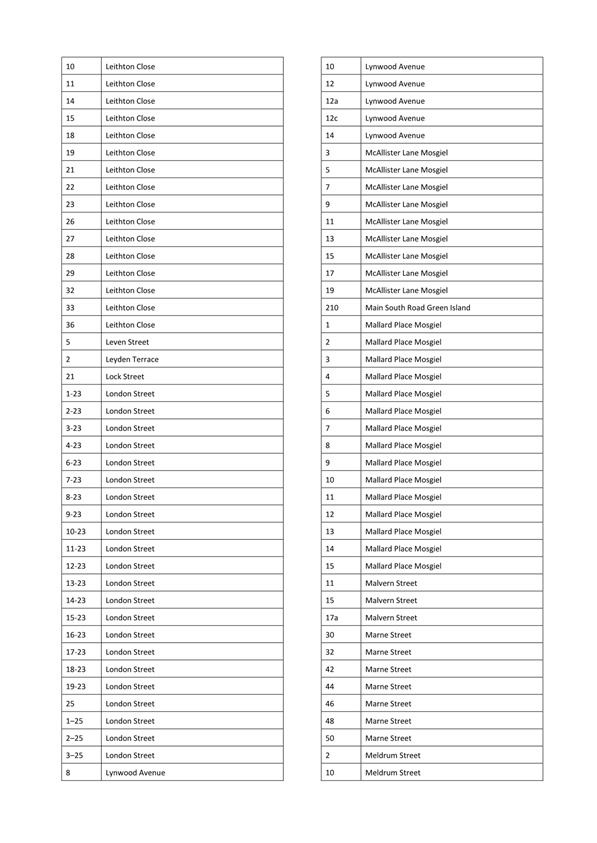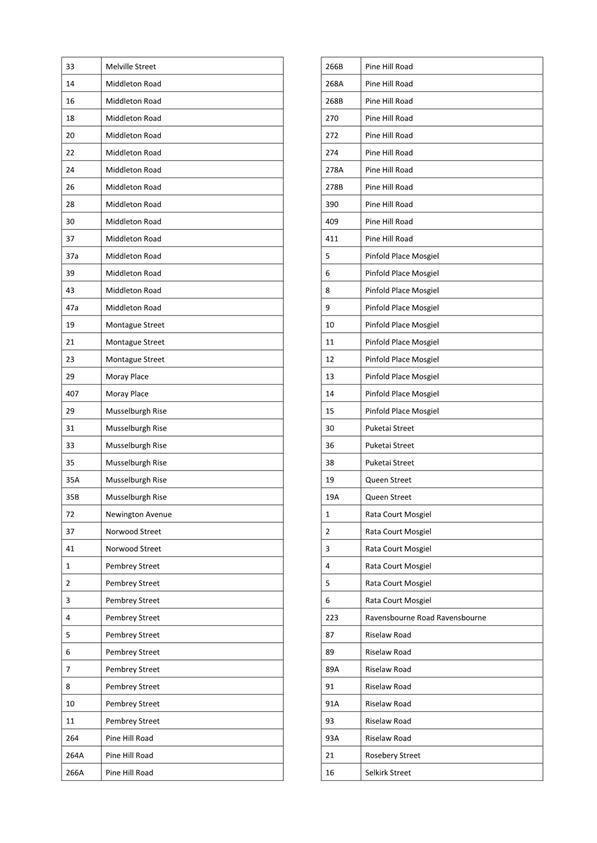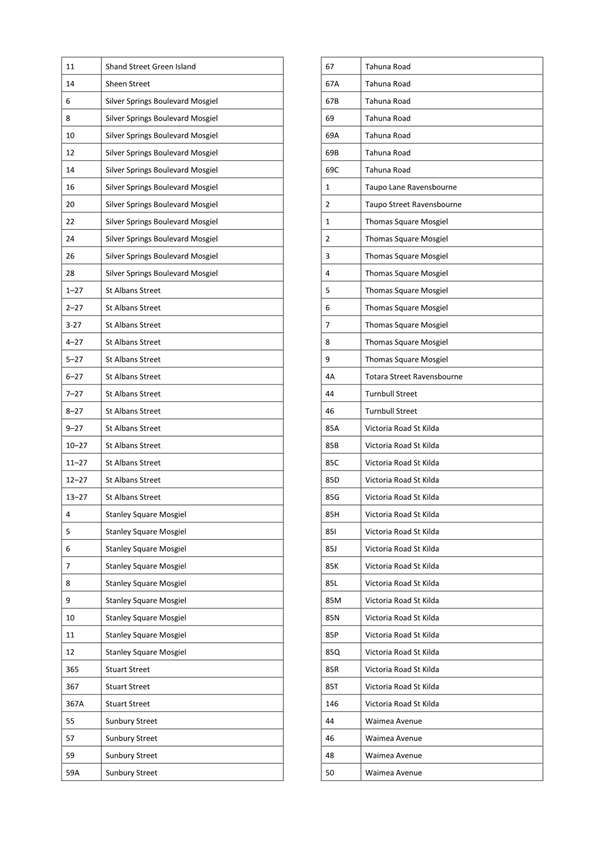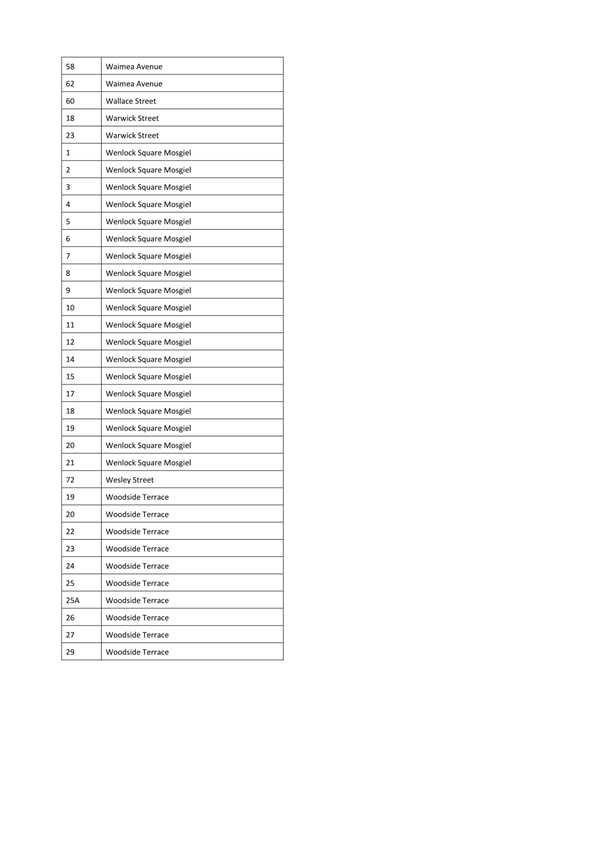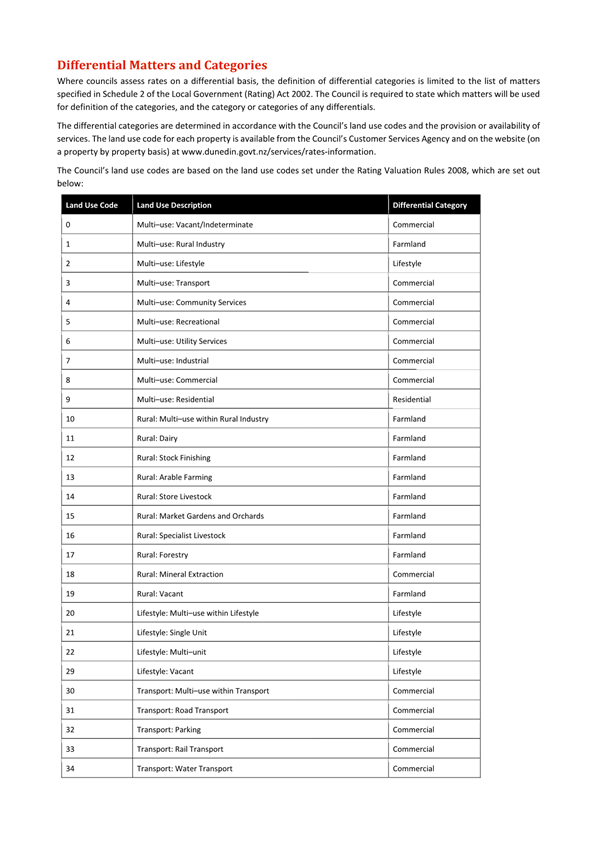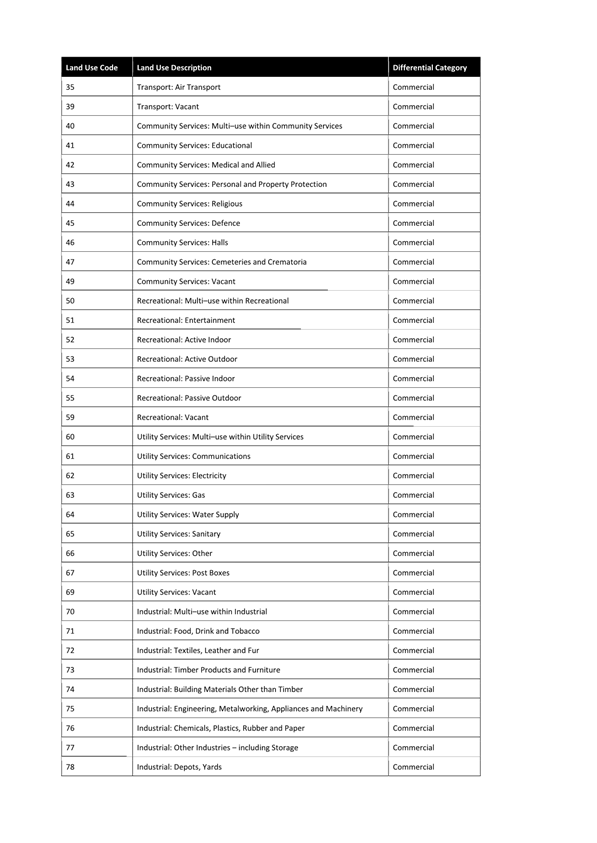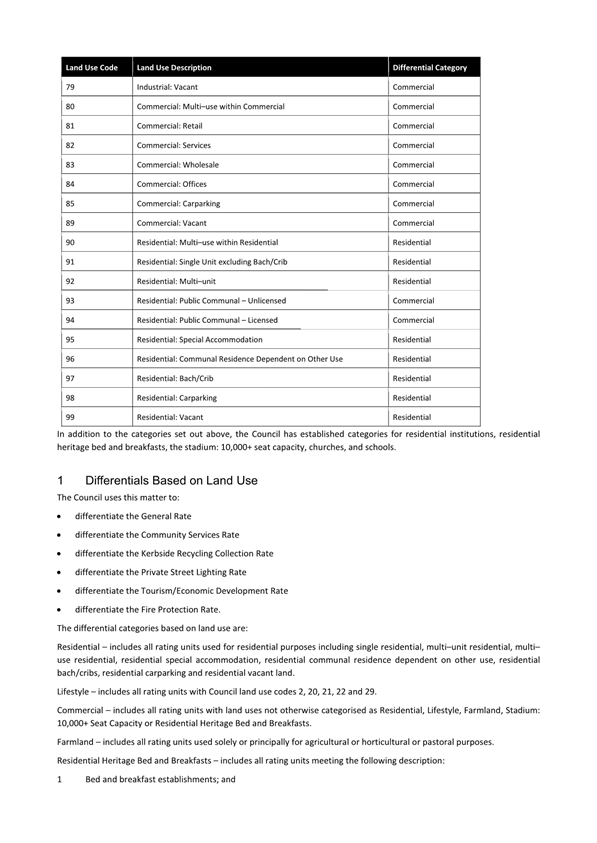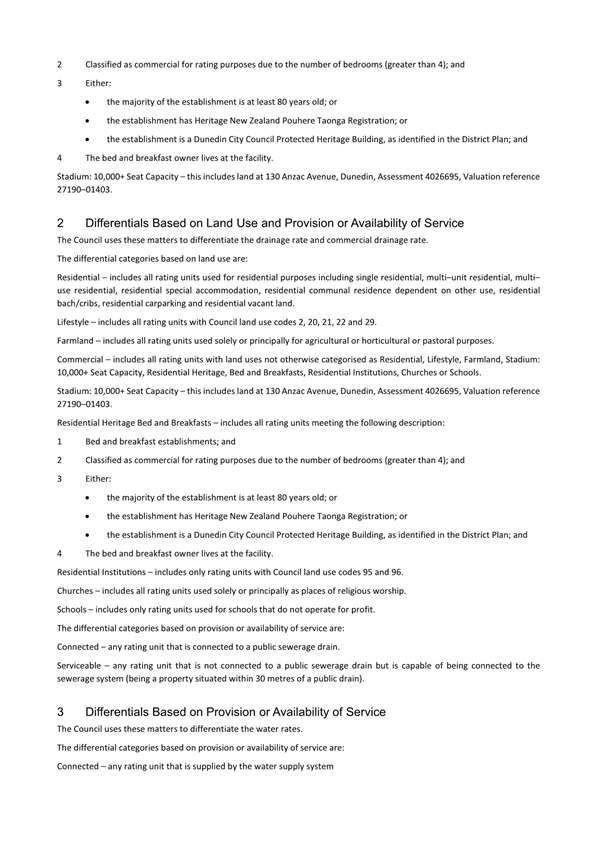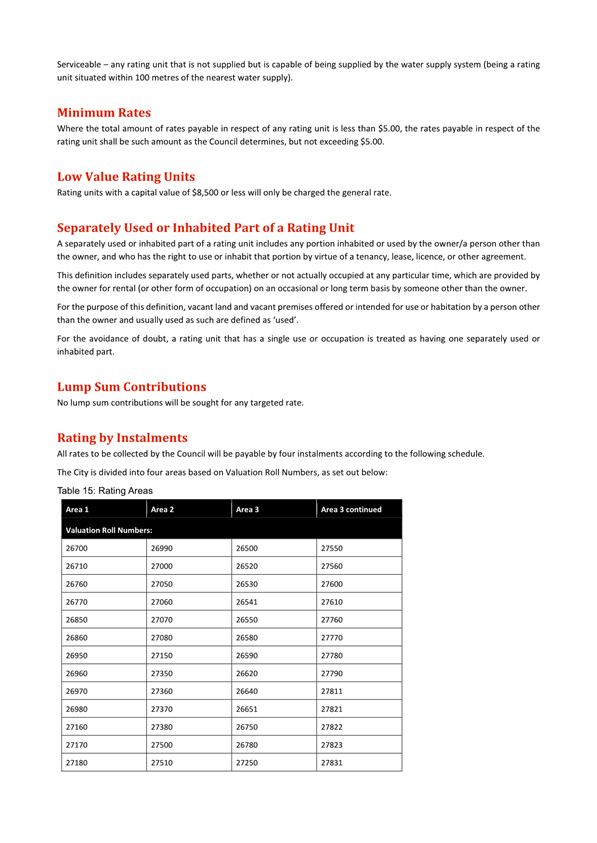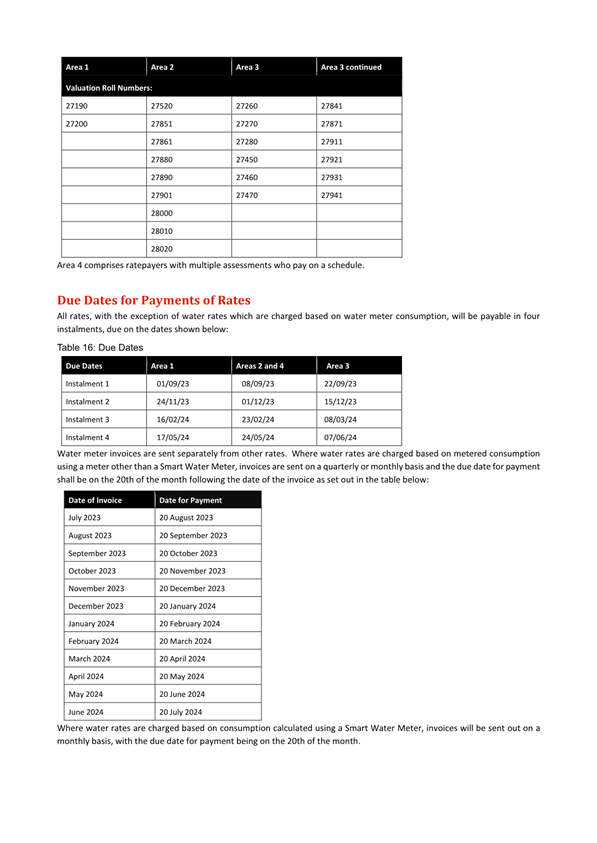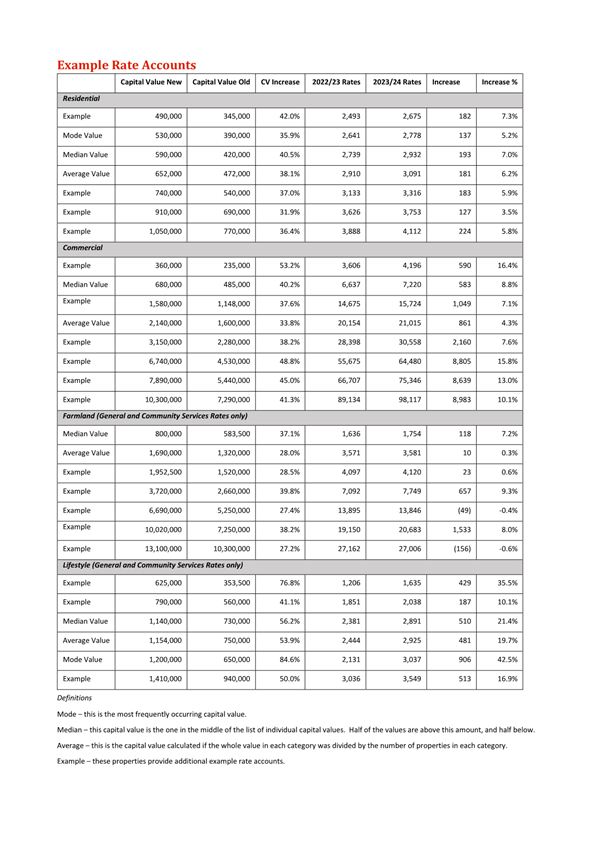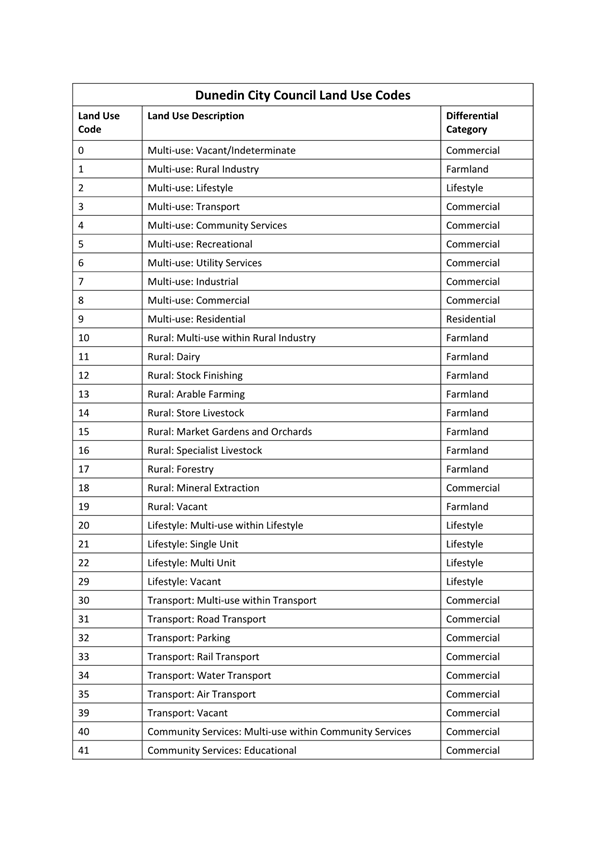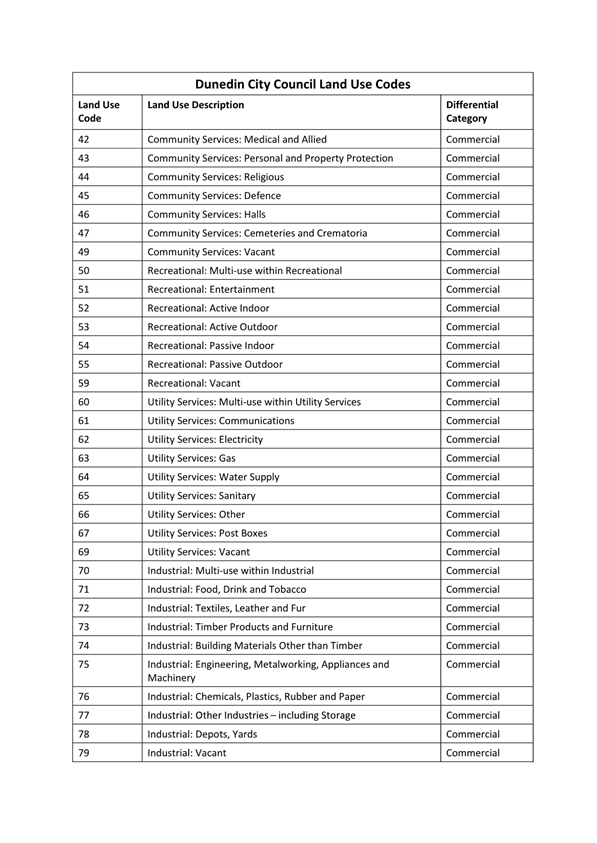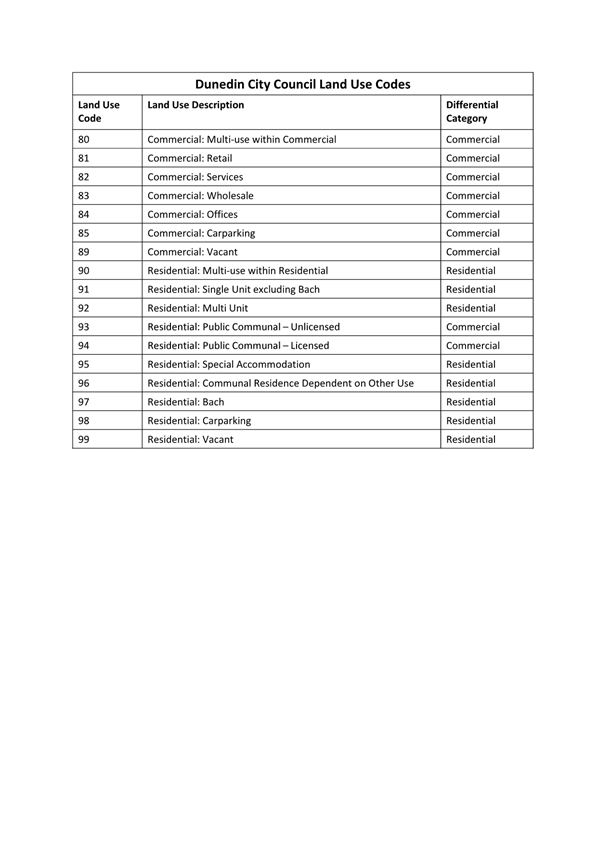
Notice of Meeting:
I hereby give notice that an ordinary meeting of the Dunedin
City Council will be held on:
Date: Tuesday
27 June 2023
Time: 10.00
am
Venue: Council
Chamber, Dunedin Public Art Gallery, The Octagon, Dunedin
Sandy Graham
Council
PUBLIC AGENDA
|
Mayor
|
Mayor Jules Radich
|
|
|
Deputy Mayor
|
Cr Sophie Barker
|
|
|
Members
|
Cr Bill Acklin
|
Cr David Benson-Pope
|
|
|
Cr Christine Garey
|
Cr Kevin Gilbert
|
|
|
Cr Carmen Houlahan
|
Cr Marie Laufiso
|
|
|
Cr Cherry Lucas
|
Cr Mandy Mayhem
|
|
|
Cr Jim O'Malley
|
Cr Lee Vandervis
|
|
|
Cr Steve Walker
|
Cr Brent Weatherall
|
|
|
Cr Andrew Whiley
|
|
Senior Officer Sandy
Graham, Chief Executive Officer
Governance Support Officer Lynne
Adamson
Lynne Adamson
Governance Support Officer
Telephone: 03 477 4000
governance.support@dcc.govt.nz
www.dunedin.govt.nz
Note: Reports
and recommendations contained in this agenda are not to be considered as
Council policy until adopted.
|

|
Council
27 June 2023
|
ITEM TABLE OF CONTENTS PAGE
1 Public
Forum 4
2 Apologies 4
3 Confirmation
of Agenda 4
4 Declaration
of Interest 5
5 Confirmation
of Minutes 16
5.1 Ordinary Council
meeting - 30 May 2023 16
5.2 Extraordinary
Council meeting - 6 June 2023 26
Reports
6 Actions
From Resolutions of Council Meetings 29
7 Forward
Work Programme for Council - June 2023 35
8 He
Tohu Huarahi Māori bilingual traffic signs - Submission 45
9 Three
Waters Reform Update and Submission on Water Services Entities Amendment Bill 53
10 New
Zealand Masters Games Deed of Variation 67
11 New
Zealand Masters Games Service Level Agreement and Statement of Intent 2023 -
2025 114
12 Proposed
Event Road Closures - July and August 2023 147
13 Dunedin
City Holdings Group Companies - Statements of Intent 2023/24 159
14 Adoption
of the Annual Plan 2023/24 176
15 Setting
of Rates for the 2023/24 Financial Year 268
Notice
of Motion
16 Notice
of Motion - Support for University of Otago 297
Resolution to Exclude the Public 299
|

|
Council
27 June 2023
|
1 Public
Forum
At the close of the agenda public
forum registrations were still being taken. The speakers will be confirmed
following closure of registrations 24 hours before the meeting starts.
2 Apologies
There have been no apologies.
3 Confirmation
of agenda
Note:
Any additions must be approved by resolution with an explanation as to why they
cannot be delayed until a future meeting.
|

|
Council
27 June 2023
|
Declaration of Interest
EXECUTIVE SUMMARY
1. Members
are reminded of the need to stand aside from decision-making when a conflict
arises between their role as an elected representative and any private or other
external interest they might have.
2. Elected
members are reminded to update their register of interests as
soon as practicable, including amending the register at this meeting if
necessary.
3. Staff are
reminded to update their register of interests as soon as practicable.
|
RECOMMENDATIONS
That the Council:
a) Notes/Amends if necessary the Elected Members'
Interest Register attached as Attachment A; and
b) Confirms/Amends the proposed management plan for
Elected Members' Interests.
c) Confirms the proposed management plan for the
Executive Leadership Team’s Interests.
|
Attachments
|
|
Title
|
Page
|
|
⇩a
|
Councillor Interest
Register
|
6
|
|
⇩b
|
Executive Leadership
Team Interest Register
|
14
|
|

|
Council
27 June 2023
|
Confirmation
of Minutes
Ordinary Council meeting - 30 May 2023
|
RECOMMENDATIONS
That the Council:
a) Confirms the public part of the minutes of the
Ordinary Council meeting held on 30 May 2023 as a correct record.
|
Attachments
|
|
Title
|
Page
|
|
A⇩
|
Minutes of Ordinary
Council meeting held on 30 May 2023
|
17
|
|

|
Council
27 June 2023
|

Council
MINUTES
Minutes of an ordinary
meeting of the Dunedin City Council held in the Council Chamber, Dunedin Public
Art Gallery, The Octagon, Dunedin on Tuesday 30 May 2023, commencing at 10.01
am
PRESENT
|
Mayor
|
Mayor Jules Radich
|
|
|
Deputy Mayor
|
Cr Sophie Barker
|
|
|
Members
|
Cr Bill Acklin
|
Cr David Benson-Pope
|
|
|
Cr Christine Garey
|
Cr Kevin Gilbert
|
|
|
Cr Carmen Houlahan
|
Cr Marie Laufiso
|
|
|
Cr Cherry Lucas
|
Cr Mandy Mayhem
|
|
|
Cr Jim O'Malley
|
Cr Lee Vandervis
|
|
|
Cr Steve Walker
|
Cr Brent Weatherall
|
|
|
Cr Andrew Whiley
|
|
|
IN ATTENDANCE
|
Sandy Graham (Chief Executive
Officer), Gavin Logie (Chief Financial Officer), Robert West (General Manager
Corporate and Quality), Jeanette Wikaira (Manahautū (General Manager
Māori, Partnerships and Policy)), Paul Henderson (Acting General Manager
Customer and Regulatory), Simon Pickford (General Manager Community
Services), Simon Drew (General Manager Infrastructure and Development), John
Christie (Manager Enterprise Dunedin), Leanne Mash (Communications and City
Marketing Manager), Jeanine Benson (Group Manager Transport), Chris Henderson
(Group Manager Waste and Environmental Solutions), David Ward (Group Manager
3 Waters), Scott McLean (Group Manager Parks and Recreation), Anna Nilsen
(Group Manager Property), Ben Hogan (Transport Delivery Manager), Dr Raphael
Krier-Mariani (Coastal Specialist), Stephen Hogg (Parks and Recreation
Planner), Simon Smith (Asset and Funding Manager) and Clare Sullivan
(Principal Committee Advisor).
|
Governance Support Officer Lynne
Adamson
1 Opening
Rev Shari Roy, Otago University Māori
Chaplain opened the meeting with a Karakia.
2 Public
Forum
|
2.1
|
Climate Crisis
|
|
|
Duke McLeod spoke on the
climate crisis and urged Council to find methods to address the climate
emergency challenge.
Mr McLeod responded to
questions.
|
|
|
|
|
2.2
|
Dunedin Theatre Venue
Options
|
|
|
Jeremy Anderson spoke to
his PowerPoint presentation on Dunedin Theatre Venue options and his
suggestion that a multi-use theatre be built from containers.
Mr Anderson responded to
questions.
|
|
|
|
|
Moved (Mayor Jules
Radich/Cr Steve Walker):
That the Council:
Extends
the Public Forum.
Motion
carried
|
|
2.3
|
Protect Otago Action
Group
|
|
|
Brandon Johnstone and Dr
Olivier Jutel spoke on the proposed staff cuts at the University of Otago on
behalf of staff, students and concerned residents.
Mr Johnstone and Dr Jutel
responded to questions.
|
|
3 APOLOGIES
|
|
There
was an apology for early departure from Cr Christine Garey.
Moved
(Mayor Jules Radich/Cr Steve Walker):
That
the Council:
Accepts
the apology for early departure from Cr Christine Garey.
carried
(CNL/2023/124)
|
|
4 CONFIRMATION
OF AGENDA
|
|
|
Moved (Mayor Jules Radich/Cr Mandy Mayhem):
That the Council:
Confirms the agenda
without addition or alteration.
Motion
carried (CNL/2023/125)
|
5 Declarations
of interest
Members were
reminded of the need to stand aside from decision-making when a conflict arose
between their role as an elected representative and any private or other
external interest they might have.
|
Moved (Mayor Jules Radich/Cr Sophie Barker):
That the Council:
a) Notes the Elected Members' Interest
Register; and
b) Confirms the proposed management plan for
Elected Members' Interests.
c) Notes the Executive Leadership Team
Members’ Interest Register.
Motion carried (CNL/2023/126)
|
|
6 Confirmation
of Minutes
|
6.1 ORDINARY
COUNCIL MEETING – 27 APRIL 2023
Moved (Mayor Jules Radich/Cr Brent Weatherall):
That the Council:
a) Confirms the public part of the minutes of the
Ordinary Council meeting
held on 27 April 2023 as a correct record.
Motion
carried (CNL/2023/127)
|
|
|
6.2 ORDINARY
COUNCIL MEETING – 22 MAY 2023
Moved (Mayor Jules Radich/Cr Andrew Whiley):
That the Council:
a) Confirms
the public part of the minutes of the Ordinary Council meeting
held on 22 May 2023 as a correct record.
Motion
carried (CNL/2023/128)
|
|
Reports
|
7 Actions
From Resolutions of Council Meetings
|
|
|
A report from Civic provided
an update on the implementation of resolutions made at Council
meetings.
|
|
|
Moved (Mayor Jules Radich/Cr Mandy Mayhem):
That the Council:
a) Notes
the Open and Completed Actions from resolutions of Council meetings.
Motion
carried (CNL/2023/129)
|
|
8 Forward
Work Programme for Council - MAY 2023
|
|
|
A report from Civic provided
the updated forward work programme for the 2022-2023 year.
|
|
|
The Chief Executive Officer (Sandy Graham) spoke to the
report and responded to questions.
|
|
|
Moved (Mayor Jules Radich/Cr Sophie Barker):
That the Council:
a) Notes the updated Council forward work programme.
Motion
carried (CNL/2023/130)
|
|
9 Kettle
Park Investigation of Historic Landfill
|
|
|
A report from Transport
provided the findings from the investigation on the contamination and
physical extent of the historic Kettle Park landfill, and outlined the next
steps that would be undertaken.
|
|
|
The General Manager Infrastructure and Development (Simon
Drew); Transport Delivery Manager (Ben Hogan) and Coastal Specialist (Dr
Raphael Krier-Mariani) spoke to the report and responded to questions.
|
|
Cr Christine Garey left the meeting at 11.17 am.
|
|
|
Moved (Mayor Jules Radich/Cr Bill Acklin):
That the Council:
a) Notes the Kettle Park Investigation of Historic Landfill
report.
Motion
carried (CNL/2023/131)
|
|
10 Capital
Expenditure Report - 2023/24 Annual Plan
|
|
|
A report from Finance sought
approval of the draft capital budget for inclusion in the 2023/24 Annual
Plan.
|
|
Cr Carmen Houlahan left the meeting at 11.31 am and
returned at 11.35 am.
During discussion Cr Christine Garey returned to the
meeting at 12.10 pm.
|
|
|
The Chief Executive Officer (Sandy Graham) and Chief
Financial Officer (Gavin Logie) spoke to the report and responded to
questions.
|
|
Moved (Mayor Jules Radich/Cr Sophie Barker):
That the Council:
Adjourns
the meeting for 5 minutes.
Motion
carried
The meeting adjourned at 12.26 pm and reconvened at 12.30
pm.
Moved (Mayor Jules Radich/Cr Mandy Mayhem):
That the Council:
Adjourns
the meeting for 5 minutes.
Motion
carried
The meeting adjourned at 12.32 pm and reconvened at 12.33
pm.
Moved (Mayor Jules Radich/Cr Marie Laufiso
That the Council:
Adjourns
the meeting until 1.30 pm.
Motion
carried
The meeting adjourned at 12.40 pm and reconvened at 1.31
pm.
|
|
|
Moved (Cr Jim
O'Malley/Cr Steve Walker):
That the Council:
a) Approves the 2023/24 draft capital budget of
$212.510m (including $95.008m for 3 Waters) for inclusion in the Annual Plan.
b) Notes that the Accelerated 3 Waters programme for years 1-3 of
the 10 year plan 2021-2031 was subject to the associated debt transfer being
approved by the DIA.
c) Notes staff would provide an update on the DIA approval process
as part of the adoption of the Annual Plan on 27 June 2023.
Division
The Council
voted by division
For: Crs
Bill Acklin, Sophie Barker, David Benson-Pope, Christine Garey, Kevin
Gilbert, Marie Laufiso, Mandy Mayhem, Jim O'Malley, Steve Walker, Brent
Weatherall, Andrew Whiley and Mayor Jules Radich (12).
Against: Crs
Carmen Houlahan, Cherry Lucas and Lee Vandervis (3).
Abstained: Nil
The division
was declared CARRIED by 12 votes to 3
Motion
carried (CNL/2023/132)
|
|
11 Reserves
Management Plan General Policies - Notice of Intent
|
|
|
A report from Parks and
Recreation sought approval to commence the public consultation process
required by Section 41(5) of the Reserves Act 1977 to enable a review of the
Reserves Management Plan General Policies 2005.
|
|
|
The General Manager Community Services (Simon Pickford)
and Parks and Recreation Planner (Stephen Hogg) responded to questions.
|
|
|
Moved (Cr David Benson-Pope/Cr
Steve Walker):
That the Council:
a) Approves the Statement of Proposal and the
high-level Stage 1 engagement question topics for the Reserves Management
Plan General Policies, and the commencement of the public consultation
process required by section 41(5) of the Reserves Act 1977.
Motion
carried (CNL/2023/133)
|
|
12 Proposed
Event Road Closures for June - August 2023
|
|
|
A report from Transport
recommended Council approve temporary road closure applications relating to
the following events:
a) Dunedin
Midwinter Carnival.
b) FIFA
Women’s World Cup 2023.
|
|
|
The General Manager Infrastructure and Development (Simon
Drew) and Group Manager Transport (Jeanine Benson) responded to questions.
|
|
|
Moved (Cr Steve Walker/Cr Lee Vandervis):
That the Council:
a) Resolves
to close the roads detailed below (pursuant to Section 319, Section 342, and
Schedule 10 clause 11(e) of the Local Government Act 1974):
i) Dunedin
Midwinter Carnival
Dates:
Friday 23 June and Saturday 24 June 2023.
Postponement dates (in the case of the event not
going ahead) are Friday 30 June and Saturday 1 July 2023.
Roads and Times:
From 12noon to 5.00pm.
· Moray
Place, in front of First Church only.
From 5.00pm to 9.00pm.
· Burlington
Street, from SH1 to Moray Place.
· Moray
Place, from Lower Stuart Street to Princes Street.
ii) FIFA
Women’s World Cup 2023
Dates:
Tuesday 18 July to Wednesday 2 August
2023.
Roads and Times:
· Harrop
Street, full length - 9.00am to 5.00pm.
Dates:
Friday 21 July and Wednesday 26 July
2023.
Roads and Times:
· Anzac
Avenue, between Logan Park Drive and Butts Road - 12 noon to 2.00pm.
· Anzac
Avenue, between Ravensbourne Road and Butts Road - 2.00pm to 8.00pm.
· Union
Street East, between Harbour Terrace and Anzac Avenue - 2.00pm to 8.00pm.
· Butts
Road, between Anzac Avenue and Logan Park Drive - 2.00pm to 8.00pm.
· Logan
Park Drive, from Anzac Avenue to Butts Road - 2.00pm to 8.00pm.
· Albany
Street, from Anzac Avenue to Forth Street - 6.00pm to 8.00pm.
· Dundas
Street, from Butts Road to Harbour Terrace - 6.00pm to 8.00pm.
· Minerva
Street, from Anzac Avenue to Parry Street West - 6.00pm to 8.00pm.
· Parry
Street West, from Minerva Street to end - 6.00pm to 8.00pm.
Dates:
Sunday 23 July 2023.
Roads and Times:
· Anzac
Avenue, between Logan Park Drive and Butts Road - 2.30pm to 4.30pm.
· Anzac
Avenue, between Ravensbourne Road and Butts Road - 4.30pm
to 10.30pm.
· Union
Street East, between Harbour Terrace and Anzac Avenue - 4.30pm to 10.30pm.
· Butts
Road, between Anzac Avenue and Logan Park Drive - 4.30pm to 10.30pm.
· Logan
Park Drive, from Anzac Avenue to Butts Road - 4.30pm to 10.30pm.
· Albany
Street, from Anzac Avenue to Forth Street - 8.30pm to 10.30pm.
· Dundas
Street, from Butts Road to Harbour Terrace - 8.30pm to 10.30pm.
· Minerva
Street, from Anzac Avenue to Parry Street West - 8.30pm to 10.30pm.
· Parry
Street West, from Minerva Street to end - 8.30pm to 10.30pm.
Dates:
Friday 28 July 2023.
Roads and Times:
· Anzac
Avenue, between Logan Park Drive and Butts Road - 7.00am to 9.00am.
· Anzac
Avenue, between Ravensbourne Road and Butts Road - 9.00am to 3.00pm.
· Union
Street East, between Harbour Terrace and Anzac Avenue - 9.00am to 3.00pm.
· Butts
Road, between Anzac Avenue and Logan Park Drive - 9.00am to 3.00pm.
· Logan
Park Drive, from Anzac Avenue to Butts Road - 9.00am to 3.00pm.
· Albany
Street, from Anzac Avenue to Forth Street - 1.00pm to
3.00pm.
· Dundas
Street, from Butts Road to Harbour Terrace - 1.00pm to 3.00pm.
· Minerva
Street, from Anzac Avenue to Parry Street West - 1.00pm to 3.00pm.
· Parry
Street West, from Minerva Street to end - 1.00pm to 3.00pm.
Dates:
Sunday 30 July and Tuesday 1 August 2023.
Roads and Times:
· Anzac
Avenue, between Logan Park Drive and Butts Road - 2.00pm to 4.00pm.
· Anzac
Avenue, between Ravensbourne Road and Butts Road - 4.00pm to 10pm.
· Union
Street East, between Harbour Terrace and Anzac Avenue - 4.00pm to 10pm.
· Butts
Road, between Anzac Avenue and Logan Park Drive - 4.00pm to 10pm.
· Logan
Park Drive, from Anzac Avenue to Butts Road - 4.00pm to 10pm.
· Albany
Street, from Anzac Avenue to Forth Street - 8.00pm to
10.00pm.
· Dundas
Street, from Butts Road to Harbour Terrace - 8.00pm to 10.00pm.
· Minerva
Street, from Anzac Avenue to Parry Street West - 8.00pm to 10.00pm.
· Parry
Street West, from Minerva Street to end - 8.00pm to 10.00pm.
Motion
carried (CNL/2023/134)
|
The meeting closed at 2.31 pm.
..............................................
MAYOR
|

|
Council
27 June 2023
|
Extraordinary Council meeting
- 6 June 2023
|
RECOMMENDATIONS
That the Council:
a) Confirms the public part of the minutes of the
Extraordinary Council meeting held on 06 June 2023 as a correct record.
|
Attachments
|
|
Title
|
Page
|
|
A⇩
|
Minutes of
Extraordinary Council meeting held on 6 June 2023
|
27
|
|

|
Council
27 June 2023
|
·

Council
MINUTES
Minutes of an extraordinary
meeting of the Dunedin City Council held in the Council Chamber, Dunedin Public
Art Gallery, The Octagon, Dunedin on Tuesday 06 June 2023, commencing at 9.10
am
PRESENT
|
Deputy Mayor
|
Cr Sophie Barker
|
|
|
Members
|
Cr Bill Acklin
|
Cr Christine Garey
|
|
|
Cr Kevin Gilbert
|
Cr Cherry Lucas
|
|
|
Cr Mandy Mayhem
|
Cr Jim O’Malley
|
|
|
Cr Lee Vandervis
|
Cr Steve Walker
|
|
|
Cr Brent Weatherall
|
Cr Andrew Whiley
|
|
IN ATTENDANCE
|
Sandy Graham (Chief Executive
Officer), Jeanette Wikaira (Manahautū (General Manager Māori,
Partnerships and Policy)), Simon Pickford (General Manager Community
Services) and Scott MacLean (Group Manager Parks and Recreation)
|
Governance Support Officer Lynne
Adamson
|
1 APOLOGIES
|
|
Moved (Cr Sophie Barker/Cr Christine Garey):
That
the Council:
Accepts
the apologies from Mayor Jules Radich and Cr Marie Laufiso.
Motion
carried (CNL/2023/135)
|
|
2 CONFIRMATION
OF AGENDA
|
|
|
Moved (Cr Sophie Barker/Cr Mandy Mayhem):
That the Council:
Confirms the agenda
without addition or alteration
Motion
carried (CNL/2023/136)
|
3 Declarations
of interest
Members were
reminded of the need to stand aside from decision-making when a conflict arose
between their role as an elected representative and any private or other
external interest they might have.
|
|
Moved (Cr Sophie Barker/Cr Mandy Mayhem):
That the Council:
a) Notes
the Elected Members’ Interest Register; and
b) Confirms
the proposed management plan for Elected Members’ Interests.
c) Notes
the proposed management plan for the Executive Leadership Team’s
Interests.
Motion carried
(CNL/2023/137)
|
Reports
|
3 Fees
and Charges for Te Puna o Whakaehu
|
|
|
A report from Parks and
Recreation noted that Te Puna o Whakaehu would open on 19 June 2023 and
recommended the adoption of fees and charges that would apply for the
period 19 June to 30 June 2023.
|
|
|
The Chief Executive Officer (Sandy Graham), Simon Pickford
and Group Manager Parks and Recreation (Scott MacLean) spoke to the report
and responded to questions.
|
|
Cr Kevin Gilbert entered the meeting at 9.10 am.
|
|
|
Moved (Cr Cherry Lucas/Cr Mandy
Mayhem):
That the Council:
a) Approves the recommended fees for Te Puna o
Whakaehu, for the period 19 June to 30 June 2023.
Motion
carried (CNL/2023/138)
|
The meeting closed at 9.12 am.
..............................................
DEPUTY MAYOR
|

|
Council
27 June 2023
|
Reports
Actions From Resolutions of Council Meetings
Department: Civic
EXECUTIVE SUMMARY
1 The
purpose of this report is to show progress on implementing resolutions made at
Council meetings.
2 As
this report is an administrative report only, there are no options or Summary
of Considerations.
|
RECOMMENDATIONS
That the Council:
a) Notes
the Open and Completed Actions from resolutions of Council meetings as
attached.
|
discussion
3 This
report also provides an update on resolutions that have been actioned and
completed since the last Council meeting. Note that items on the Forward
Work Programme are not included in the attached schedules.
NEXT STEPS
4 Updates
will be provided at future Council meetings.
Signatories
|
Author:
|
Lynne Adamson - Governance Support Officer
|
|
Authoriser:
|
Sharon Bodeker - Manager Governance
|
Attachments
|
|
Title
|
Page
|
|
⇩a
|
Council Public Open
Action List
|
31
|
|
⇩b
|
Council Public Closed
Action list
|
33
|
|

|
Council
27 June 2023
|

|

|
Council
27 June 2023
|
Forward Work Programme for Council - June 2023
Department: Civic
EXECUTIVE SUMMARY
1 The
purpose of this report is to provide the updated forward work programme for the
2022-2023 year (Attachment A).
2 As
this is an administrative report only, there are no options or Summary of
Considerations.
|
RECOMMENDATIONS
That the Council:
a) Notes the updated Council forward work programme as shown
in Attachment A.
|
DISCUSSION
3 The
forward work programme is a regular agenda item which shows areas of activity,
progress and expected timeframes for Council decision making across a range of
areas of work.
4 As
an update report, the purple highlight shows changes to timeframes. New
items added to the schedule are highlighted in yellow. Items that have been
completed or updated are shown as bold.
NEXT STEPS
5 An
updated report will be presented to future Council meetings.
Signatories
|
Author:
|
Sharon Bodeker - Manager Governance
|
|
Authoriser:
|
Sandy Graham - Chief Executive Officer
|
Attachments
|
|
Title
|
Page
|
|
⇩a
|
Council Forward Work
Programme - June 2023
|
37
|
|

|
Council
27 June 2023
|
He Tohu Huarahi Māori bilingual traffic
signs - Submission
Department: Transport
EXECUTIVE SUMMARY
1 The
purpose of this report is to seek Council approval for a Dunedin City Council
(DCC) submission (Attachment A) on Waka Kotahi consultation for the draft Land
Transport Rule: Traffic Control Devices (Bilingual signs) Amendment (2023).
2 This
report summarises the main consultation points and the recommendations of the
draft submission.
RECOMMENDATIONS
That the Council:
a) Approves the draft submission, with any amendments,
on the Land Transport Rule: Traffic Control Devices (Bilingual signs) Amendment
(2023).
b) Authorises the Chief Executive to make any minor
editorial changes to the submission if required.
BACKGROUND
3 Waka
Kotahi introduced consultation on bilingual traffic signage on 22 May 2023. The
deadline for submissions is 5pm, 30 June 2023.
4 A
package of 94 bilingual traffic signs is proposed in the draft Land
Transport Rule: Traffic Control Devices (Bilingual Signs) Amendment
2023 as part of the He Tohu Huarahi Māori bilingual traffic signs
programme led by Te Mātāwai and Waka Kotahi.
5 The
consultation documents can be found at the following link https://nzta.govt.nz/about-us/consultations/
in either te reo Māori or English.
6 Bilingual
signage is part of the Transport sectors contribution to Maihi Karauna, the
Crown strategy for Māori Language revitalisation 2018 – 2023 which
aims to provide everyday opportunities for New Zealanders to engage with and
use te reo Māori.
DISCUSSION
Summary of types of signs and proposed
changes
7 There
are three categories of traffic signs used on the transport network.
- Regulatory:
Instructing users through a requirement or prohibiting a specific action on a
corridor.
- Warning:
Informing users of a hazard or other feature requiring a safe response.
- Advisory:
Giving users information or guidance.
8 This
consultation suggests bilingual signage is adopted across six types of
signs. Four of which are advisory, one is a warning, and one is
regulatory.
Destination signs (Advisory)
9 These
signs inform road users of directions and/or distances to destinations. Colour
is the proposed differentiator between languages on these signs with te reo
Māori in yellow and English in white.
10 Road
Controlling Authorities (RCAs) can choose from two translations of
“Welcome to”.
11 Waka
Kotahi are seeking feedback on whether the “Welcome to” is on one
sign in both languages, or is on two signs, with the sign in te reo Māori
on the left-hand side of the road, and the sign in English on the right hand
side.
12 For
familiarity, consistency and ease of installation, the draft submission
recommends combined te reo Māori and English signs should be used.
Public and active transport
signs (Advisory)
13 The
signs in this category relate to bus or cycle lanes. Font size is the proposed
differentiator between languages on these signs with te reo Māori one font
size up from English.
14 For
bus stop signs, colour is the proposed differentiator method to determine te
reo Māori from English. Te reo Māori is presented in black and
English in red.
15 The
draft submission makes no comment on this sign category.
Walking and cycling
wayfinding signs (Advisory)
16 These
signs provide directional information for active transport modes. Colour is the
proposed differentiator between languages on these signs with te reo Māori
in black and English in blue.
17 The
draft submission makes no comment on this sign category.
General advisory and
permanent warning signs (Warning)
18 This
category of sign provides information about features adjacent to roads and warn
of hazards. Font size is the proposed differentiator between languages on these
signs with te reo Māori one font size up from English.
19 The
draft submission makes no comment on this sign category.
Motorway and expressway
advisory signs (Advisory)
20 These
signs provide information about motorways and expressways. Font size is the
proposed differentiator between languages on these signs with te reo Māori
one font size up from English.
21 Waka
Kotahi is seeking feedback on whether the differentiator should be colour
instead of font size. For reasons of consistency with Destination
Signs, the draft submission recommends colour is used to differentiate between
languages.
Temporary warning signs
(Regulatory)
22 These
signs are used by workers to ensure their own safety and that of road users
around worksites. Sentence case is the proposed differentiator for these signs
with te reo Māori in lower case and English in upper case.
23 Waka
Kotahi is asking for feedback on a dual sign approach with one sign in te reo
Māori and one in English with a distance between them (on the same side of
the road). The draft submission recommends only one sign with both te reo
Māori and English is adopted. Having two signs can cause
“cluttering” effects for road users and means workers have to put
out two sets of signs instead of one (and associated sandbags). Vehicles that
carry signs for this type of work have maximum loading capacity and increasing
the number of signs to be deployed will affect efficiencies.
Other proposed changes
24 The
draft Land Transport Rule: Traffic Control Devices (Bilingual Signs)
Amendment 2023 also incorporates a number of other minor changes that are
not related to the introduction of bilingual signage.
25 Other
changes that have been proposed relate to specifications/requirements of signs
(shape/borders/colours/text/formatting of macrons), and minor amendment of the
definitions of “public holiday”, “school bus”, and the
adding of a definition for “official geographical name”.
26 The
draft submission makes no comment on these other amendments as they are minor
and administrative.
Implementation
of bilingual signage
27 The
consultation document notes implementation of bilingual signs will be when RCAs
need to replace an end of life sign or when new signs are introduced to the
transport network. Costs will be minimised under this approach.
28 The
draft submission requests additional guidance from Waka Kotahi for when this
approach is not appropriate (for example, where there is a site of cultural
significance or when this approach may result in different signs on each side
of the road).
Road user safety with
bilingual signage
29 It
is reasonable to infer bilingual signs increase the demand of the driving task
and therefore impact on road safety. Research has found little evidence
of major safety impacts associated with bilingual signage with studies
demonstrating drivers appear able to absorb this extra demand, or negate it by
slowing down, which ultimately results in no detectable change in accident
rates.
30 In
2001, bilingual signage was introduced on trunk roads in Scotland (although
many local roads had bilingual signs before this). This did not lead to an
increase in deaths and serious injuries on the roads in Scotland. The
Republic of Ireland (where bilingual signage has been in place for a number of
years) has a death rate of 2.9 per 100,000 inhabitants per year, in comparison
New Zealand’s is 7.8.
31 Waka
Kotahi research concluded that following best practice sign design guidance had
the potential to mitigate the potential negative effects of sign complexity on
public safety while providing for cultural aspirations.
OPTIONS
Option
One – Recommended Option
32 Agree,
with any amendments, the submission to the Land Transport Rule Traffic Control
Devices (Bilingual signs) Amendment (2023).
Advantages
· Opportunity
to provide feedback on the introduction of bilingual signage.
Disadvantages
· There
are no identified disadvantages.
Option
Two
33 Do
not approve the submission to the Land Transport Rule Traffic Control Devices
(Bilingual signs) Amendment (2023).
Advantages
· There
are no identified advantages.
Disadvantages
· Missed
opportunity to provide feedback on consistency of signs, their placement, the
practicalities of installation and budget for this work.
NEXT STEPS
34 If
the submission is approved, staff will submit it, with any amendments to Waka
Kotahi.
Signatories
|
Author:
|
Jeanine Benson - Group Manager Transport
|
|
Authoriser:
|
Simon Drew - General Manager Infrastructure and Development
|
Attachments
|
|
Title
|
Page
|
|
⇩a
|
He Tohu Huarahi
Māori Bilingual Traffic Signs – Submission
|
51
|
|
SUMMARY OF CONSIDERATIONS
|
|
Fit with purpose
of Local Government
This decision enables democratic local
decision making and action by, and on behalf of communities.
This decision promotes the social,
economic, environmental cultural well-being of communities in the present and
for the future.
|
|
Fit with strategic
framework
|
|
Contributes
|
Detracts
|
Not applicable
|
|
Social Wellbeing Strategy
|
☐
|
☐
|
☐
|
|
Economic Development Strategy
|
☒
|
☐
|
☐
|
|
Environment Strategy
|
☐
|
☐
|
☐
|
|
Arts and Culture Strategy
|
☒
|
☐
|
☐
|
|
3 Waters Strategy
|
☐
|
☐
|
☐
|
|
Spatial Plan
|
☐
|
☐
|
☐
|
|
Integrated Transport Strategy
|
☒
|
☐
|
☐
|
|
Parks and Recreation Strategy
|
☐
|
☐
|
☐
|
|
Other strategic projects/policies/plans
|
☐
|
☐
|
☐
|
The instruction of bilingual signage aims to assist
economic development and improve access and mobility, and the promotion and
development of te reo Māori.
|
|
Māori Impact
Statement
This consultation has been prepared in partnership
with Te Mātāwa, the organisation tasked with Māori Language
Revitalisation in partnership with the Crown. The DCC recognises the
importance of partnership, co-operation, and the leadership role that iwi and
Māori play in relation to Māori language revitalisation. This
proposal will support iwi and Māori in their efforts to ensure te reo
Māori is a living language within our communities.
|
|
Sustainability
The introduction of bilingual signage support DCC’s
sustainable practise framework through social connection and social equity.
|
|
LTP/Annual Plan /
Financial Strategy /Infrastructure Strategy
There are no implications.
|
|
Financial
considerations
There are no financial implications.
|
|
Significance
This paper is considered low on the significance and
engagement policy | Kaupapa here hirahira whakatūtaka.
|
|
Engagement –
external
There has been no external engagement, this is a Waka
Kotahi led consultation.
|
|
Engagement -
internal
There has been internal engagement with Transport and
Corporate Policy.
|
|
Risks: Legal /
Health and Safety etc.
Health and safety risks associated with bilingual signage
are discussed in the report.
|
|
Conflict of
Interest
There are no conflicts of interest.
|
|
Community Boards
Bilingual signage will be of interest to many members of
the community including in those areas covered by Community Boards.
|
|

|
Council
27 June 2023
|
27 June
2023
Waka
Kotahi
The
Majestic Centre
Level,
7/100 Willis Street
Wellington
Central
Wellington
6011
Tēnā
koutou
He
Tohu Huarahi Māori Bilingual Traffic Signs – Consultation
1
The Dunedin City Council (DCC) welcomes the opportunity to submit to
Waka Kotahi on the draft Land Transport Rule: Traffic Control Devices
(Bilingual signs) Amendment 2023.
2
The DCC acknowledges its Treaty of Waitangi responsibilities.
Consistently successful engagement with iwi Māori results in better
decision making, more robust and lasting solutions, and more engaged people and
communities.
3
DCC supports the goal of incorporating more te reo Māori into
Aotearoa New Zealand’s transport network.
4
DCC recognises the importance of partnership, co-operation, and the
leadership role that iwi and Māori play in relation to Māori language
revitalisation. The DCC notes this proposal will support iwi and
Māori in their efforts to ensure te reo Māori is a living language
within our communities.
5
Bilingual signs will help ensure there are everyday opportunities for
all New Zealanders to engage with and use te reo Māori.
6
DCC is supportive of the changes described in the consultation document.
Key
submission points
7
DCC support the factors that have been considered to determine which
signs would be prioritised to be made bilingual.
8
DCC notes that a panel of te reo Māori experts have considered and
proposed the translations to be used.
9
Waka Kotahi note that familiarity of signs should be maintained. DCC
supports this principal and therefore to be consistent with other proposed
bilingual signs, DCC recommends that the combined te
reo Māori and English sign should be used for Destination Signs.
10
For reasons of consistency with Destination Signs, the DCC recommends
differentiating te reo Māori and English in colour for Motorway and Expressway
advisory signs.
11
DCC recommends that only one sign is adopted for Temporary Warning
signs. Having two signs can cause “cluttering” effects for
road users and means workers must put out two sets of signs instead of one (and
associated sandbags). Vehicles that carry signs for this type of work have
maximum loading capacity and increasing the number of signs to be deployed will
affect efficiencies.
12
DCC acknowledges the implementation approach that bilingual signs will
be used when replacing end of life signs or when new signs are introduced to
the transport network. Costs will be minimised under this
approach.
13
DCC requests additional guidance from Waka Kotahi for when this approach
is not appropriate (for example where there is a site of cultural significance
or when this approach may result in two different signs on each side of the road).
The
DCC thanks you for the opportunity to submit on He Tohu Huarahi Māori
Bilingual Traffic Signs.
Nāku
noa, nā
Jules Radich
Mayor
of Dunedin
|

|
Council
27 June 2023
|
Three Waters Reform Update and Submission on
Water Services Entities Amendment Bill
Department: Executive Leadership Team and Legal
EXECUTIVE SUMMARY
1 This
report:
a) Provides
an update to Council on Affordable Water Reform (previously called Three Waters
Reform);
b) Summarises
the Water Services Entities Amendment Bill (the WSEs Amendment Bill); and
c) Seeks
a delegation to authorise the Council's Chief Executive Officer, in
consultation with the Chair of the Infrastructure Services Committee, to (i)
prepare a draft submission to Parliament’s Select Committee on the WSEs
Amendment Bill; and (ii) send the finalised submission to the Select Committee.
2 The
proposed key points for the draft submission are:
a) The
service delivery model introduced by the Affordable Water Reform to date is
still fundamentally flawed despite the amendments proposed in the WSEs
Amendment Bill. There is still a risk that ratepayers/consumers are going to
end up paying significantly more in combined rates and water charges under the
service delivery model provided by the legislation compared to the status quo.
Council questions why it should transfer such significant community assets if
the model itself is flawed.
b) The
extra time provided by the reset should be used to reconsider the underlying
fundamentals of the reform and redesign the legislation to ensure the original
economic objectives of the reform are achievable. The underlying financial
modelling is flawed and needs to be recalculated.
c) Council
is still concerned that:
i) The
Government has not adequately addressed concerns regarding the repeal of
existing protections against privatisation (e.g., section 130 of the Local
Government Act 2002 (LGA)).
ii) City
planning processes will be hamstrung with the Water Service Entity (WSE)
exerting investment power over Council’s ability to plan for future land
use. There is the potential for WSEs to concentrate their funding in some
locations and not others.
iii) Emergency
management will be problematic.
These concerns remain notwithstanding Select Committee recommendations
to strengthen relationship agreements under the Water Services Legislation Bill
(the Legislation Bill).
d) Recent
events in Auckland and the wider North Island re-emphasise the need for water
reform and greater funding to ensure efficiencies and safety. However, such
events do not point to the new model as being the only solution. Council question why ownership of water assets and
governance need to change if the Government can provide mechanisms to address
current restraints through more centralised functions such as the shared
services option and WSE Funding Agency (WSFA) proposed under the current WSEs
Amendment Bill.
e) Due to the extremely short period for submissions
on the WSEs Amendment Bill, it is nearly impossible to consider what is being
proposed let alone consult with Council’s community. For this to be a
recurring theme on the introduction of each bill in the entire suite of
legislation is cynical.
f) While
Council considers that the reform should be redesigned, if the current reform
is to proceed:
i) Council
supports 10 WSEs under the WSEs Amendment Bill instead of four WSEs as provided
under the current legislation. This is because 10 WSEs allows for greater
representation by individual Councils on the Regional Representative Group
(RRG). The level of representation and influence is still inadequate but is
better than what is currently enacted.
ii) Council
would like to ensure a merger proposal with other WSE(s) can only be
implemented on agreement by all RRG representatives (or at least all
territorial authority representatives on the RRG as underlying shareholders of
the WSE).
iii) Council
is concerned about resourcing demands and constraints due to extended
transitional obligations, and the navigation of amended local government
planning, reporting, and rating due to water reform.
iv) Council
needs a fixed establishment date for Entity J, as certainty is critical to
Council. This is for a variety of reasons, but Council is particularly
concerned that the reforms have created and continue to create workforce
retention and workload issues.
v) Council
would like Entity J to be established on 1 July 2025 or, if this is not
possible, on 1 July 2026. Council does not want Entity J to be established part
way through a financial year as this is operationally challenging and comes
with additional costs. Council seeks a specified date for the establishment of
Entity J, in much the same way that the WSEs Amendment Bill records that the
Northland and Auckland Water Services Entity will be established on 1 July
2024.
vi) Council
is concerned about how a WSEs Funding Agency (WSFA) will work particularly the
reference that a WSE may give a guarantee, an indemnity, or a security in
respect of the performance of any obligation by the Funding Agency.
|
RECOMMENDATIONS
That the Council:
a) Notes the update on Affordable Water Reform (previously
called Three Waters Reform).
b) Delegates authority to the Council's Chief
Executive Officer, in consultation with the Chair of the Infrastructure
Services Committee, to (i) prepare a draft submission to Parliament’s
Select Committee on the WSEs Amendment Bill; and (ii) send the finalised
submission to the Select Committee.
c) Authorises the Chair of Infrastructures Services
(or his delegate) to speak to the submission.
|
BACKGROUND
Affordable Water (Three
Waters) Reform Programme
3 In
July 2020, the Government launched the Three Waters Reform Programme to reform
local government three waters service delivery arrangements throughout New
Zealand.
4 Since
then, the Government has introduced a suite of legislative changes to support
both regulatory and service delivery reform.
5 As
part of regulatory reform, Taumata Arowai was established as a Crown entity in
March 2021. Taumata Arowai became New Zealand's dedicated regulator of drinking
water when the Water Services Act 2021 came into effect on 15 November 2021.
6 In
October 2021, the Government announced local government participation in the
Three Waters service delivery reform would be mandatory. Soon after, the
Government released an exposure draft of the Water Services Entities Bill (WSEs
Bill) that would establish the proposed four new WSEs.
7 The
WSEs Bill received royal assent on 14 December 2022 and is now the Water
Services Entities Act 2022 (WSEs Act).
8 The
WSEs Act legislated to form four entities across New Zealand. The Council was
included in Entity D which covered most of the South Island (in line with the
Ngai Tahu takiwā).
9 Two
further Bills were introduced in December 2022, namely the Water Services
Legislation Bill (Legislation Bill) and the Water Services Economic Efficiency
and Consumer Protection Bill (Regulation Bill).
10 Council
submitted on the Legislation Bill and Regulation Bill on 28 February 2023.
11 Parliament's
Finance and Expenditure Select Committee has reported back on both the
Legislation Bill and Regulation Bill, and these Bills are currently awaiting
their second reading in Parliament.
12 On
13 April 2023, the Government announced that there would be changes to the
water services reform programme. These changes included increasing the number
of new WSEs from four to ten (meaning there would be three WSEs in the South
Island). Announcements indicated that DCC is to be part of the Otago and
Southland WSE (also referred to as Entity J).
13 Entity
J includes the territorial authorities of Dunedin City Council, Clutha District
Council, Central Otago District Council, Queenstown-Lakes District Council,
Gore District Council, Southland District Council, and lnvercargill City
Council.
14 The
announcement further stated Three Waters Reform would be renamed the Affordable
Water Reform.
15 A
further bill was introduced to Parliament on 16 June 2023 called the Water
Services Entities Amendment Bill, adding further to the suite of water
legislation.
16 The
WSEs Amendment Bill would, if enacted, amend the WSEs Act so that there are ten
WSEs established using a staggered approach, with entities being stood up from
1 July 2024 and complete by 1 July 2026. Further details are set out below.
DISCUSSION
Previous Council Submissions on the Affordable Water
(Three Waters) Reform
17 Council
has made submissions on Affordable Water (Three Waters) Reform, as summarised
in Table 1 below.
Table 1:
Summary of Council Submissions on Affordable Water (Three Waters) Reform
|
Legislation / Issue submitted on
|
Date Council Submission
|
Summary of Council Submission
|
|
Water
Services Bill
|
1
March 2021
|
The
Council supported the establishment of Taumata Arowai but sought further
clarification on roles and responsibilities, changes to the LGA, funding and
resourcing, exemptions from regulatory requirements, liability provision and
source water risk management.
|
|
Feedback
on Government Announcement of Water Reforms and Four-Entity Model.
|
30
September 2021
|
The
Council requested more time to consult with the community and recommended
Government needed to work with Councils and iwi / Maori. Council highlighted
concerns regarding the control of land use planning.
|
|
Water
Services Entities Bill
|
8
August 2022 (approved at Council Meeting of 26 July 2022)
|
The
Council requested the service delivery reforms be paused and other service
delivery options be considered. The Council suggested more detailed
consideration was needed on three waters service delivery reform, resource
management reform and local government review. Council was concerned there is
a lack of ‘local voice’ as not all territorial authorities would
have representation on the RRG. The Council recommended the Government
consider smaller regional entities such as an Otago / Southland model.
|
|
Water
Services Legislation Bill and Water Services Economic Efficiency and Consumer
Protection Bill
|
28
February 2023 (approved at Council Meeting of 28 February 2023)
|
The
Council submitted the reform is not workable and needs to be rethought.
Council considered there is a risk of ratepayers / consumers paying more and
that Council planning processes would be impacted subject to what Entity D
focuses on. Council highlighted there were complexities on mixed stormwater
ownership. Council was concerned it would still be viewed by the public
as the ‘point of call’ for water supply and yet will have no
control. The Council was concerned legislation will repeal existing
protections against privatisation and decision-making powers would now sit
with DIA.
|
18 The
submission approved by Council on 26
July 2022 (dated 8 August 2022) was in response to the WSEs Bill. This
submission highlighted several concerns the Council had with the proposed four
entities model. The submission expressed that while Council accepted regulatory
reform was necessary, the proposed service delivery model was not workable.
19 The
submission stated that the proposal did not include enough detail on the
practicalities of implementing the four entities model and Council was
concerned localised decision making would be lost with many South Island
territorial authorities not having a representative on the RRG. The Council
considered the proposed model needed to be re-assessed and indicated a regional
model such as an Otago/Southland Entity would be more suitable.
20 The
submission approved by Council on 28 February 2023 was in response to the
Legislation Bill and Regulation Bill. The Finance and Expenditure Select
Committee reported back on 8 June 2023 (the “Recommendations”) on
the Legislation
Bill and Regulation
Bill. The key recommendations set out on the Department of
Internal Affairs’ (DIA) website include:
a) Further
clarity as to how relationship agreements will work in practice to manage areas
where cooperation between a WSE, Councils and other partners is required. The
changes make clear that these agreements will now be binding and provide for
dispute resolution.
b) WSEs
must have a development code, which must set out a series of development
principles that set out how a WSE will support and enable urban development and
growth in their service area.
c) Clarify
the Government’s intention that WSEs will pay rates.
d) Amend
arrangements to provide further certainty for roles and responsibilities for
stormwater management including in relation to urban water courses on private
land.
e) Amend
so that the ability to require Councils to pass-through billing on behalf of
WSEs will expire on 30 June 2027 (instead of 30 June 2029).
f) Ensure
the integrity, intent, and effect of Treaty settlement obligations are upheld
by a WSE.
21 Set
out below is a review of how the Recommendations address the points in
DCC’s submission dated 28 February 2023 on the Legislation Bill
(following the submission’s headings):
|
A. UNWORKABLE
RELATIONSHIP BETWEEN TERRITORIAL AUTHORITIES AND THE WSES
Planning
· Submission – Councils' city planning
processes will be hamstrung with the WSE exerting investment power over
Council’s ability to plan for future land use.
· Report Recommendations –
(i) Require
WSEs no later than 12 months after the establishment date to prepare a
development code (DC) (with the objective of being more responsive to
planning processes and growth yet still being consistent with local authority
plans etc).
(ii) Obtain
approval for DC from the Commerce Commission.
(iii) Outline
principles for drafting DC, including that WSEs support, enable, and are
responsive to planning processes and growth for additional housing and urban
development. Also require, the DC to provide for operational considerations,
including the form of applications, engineering design standards, and
connection application criteria.
(iv) The
DC must specify how disputes are to be resolved for infrastructure
connections or disconnections.
(v) Also
refer to mandatory content under relationship agreements.
Stormwater
· Submission – The complexities of a mixed
ownership stormwater model will result in gross inefficiencies operationally
and make handling emergency events difficult.
· Report Recommendations:
(i) WSE must manage and maintain water
service infrastructure in its service area (including meeting the costs of
doing so) e.g., watercourses on private land that are part of the stormwater
network of a WSE unless owned or operated by a public stormwater network
owner or operator.
(ii) Require landowners to notify WSEs before
undertaking any work that might affect water services infrastructure. WSEs
may then impose reasonable conditions relating to work undertaken by a
landowner.
(iii) Where a landowner has interfered with a
watercourse without consent or has breached a stormwater network rule, that
owner is responsible for either eliminating impairments to the stormwater
network on their land in a timely fashion to an acceptable standard or meet
the costs of the WSEs doing so.
(iv) Consolidate stormwater management plans
and rules into a single instrument, becoming “stormwater management
strategies”.
(v) Stormwater management plans must include
geographical zones indicating areas that each stormwater network serves and
include maps (also referred to re stormwater charging).
(vi) Also refer to mandatory content under
relationship agreements.
Relationship Agreement
· Submission – The Council recommends
amendment to section 468 to widen content of the relationship agreement and
amendment to section 469 to provide a statutory basis.
· Report Recommendations –
(i) Make agreements ‘binding’
between the parties.
(ii) Prescription of mandatory content
including how the parties will work together on statutory functions, powers,
or duties e.g., stormwater management, spatial and land use planning,
emergency management, Treaty settlement obligations.
(iii) More detailed dispute resolution
clauses.
(iv) Distinction from optional service level
agreements.
(v) Agreements are entered no later than
three months before establishment, and a default position should parties be
unable to agree on terms and conditions for the agreement.
Carrying Out Works
· Submission – The Council requires a longer
minimum notice period if a WSE proceeds to carry out any work on or under
road.
· Report Recommendation - no amendment discussed or marked up
in the legislation.
Transfer of Assets and Debts
· Submission – Further consultation should be
given to Council in relation to the preparation of and Minister’s
approval of the allocation schedule. Also, further clarity
regarding disputed or missed land as well as intentions relating to
subdivision. Council must also be as much a determiner of the debt amount as
the DIA.
· Report Recommendation –
(i) Minister be required to inform affected
councils in writing of any decision to amend the allocation schedule, provide
reasons for any changes, and give those councils a reasonable opportunity to
comment on the amendments.
(ii) More detail at clause 54, Schedule 1
relating to debt payment including the opportunity for local government
organisation to make written comments on a draft debt payment schedule and
allowing a payment to be made in instalments. Stating the payment must be
paid in full five years after the establishment date.
Subsidiaries
· Submission – Council recommended amendment
to Schedule 5 to require oversight of subsidiaries by the RRG and to be
subject to WSE constitutions.
· Report Recommendations – Greater accountability
provisions requiring subsidiaries to provide any information required by a
WSE to enable entities to prepare their planning and performance obligations.
Ensuring that subsidiaries are required to have annual reports. Also extending
the engagement requirements to apply to subsidiaries if performing a function
of a WSE that required engagement.
B. IMPOSED OBLIGATIONS
ON COUNCILS
Councils Collecting Charges
(Pass-Through Billing)
· Submission – WSEs need to ensure their
capability to bill for their own service from establishment just like any
other New Zealand business.
· Report Recommendation – Clauses moved to transitional
provisions and expiry date shortened from 30 June 2029 to 30 June 2027 which
they believe is enough time for the WSEs to set up their own billing service.
Stormwater Charging
· Submission – The Council recommends removal
of clause 63 Schedule 1 from the Legislation Bill.
· Report Recommendation
– Deletion of clause 63, Schedule 1.
Sharing of Information
· Submission - Council’s compensation for
sharing the rating information should provide for delivering on the request
as well as contribution to the keeping and maintaining of the database.
· Report Recommendation – no amendment discussed or
marked up in the legislation.
Resourcing
· Submission – General comments regarding
resource constraints due to Reform demands, transition secondments and
uncertainty regarding Long Term Plans.
· Report Recommendation – no general comment.
C. UNFAIR BURDEN ON
THE RATEPAYER
Rating of WSE Assets
· Submission - It is unacceptable for the Council to
lose such a considerable funding source. The Council recommends the removal
of clause 137 (rateability of WSE) and clause 342 (WSE’s non-rateable
in respect of pipes or assets that run through property that it does not own)
of the Legislation Bill and clause 342.
· Report Recommendation – Deletion of clause 137 of the
Legislation Bill making land transferred to the WSE rateable. No amendment
discussed regarding clause 342.
Government Policy Statements
· Submission – The Council recommends
amendment to section 133(2) of the WSE Act to explicitly state how the
Government intends supporting stakeholders to achieve a GPS and requiring a
cost-benefit analysis.
· Report Recommendation – no amendment to section 133(2)
discussed or marked up in the legislation.
Crown’s Exemption from Connection
Charges
· Submission - The Crown should be liable for
infrastructure charges like any other developer.
· Report Recommendation – The Crown remains exempt from
paying water infrastructure contributions, but this does not apply to Kainga
Ora.
Rural Supplies
· Submission – Redrafting required to allow an
opt out prior to transfer.
· Report Recommendation – No opt out prior to transfer
indicated but further amendment made around costs, binding referendum and
polling arrangements as well as moving this section on transfer of small
mixed-use rural water supplies to the transitional provisions.
|
Water Services Entities
Amendment Bill 2023 (Current Bill for Submission)
22 On
16 June 2023, the WSEs Amendment Bill was introduced.
23 The
WSEs Amendment Bill, if enacted, would:
a) Establish 10 new WSEs, with the new WSEs
being more closely based on existing regional boundaries.
b) Have a staggered approach to WSE
establishment dates, with all WSEs being established between 1 July 2024 and 1
July 2026. The Northland and Auckland Entity will be established on 1 July
2024. Other WSEs will be established on the earlier of:
· An establishment date set by Order in
Council, which is one of the following dates: 1 July 2024, 1 October 2024, 1
January 2025, 1 April 2025, 1 July 2025, 1 October 2025, 1 January 2026, and 1
April 2026; and
· 1 July 2026.
c) Provide for every territorial authority to
be represented on the RRG, along with an equal number of mana whenua
representatives.
d) Introduce ‘Community Priority
Statements’ which can be presented to RRG groups by people that have an
interest in water bodies in the WSE area.
e) Enable a process to allow for locally led
voluntary mergers of two or more WSEs.
f) Provide for WSE financing arrangements,
including a WSFA to be established as a backstop financing mechanism, if
required.
g) Enable shared services arrangements,
including a provision for the responsible Minister to direct entities where
collaboration or a whole of sector approach is required for debt funding and
management (for example, through the WSFA), information and communication
technology, and digital infrastructure procurement and management, other
procurement and supply chain management, risk management and insurance,
workforce development and management.
h) Require Councils to provide and fund water
services during the extended establishment period for the entities, including
transitional arrangements to be inserted in local government legislation to
deal with long-term planning, reporting, and rate setting obligations over this
period.
24 The
WSEs Amendment Bill has not received its first reading as of the date of
writing this Report. However, the WSEs Amendment Bill is expected to receive a
first reading by the end of June 2023.
25 On
first reading, Parliament will refer the WSEs Amendment Bill to a Select
Committee and call for submissions. Staff are expecting the submission period
to be short, probably two weeks or less.
26 Given
the likely short time for submissions on the WSEs Amendment Bill, Council staff
seek approval for a delegation to the Council's Chief
Executive Officer, in consultation with the Chair of Infrastructure Services
Committee, to:
a) prepare
a draft submission to Parliament’s Select Committee on the WSEs Amendment
Bill; and
b) send
the finalised submission to the Select Committee.
Legislative Process
27 Parliament's
Select Committee will have a deadline date to consider submissions and release
their report on the WSEs Amendment Bill. Council staff understand that the
Government's intention is to pass the WSEs Amendment Bill, the Legislation
Bill, and the Regulation Bill by 31 August 2023.
Draft DCC Submission on the WSEs
Amendment Bill
28 Staff
are currently working on a draft submission. The proposed key points for the
draft submission are broadly outlined in the Executive Summary of this report.
It is noted that:
a) The
WSEs Amendment Bill, as part of the suite of water legislation effecting water
reform, would have significant impacts on Council and the community.
b) The
WSEs Amendment Bill as introduced provides for a regional WSE in line with
Council’s recommendations in earlier submissions. However, the WSEs
Amendment Bill still does not adequately address all concerns previously raised
by the Council including the interface between the WSE and local authority on
planning.
c) Council
is again being asked to submit on legislation containing a service delivery
model that Council considers to be fundamentally flawed, and within a timeframe
that is likely to be cynical.
d) While
some of Council's requests have been incorporated into the WSEs Amendment Bill,
there are still concerns that have not been adequately answered by the
strengthening of the relationship agreement.
e) It
is disappointing that the reset has not been used to review the financial
modelling underlying the reform.
f) Key
draft submission points include:
i) The
Local Led Merger Process;
ii) The
transitional obligations on Council;
iii) The
uncertainty surrounding the Establishment Date, and the potential for this to
be a date that is part way through a financial year; and
iv) The
WSFA, and the guarantee obligations that are likely to be part of the WSFA
arrangements.
OPTIONS
29 The
key options here are whether Council wants to make a submission on the WSEs
Bill and, if so, whether Council is willing to delegate to Council's Chief
Executive Officer, in consultation with the Chair of Infrastructure Services
Committee, the authority to:
a) prepare
a draft submission to Parliament’s Select Committee on the WSEs Amendment
Bill; and
b) send
the finalised submission to the Select Committee after giving Council an
informal opportunity for feedback.
30 Staff
are seeking a delegation here because it is expected that the timeframe for
making submission on the WSEs Amendment Bill will be very tight.
31 Councillors
will be provided with an informal opportunity for feedback on the draft
submission.
Option
One – submit on the Water Services Entities Amendment Bill (Recommended
Option)
32 Under
this option, Council would:
a) Note
the update on Affordable Water Reform (previously called Three Waters
Reform).
b) Delegate
authority to the Council's Chief Executive Officer, in consultation with the Chair
of the Infrastructure Services Committee, to (i) prepare a draft submission to
Parliament’s Select Committee on the WSEs Amendment Bill; and (ii) send
the finalised submission to the Select Committee.
c) Authorise
the Chair of Infrastructures Services (or his delegate) to speak to the
submission.
Advantages
· Opportunity
to provide further feedback on the further water reform legislation.
· Opportunity
to recommend changes to the Select Committee on particular provisions of the
WSEs Amendment Bill.
Disadvantages
· There
are no identified disadvantages for this option.
Option
Two – do not submit on the Water Services Entities Amendment Bill
33 Under
this option, Council would not make a submission on the WSEs Amendment Bill.
Advantages
· There
are no identified advantages for this option.
Disadvantages
· Missed
opportunity to provide further feedback on water reform legislation.
· Missed
opportunity to recommend changes to the Select Committee regarding the
provisions of the WSEs Amendment Bill.
NEXT STEPS
34 The
deadline for submissions from local government has yet to be set but is
expected to be a short time frame prior to the next Council meeting. If the
Council approves the delegation under this Report, a draft submission will be
prepared, finalised (after giving Council an informal opportunity for feedback)
and sent to the Select Committee before the submission’s closing date.
The submission will include a request for Council to make an oral submission.
Signatories
|
Author:
|
Simon Drew - General Manager Infrastructure and
Development
Karilyn Canton - Chief In-House Legal Counsel
Nadia McKenzie - In-House Legal Counsel
|
|
Authoriser:
|
Sandy Graham - Chief Executive Officer
|
Attachments
There are no attachments
for this report.
|
SUMMARY OF CONSIDERATIONS
|
|
Fit with purpose
of Local Government
This decision enables democratic local
decision making and action by, and on behalf of communities and promotes the
social, economic, environmental and cultural well-being of communities in the
present and for the future.
|
|
Fit with strategic
framework
|
|
Contributes
|
Detracts
|
Not applicable
|
|
Social Wellbeing Strategy
|
☐
|
☐
|
☒
|
|
Economic Development Strategy
|
☒
|
☐
|
☐
|
|
Environment Strategy
|
☒
|
☐
|
☐
|
|
Arts and Culture Strategy
|
☐
|
☐
|
☒
|
|
3 Waters Strategy
|
☒
|
☐
|
☐
|
|
Spatial Plan
|
☒
|
☐
|
☐
|
|
Integrated Transport Strategy
|
☐
|
☐
|
☒
|
|
Parks and Recreation Strategy
|
☐
|
☐
|
☒
|
|
Other strategic projects/policies/plans
|
☒
|
☐
|
☐
|
This report has been prepared with reference to the
Dunedin strategic framework.
|
|
Māori Impact
Statement
The Government has engaged with iwi/Maori in relation to
the three waters reforms, and Council liaised with Te Rūnanga o Ngāi
Tahu on the WSEs Bill.
|
|
Sustainability
Any changes to New Zealand’s Three Water service
delivery model may change the economic and environmental sustainability of
three waters infrastructure and services across New Zealand.
|
|
LTP/Annual Plan /
Financial Strategy /Infrastructure Strategy
This report and the decision to authorise delegation to
prepare and finalise a submission in response to the WSEs Amendment Bill has
no direct implications for these plans and strategies.
|
|
Financial
considerations
There are no financial implications directly associated
with this report and the decision to approve the draft submission to Parliament's
Select Committee.
|
|
Significance
The decision to authorise delegation to prepare and
finalise a submission is considered low in terms of the Council’s
significance and engagement policy.
|
|
Engagement –
external
No engagement externally.
|
|
Engagement -
internal
Staff from the Executive Leadership Team, Legal Team and 3
Waters Group have contributed to the development of this report.
|
|
Risks: Legal /
Health and Safety etc.
There are no identified risks directly related to
approving a delegation to prepare and finalise a Council submission on the
WSEs Amendment Bill.
|
|
Conflict of
Interest
There are no known conflicts of interest.
|
|
Community Boards
Community Boards are likely to be interested in the three
waters reform updates and staff will consider how to update the Community
Boards.
|
|

|
Council
27 June 2023
|
New Zealand Masters Games Deed of Variation
Department: Events and Community Development
EXECUTIVE SUMMARY
1 The
Dunedin (New Zealand) Masters Games Trust (DNZMGT) has completed a review of
the Trust Deed. This was in response to a request from Council on 31 May
2022 to consider certain matters and to ensure the Deed is in line with current
legislative requirements.
2 The
Trust seeks the Council’s consent to any variations to the Trust
Deed. The purpose of this report is to seek Council’s approval of a
proposed Deed of Variation between the Council and the Dunedin (New Zealand)
Masters Games Board, which varies the Dunedin (New Zealand) Masters Games Trust
(Trust Deed Variation).
|
RECOMMENDATIONS
That the Council:
a) Approves the proposed Deed of Variation between
the Council and the Dunedin (New Zealand) Masters Games Trust Board, which
varies the Dunedin (New Zealand) Masters Games Trust.
b) Authorises the affixing of Council’s Seal to
the Deed of Variation.
|
BACKGROUND
3 The
New Zealand Masters Games is owned by New Zealand Masters Games Limited, and
the Dunedin City Council is one of two franchisees.
4 The
Dunedin City Council established the Dunedin (New Zealand) Masters Games Trust
in 2007 to manage the planning and delivery of the biennial New Zealand Masters
Games, and to ensure the Masters Games meet their charitable intent. The
original Trust Deed was executed on 23 April 2007 and varied by Deeds
dated 12 July 2007 and 28 September 2011. No changes have been made since
then.
5 A
report from staff seeking approval to appoint a new Trustee to the Dunedin (New
Zealand) Masters Games Trust was presented to Council on 31 May 2022. At that meeting, the Council resolved as follows:
Moved (Cr Andrew Whiley/Cr Rachel Elder):
That the Council:
a) Approves
the appointment of Mr David Hogue as Trustee on the Dunedin (New Zealand)
Masters Games Board.
Motion carried (CNL/2022/032)
Moved (Cr Sophie Barker/Cr Andrew Whiley):
That the Council:
b) Request
that staff review the trust deed considering matters including the length of
term, remuneration, the appointment process and the number of trustees.
Motion carried (CNL/2022/033)
DISCUSSION
6 The Trust considered these matters and felt existing
clauses and processes were adequate.
a) The
Trust did not want to pay trustees as this would be an additional cost to the
event.
b) The Trust noted the Deed states there will be not
less than three (3) Trustees nor more than ten (10) Trustees. The Trust
were comfortable with this clause.
c) There
is an existing clause in the Trust Deed that the Trust wish to retain regarding
length of term:
6.5 On
each second anniversary of the execution of this Deed, at least one third of
the Trustees (or such proportion of trustees as is as close to one third as the
number of Trustees allow – e.g. one quarter if four trustees, one fifth
if five trustees and so on) shall retire by rotation but shall remain eligible
for re-appointment.
d) Any
vacant appointments to the Trust Board will be advertised and circulated
through stakeholders.
7 The
Trust also noted the Council’s suggestion that it considers changing the
appointment of Trustees to fall in line with Council Controlled Organisations
and have a nine-year limit on appointments.
8 The
Trust decided no additional changes to the appointment term would be made and
they were comfortable retaining clause 6.5 as above.
9 During
its consideration of the above matters, The Dunedin (New Zealand) Masters Games
Trust instructed Anderson Lloyd to review the Trust Deed, to ensure the Trust
Deed is in line with the Trusts Act 2019 and to advise on other variations
required.
10 A
copy of the proposed Deed of Variation is attached as Attachment A. A
tracked version of the proposed changes is attached as Attachment B and a copy
of the previous Trust Deed is Attachment C. The Trust is seeking the
Council’s approval of the proposed Trust Deed Variation.
11 With
the introduction of the Trusts Act 2019 the following variations are required
to ensure the Deed is in line with legislative requirements:
a) The
terminology ‘Advisory Trustee’ has been removed and replaced with
the power to appoint special trust advisers and new provisions for the
appointment of custodian trustees. Accordingly, clauses 6.6 and 6.7 of the
Trust Deed are to be amended.
b) Clause
6.8d has been deleted as legislation governing indictable offences has now been
repealed. The description in clause 6.8g (becomes disqualified to be an
officer of a charity under the Charities Act 2005) is sufficient to cover what
was intended in clause 6.8d.
c) Clause
6.10 has been updated to reflect the Charities Commission to Charities Services
(new name) and includes that the Trustees will notify both Charities Services
and the Registrar of Incorporated Societies (who maintains the charitable
trusts register in accordance with the Charitable Trusts Act 1957) of changes.
d) Clause
8.3 has been deleted and new provisions included in clauses 8.3, 8.5-8.7 to
cover trustee indemnity, limitation of liability, no obligation to take
proceedings against a co-trustee and reimbursement for expenses incurred by the
Trustees on behalf of the trust.
12 A
new clause 5.3 has been added:
5.3 The
Board is and will continue to be registered as a charitable entity under the
Charities Act 2005, and while so registered, the trustees and the Board will
comply with the requirements of that Act.
13 Clause
6.11 has been changed to reflect the Trust has the right of three appointments
on the New Zealand Masters Games Limited’s board of directors, previously
this was two.
14 New
clauses 20 (mandatory duties) and 21 (default duties) to the Trust Deed have
been included, as below:
20. Mandatory
Duties of the Board and Trustees
The Trustees must:
(a) know the terms of the
Trust;
(b) act in accordance with
the Terms of the Trust;
(c) act honestly and
in good faith;
(d) hold
and deal with the assets of the Trust, and otherwise act, for the benefit of
the purposes recorded in clause, in accordance with the terms of the Trust; and
(e) exercise their
powers for a proper purpose.
21. Default
Duties
The default duties for Trustees under the Trusts Act 2019
are deemed to be modified by the terms of the Trust Deed and, in particular:
(a) the duty to invest
prudently;
(b) the duty not to profit;
(c) the duty to act
for no reward;
(d) the duty to act
unanimously;
(e) the duty to avoid
conflict of interest.
15 The
provision regarding the default duties is to acknowledge that the listed duties
have been modified by the terms of the Trust Deed (otherwise the default duties
in the Trusts Act 2019 would apply).
16 It
was also noted the reporting requirements for the
Statement of Intent in the Trust Deed do not align with the Service Level
Agreement. Therefore, under advice from Anderson Lloyd the following
changes have been made.
9.1 The
Trustees shall complete a draft Statement of Intent at least four months prior
to any date set out in the then current Service Level Agreement entered into
between Trust and the Dunedin City Council.
9.2 Each
Statement of Intent shall be for the immediately following two financial years
and shall specify the following information …
9.3 The
Trustees shall inform the Dunedin City Council of the Trust’s draft
Statement of Intent no later than the date that is three months prior to the
date that the Trust and the Dunedin City Council are required to adopt the
Statement of Intent in accordance with the then current Service Level
Agreement.
9.4 Any
comments on the draft Statement of Intent by the Dunedin City Council must be
made in writing and must be received by the Trust no later than six weeks
before the date that the Trust and the Dunedin City Council are required to
adopt the Statement of Intent in accordance with the then current Service Level
Agreement.
9.7 The
provisions set out in clauses 9.1 to 9.5 of the Trust Deed shall apply provided
the Trust is an exempted organisation for the purposes of sections 7(3) and
6(4)(i) of the Local Government Act 2002. If the Trust ceases to be an exempted
organisation, the Trustees shall draft and adopt a Statement of Intent in
accordance with the provisions of Schedule 8 of the Local Government Act
2002.
17 A
new Service Level Agreement is entered into every two years, the clauses above
ensure flexibility in the Trust Deed around these requirements, and
consequential amendments to the Deed will not be required if the timeframes
should change in any future Service Level Agreement.
OPTIONS
18 As
the Deed of Variation is for noting only, there are no options.
NEXT STEPS
19 The
Deed of Variation will be signed and adopted.
Signatories
|
Author:
|
Vicki Kestila - Master Games Manager
|
|
Authoriser:
|
Dan Hendra - Team Leader - Events
Simon Pickford - General Manager Community Services
|
Attachments
|
|
Title
|
Page
|
|
⇩a
|
DNZMGT - Proposed Deed
of Variation 2023
|
74
|
|
⇩b
|
DNZMGT - Trust Deed
2023 - Tracked
|
81
|
|
⇩c
|
DNZMGT - Trust Deed
|
94
|
|
SUMMARY OF CONSIDERATIONS
|
|
Fit with purpose
of Local Government
This decision enables democratic local
decision making and action by, and on behalf of communities, and this
decision promotes the social and economic well-being of communities in the present
and for the future.
|
|
Fit with strategic
framework
|
|
Contributes
|
Detracts
|
Not applicable
|
|
Social Wellbeing Strategy
|
☒
|
☐
|
☐
|
|
Economic Development Strategy
|
☒
|
☐
|
☐
|
|
Environment Strategy
|
☐
|
☐
|
☒
|
|
Arts and Culture Strategy
|
☐
|
☐
|
☒
|
|
3 Waters Strategy
|
☐
|
☐
|
☒
|
|
Spatial Plan
|
☐
|
☐
|
☒
|
|
Integrated Transport Strategy
|
☐
|
☐
|
☒
|
|
Parks and Recreation Strategy
|
☒
|
☐
|
☐
|
|
Other strategic projects/policies/plans
|
☐
|
☐
|
☒
|
The New Zealand Masters Games contributes
to three of the Council’s strategies.
|
|
Māori Impact
Statement
In August 2022, Katrina Bryant was appointed to the Trust
as a mana whenua representative for both Kāti Huirapa Rūnaka ki
Puketeraki and Te Rūnanga o Ōtākou. Ms Bryant’s
appointment keeps the Trust connected with local iwi and provides a path for
wider mana whenua input.
|
|
Sustainability
There are no known implications for sustainability.
|
|
LTP/Annual Plan /
Financial Strategy /Infrastructure Strategy
The funding for Masters Games is included
within the 10 Year Plan and Annual Plan.
|
|
Financial
considerations
There are no financial considerations to the Council in
approving the Deed of Variation.
|
|
Significance
The decision in this report is assessed
as low in terms of the Council’s Significance and Engagement Policy.
|
|
Engagement –
external
There have been discussions with the
Trust and its solicitor.
|
|
Engagement -
internal
There has been internal engagement with Council’s
In-House Legal Team.
|
|
Risks: Legal /
Health and Safety etc.
The Trust Deed Variation includes changes to ensure that
the Trust Deed complies with the Trusts Act 2019.
|
|
Conflict of
Interest
Cr Andrew Whiley has identified a potential conflict of
interest and will not be participating in the decision.
|
|
Community Boards
There are no known implications for Community Boards.
|
|

|
Council
27 June 2023
|
New Zealand Masters Games Service Level
Agreement and Statement of Intent 2023 - 2025
Department: Events and Community Development
EXECUTIVE SUMMARY
1 This
report presents the Statement of Intent (SOI) and Service Level Agreement (SLA)
for the Dunedin (New Zealand) Masters Games Trust for approval.
2 The
Dunedin (New Zealand) Masters Games Trust is a Council Controlled Organisation
(CCO) and is exempted from the standard reporting requirements of a CCO.
However, the Trust Board voluntarily submits a Statement of Intent and Service
Level Agreement, a Pre-Games report and Post-Games report to Council
biennially.
3 There
have been minor changes to the SLA (see Attachments A and B) and SOI (see
Attachments C and D) since they were last approved in July 2021.
|
RECOMMENDATIONS
That the Council:
a) Approves the 2023 – 2025 Dunedin (New
Zealand) Masters Games Trust Statement of Intent.
b) Approves the 2023 – 2025 Dunedin (New
Zealand) Masters Games Trust Service Level Agreement.
|
BACKGROUND
4 The
Dunedin (New Zealand) Masters Games Trust (the Trust) was established in 2007
primarily as a mechanism to attract external funding through grants funders and
corporate sponsorship for the biennial New Zealand Masters Games held in
Dunedin.
5 Although
the Trust has an exempt status as a CCO, it still voluntarily meets the
requirements of a CCO in terms of its reporting and accountability.
6 The
New Zealand Masters Games is owned by The New Zealand Masters Games
Limited. The Dunedin City Council (DCC) is one of two franchisees for the
Masters Games, the other being the Whanganui (New Zealand) Masters Games
Trust. The Dunedin (New Zealand) Masters Games Trust and the DCC have
secured the New Zealand Masters Games for Dunedin until the end of 2036, with the
event held biennially.
7 The
DCC has delegated the management and co-ordination of the Dunedin Games to the
Trust. The Dunedin Masters Games is the largest regularly occurring
premier-level event in Dunedin. The Trust's objectives in managing the
Games reflect the Council's Festivals and Events Plan 2018 – 2023
in relation to attracting visitors, visitor nights and visitor expenditure, and
the Council's goals relating to recreational activity and participation.
8 The
Trust is dependent on funding from sources external to the Council for the
successful financial management of the Games. Therefore, much of its
operational activity is focused on securing funding as well as attracting
competitors who contribute through a registration fee. The Games attract
repeat visitors to Dunedin and participants report high levels of satisfaction
with the event and their stay in Dunedin. The total economic impact of
hosting the 2024 event in Dunedin, comprising the direct, indirect and induced
efforts, is estimated at $3.2 million.
9 The
2024 Masters Games will be held in Dunedin, 3 – 11 February 2024.
DISCUSSION
Statement
of Intent
10 The
updated Statement of Intent (SOI) is attached as Attachment A and Attachment B
(tracked changes). In addition to the change of dates and update of the
New Zealand Masters Games logo, the following changes have been made:
· The
Financial Table in Section 7 has been changed to reflect the updated
budget. (Note: In the 2022/23 year, funding is received for the games
that are to be held in 2023/24. There is a deficit in year two because
this is the year the games are held, and most costs are incurred during this
year. Overall, it is expected that following their conclusion, the games
will at least break even.)
· Section
8 (Reporting to Council) has been updated to align with the Trust Deed.
· Section
10 (Accounting Policies) has been amended to reflect New Zealand accounting
standards as this is more appropriate.
Service
Level Agreement
11 The
updated Service Level Agreement (SLA) is attached as Attachment C and
Attachment D (tracked changes). In addition to the change of dates, the
following changes have been made:
· Section
1 (The Partners) has been updated to reflect the current demographic and remove
outdated terminology
· Section
2 was updated to reflect an additional member on the Board of The New Zealand
Masters Games Limited.
· SOI
and SLA reporting requirements have been changed to align with current
practice.
OPTIONS
Option
One – Council approves the SOI and SLA (Recommended Option)
12 Under
this option, Council approves the SOI and the SLA which incorporate changes
that reflect the current status of the Games.
Advantages
· The
management and co-ordination of the New Zealand Masters Games would continue as
previously agreed. The Masters Games continues to provide economic value and
add to the profile of the city.
· There
is a clear agreement in place which outlines the roles and responsibilities of
the Dunedin (New Zealand) Masters Games Trust and staff involved in managing
and co-ordinating the Games.
· There
are clear lines of reporting from the Trust to the Council, as outlined in the
SOI and SLA.
Disadvantages
· No
disadvantages have been identified.
Option
Two – Council does not approve the updated SOI and SLA
13 Council
does not approve the updated SOI and SLA for the Dunedin (New Zealand) Masters
Games and the Trust operates without an updated SOI or SLA in place.
Advantages
· No
advantages have been identified.
Disadvantages
· Masters
Games will be operating with out of date documentation which does not reflect
its current status.
NEXT STEPS
14 If
the Council approves the recommendation, the SOI and SLA will be amended and
continue to be implemented.
15 If
the Council does not approve the recommendation, Council staff will work
through a process with the Dunedin (New Zealand) Masters Games Trust to get an
agreed SOI and SLA in place. This would then be presented to Council at a
future meeting.
Signatories
|
Author:
|
Vicki Kestila - Master Games Manager
|
|
Authoriser:
|
Dan Hendra - Team Leader - Events
Simon Pickford - General Manager Community Services
|
Attachments
|
|
Title
|
Page
|
|
⇩a
|
Statement of Intent
2023 - 2025
|
120
|
|
⇩b
|
Statement of Intent -
Tracked Changes
|
127
|
|
⇩c
|
Service Level Agreement
2023 - 2025
|
135
|
|
⇩d
|
Service Level Agreement
- Tracked Changes
|
141
|
|
SUMMARY OF CONSIDERATIONS
|
|
Fit with purpose
of Local Government
This decision enables democratic local
decision making and action by, and on behalf of communities, and this
decision promotes the social and economic well-being of communities in the
present and for the future.
|
|
Fit with strategic
framework
|
|
Contributes
|
Detracts
|
Not applicable
|
|
Social Wellbeing Strategy
|
☒
|
☐
|
☐
|
|
Economic Development Strategy
|
☒
|
☐
|
☐
|
|
Environment Strategy
|
☐
|
☐
|
☒
|
|
Arts and Culture Strategy
|
☐
|
☐
|
☒
|
|
3 Waters Strategy
|
☐
|
☐
|
☒
|
|
Spatial Plan
|
☐
|
☐
|
☒
|
|
Integrated Transport Strategy
|
☐
|
☐
|
☒
|
|
Parks and Recreation Strategy
|
☒
|
☐
|
☐
|
|
Other strategic projects/policies/plans
|
☒
|
☐
|
☐
|
The New Zealand Masters Games contributes
to three of the Council's defined strategies and the vision Dunedin is one of
the world’s great small cities. It also fits within the outcomes
of the Festivals and Events Plan 2018 – 2023.
|
|
Māori Impact
Statement
On 30 August 2022 Katrina Bryant was appointed to the
Trust as a mana whenua representative for both Kāti Huirapa Rūnaka
ki Puketeraki and Te Rūnanga o Ōtākou. Ms Bryant’s
appointment keeps the Trust connected with local iwi and provides a path for
wider mana whenua input.
|
|
Sustainability
There are no known implications for sustainability.
|
|
LTP/Annual Plan /
Financial Strategy /Infrastructure Strategy
The funding for Masters Games is included
within the 10 Year Plan and Annual Plan.
|
|
Financial
considerations
There is no financial considerations to the Council in
supporting the recommended option.
|
|
Significance
The decision in this report is assessed
as low in terms of the Council’s Significance and Engagement Policy.
|
|
Engagement –
external
There have been discussions with the
Trust.
|
|
Engagement -
internal
There has been no internal engagement.
|
|
Risks: Legal /
Health and Safety etc.
There are no known health and safety or legal risks.
|
|
Conflict of
Interest
Cr Andrew Whiley has identified a potential conflict of
interest and will not be participating in the decision.
|
|
Community Boards
There are no known implications for Community Boards.
|
|

|
Council
27 June 2023
|
Proposed Event Road Closures - July and August
2023
Department: Transport
EXECUTIVE SUMMARY
1 The
DCC has received temporary road closure applications relating to the following
events:
a) Brass
Band Marching Competition
b) Mana
Moana Event
c) City
Activation FIFA – Octagon
d) City
Activation All Blacks vs Australia – Octagon
e) Special
Rigs for Special Kids
2 This
report recommends that Council approves the temporary closure of the affected
roads.
RECOMMENDATIONS
That the Council:
a) Resolves to close the roads detailed below (pursuant to Section
319, Section 342, and Schedule
10 clause 11(e) of the Local Government Act 1974):
i) Brass
Band Marching Competition
Date and Times:
Friday 7 July 2023, from 12.45pm to 2.30pm.
Roads:
· Princes
Street, between Moray Place and the Octagon.
· Octagon
Central Carriageway.
· George
Street, between Octagon to Moray Place.
· Moray
Place, between George Street and Filleul Street.
ii) Mana
Moana Event
Dates and Times:
Friday 14, Saturday 15 and Sunday 16 July 2023, from
4.00pm to 9.30pm.
Roads:
· Fryatt
Street, from Fish Street to Wharf Street.
Dates and Times:
Wednesday 12 July to Sunday 16 July 2023, all hours.
Roads:
· Birch
Street carpark.
iii) City
Activation FIFA – Octagon
Dates and Times:
Sunday 30 July and Monday 31 July 2023, from 7.00am to
7.00am.
Roads:
· The
Lower Octagon, from George Street to Princes Street.
· Lower
Stuart Street, from The Octagon to Moray Place.
Access will be available to Bath Street and the eastbound
lane of Lower Stuart Street from Bath Street to Moray Place.
iv) City
Activation All Blacks vs Australia – Octagon
Dates and Times:
Saturday 5 August and Sunday 6 August 2023, from
6.00am to 8.00am.
Roads:
· The
Lower Octagon, from George Street to Princes Street.
· Lower
Stuart Street, from The Octagon to Moray Place.
Access will be available to Bath Street and the eastbound
lane of Lower Stuart Street from Bath Street to Moray Place.
v) Special
Rigs for Special Kids
Date and Times:
Sunday 27 August 2023, from 6.00am to 6.00pm.
Roads:
· Midland
Street, from Otaki Street to Portsmouth Drive.
· Otaki
Street, from Midland Street to Teviot Street.
· Teviot
Street, from Portsmouth Drive to Timaru Street will be temporarily closed for
20 minutes to allow the convoy to leave.
BACKGROUND
3 Events
support Council’s 10 Year Plan goal of a successful city with a diverse,
innovative, and productive economy and a hub for skill and talent. They
also contribute to the Festival and Events Plan 2018-2023.
4 The
areas proposed to be used for these events are legal roads and can therefore be
temporarily closed to normal traffic if statutory temporary road closure
procedures are followed. The procedures are set out in Section 319 of the LGA
1974 and give Council the power to stop or close any road (or part of a road)
within the parameters of Section 342 and Schedule 10 of the LGA 1974 (Schedule
10 is included as Attachment A).
5 These
procedures include:
· consultation
with Waka Kotahi (New Zealand Transport Agency) and the Police
· public
notice being given of the proposal to close any road (or part of a road), and
public notice of a decision to close the road
· Council
being satisfied that traffic is not likely to be unreasonably impeded.
6 A
resolution of Council is required where a proposal to temporarily close a road
relates to public functions.
7 Council
is required to give public notice of its decision. This notice will be
published after this meeting and prior to the event, if approved.
DISCUSSION
Consultation and Notification
8 The
Police and Waka Kotahi have no objections to the proposed road closures.
9 On
Saturday 20 May 2023, the proposed temporary road closures were advertised in
the Otago Daily Times (Attachment B) with a deadline for feedback.
10 The
event organisers contacted those considered affected prior to submitting their
application, and no objections were received.
11 Schedule
10 section 11(e) states a road cannot be closed more than 31 days in the
aggregate in any one year. This limit will not be exceeded by the
approval of the proposed temporary road closures.
Traffic Impacts
12 The
locations of these events have had identical road closures for the same or
similar events in prior years without causing unreasonable delays to the
travelling public.
13 The
Events team have worked closely with stakeholders to ensure that disruption to
the traveling public will be minimised during the FIFA event.
14 Emergency
Services and Public transport services will be managed through the temporary
traffic management process.
15 The
temporary traffic management plan process ensures that other issues such as
temporary relocation of certain parking (e.g. taxi, mobility and Authorised
Vehicles only) are managed.
OPTIONS
16 Any
amendment to this report’s recommendations cannot be implemented without
further consultation with the affected parties, Waka Kotahi, the Police, and
verifying that traffic impacts are acceptable.
Option
One – Recommended Option
17 That
the Council closes the sections of roads as recommended in this report.
Advantages
· The
roads will be able to be closed and the events will be able to proceed.
· The
closure will assist in realising the economic, social, and cultural benefits
associated with the events.
Disadvantages
· There
will be temporary loss of vehicular access through the closed areas.
However, there are detours available, and safety can be assured using temporary
traffic management.
Option
Two – Status Quo
18 That
the Council decides not to close the roads in question.
Advantages
· There
would be no detour required for travelling public, and the road would be able
to be used as normal.
Disadvantages
· The
events would not be able to go ahead, and the benefits of the events would be
lost.
NEXT STEPS
19 Should
the resolution be made to temporarily close the roads, Council staff will
accept the temporary traffic management plans for each event and notify the
public of the closures.
Signatories
|
Author:
|
Leesa Seatter - Personal Assistant/Administration Team
Leader - Transport
Simon Smith - Asset and Funding Manager
|
|
Authoriser:
|
Jeanine Benson - Group Manager Transport
Simon Drew - General Manager Infrastructure and
Development
|
Attachments
|
|
Title
|
Page
|
|
⇩a
|
Local Government Act
1974, Schedule 10
|
153
|
|
⇩b
|
ODT Advertisement - 20
May 2023
|
158
|
|
SUMMARY OF CONSIDERATIONS
|
|
Fit with purpose
of Local Government
This decision promotes the social and
economic well-being of communities in the present and for the future.
|
|
Fit with strategic
framework
|
|
Contributes
|
Detracts
|
Not applicable
|
|
Social Wellbeing Strategy
|
☒
|
☐
|
☐
|
|
Economic Development Strategy
|
☒
|
☐
|
☐
|
|
Environment Strategy
|
☐
|
☐
|
☒
|
|
Arts and Culture Strategy
|
☒
|
☐
|
☐
|
|
3 Waters Strategy
|
☐
|
☐
|
☒
|
|
Spatial Plan
|
☐
|
☐
|
☒
|
|
Integrated Transport Strategy
|
☐
|
☐
|
☒
|
|
Parks and Recreation Strategy
|
☐
|
☐
|
☒
|
|
Other strategic projects/policies/plans
|
☒
|
☐
|
☐
|
Events contribute to the Strategic Framework. Events
contribute to the Economic Development Strategy, the Social Wellbeing
Strategy. There is a Festival and Events Plan 2018-2023.
|
|
Māori Impact
Statement
There are no known impacts for Māori.
|
|
Sustainability
There are no implications for sustainability.
|
|
LTP/Annual Plan /
Financial Strategy /Infrastructure Strategy
There are no implications, the decision is a regulatory
one and there are no direct costs to Council.
|
|
Financial
considerations
There are no financial implications. The cost of the
proposed road closures is not a cost to Council.
|
|
Significance
This decision is considered low in terms of the
Council’s Significance and Engagement Policy.
|
|
Engagement –
external
There has been external engagement as required by the LGA
1974, with the Police and Waka Kotahi. Affected parties were notified and
provided a time period for feedback.
|
|
Engagement -
internal
There has been engagement with DCC Events, In-House Legal,
and Transport. There is support for the events to proceed.
|
|
Risks: Legal /
Health and Safety etc.
There are no identified risks should the recommended
resolution be made.
|
|
Conflict of
Interest
There are no known conflicts of interest.
|
|
Community Boards
There are no implications for Community Boards.
|
|

|
Council
27 June 2023
|

|

|
Council
27 June 2023
|
Dunedin City Holdings Group Companies -
Statements of Intent 2023/24
Department: Civic
EXECUTIVE SUMMARY
1 The
2023/24 Statements of Intent of Dunedin City Holdings Ltd (DCHL) have been
adopted by their respective boards and endorsed by the board of DCHL.
They incorporate feedback provided by the DCC as ultimate shareholder.
2 This
report recommends that Council agrees to the Statements of Intent for DCHL and
its Group companies for the 2023/24 year.
|
RECOMMENDATIONS
That the Council:
a) Agrees to the 2023/2024 Statements of Intent of
Dunedin City Holdings Ltd and its subsidiary and associate companies.
|
BACKGROUND
3 Dunedin
City Holdings Limited and its subsidiary and associate companies are required
by law to prepare a Statement of Intent on an annual basis.
4 The
draft 2023/24 Statements of Intent for Dunedin City Holdings Group companies
were presented to Council at the meeting of the Finance and Council Controlled
Organisations Committee held on 23 March 2023.
5 At
that meeting, elected Members were asked to provide feedback on the draft
Statements of Intent. Feedback received was considered at a meeting of
the Finance and Council Controlled Organisations Committee held on 9 May
2023. The meeting resolved:
Moved (Chairperson Lee Vandervis/Cr Cherry
Lucas):
That the Committee:
Instruct
Dunedin City Holdings Ltd (DCHL) to make the following changes at a company
level:
a) People
and Culture, Diversity, Equity and Engagement strategies are put in place for
all companies by 30 June 2024.
b) All
companies to report on emissions over time against baseline data by 30 June
2024.
c) DCHL
to develop a consistent approach to benchmark reporting across all companies.
d) Attach the remaining Elected Member
feedback (minus comment 1) for DCHL to consider if it wishes to make any
further changes.
The
Committee voted by division.
For: Deputy
Mayor Sophie Barker, Crs Christine Garey, Kevin Gilbert, Carmen Houlahan,
Cherry Lucas, Mandy Mayhem, Jim O'Malley, Mayor Jules Radich, Lee Vandervis,
Steve Walker, Brent Weatherall and Andrew Whiley (12).
Against: Nil
The division was declared CARRIED by 12 votes to 0
Motion
carried (FCCO/2023/018)
DISCUSSION
6 A
report from Dunedin City Holdings Limited is provided at Attachment A.
The report identifies changes made to the draft Statements of Intent, and how
the companies have addressed the matters raised by council.
7 Final
Statements of Intent have now been adopted by the boards of DCHL and its
subsidiary and associate companies, and are presented to Council for agreement
in accordance with section 65(2) of the Local Government Act.
Options8 Not
applicable.
Signatories
|
Author:
|
Sharon Bodeker - Manager Governance
|
|
Authoriser:
|
Sandy Graham - Chief Executive Officer
|
Attachments
|
|
Title
|
Page
|
|
⇩a
|
DCHL Cover Report -
FY2024 Statements of Intent
|
163
|
|
SUMMARY OF CONSIDERATIONS
|
|
Fit with purpose
of Local Government
Preparation of Statements of Intent
(SoIs) is a legislative requirement for Council Controlled Organisations.
|
|
Fit with strategic
framework
|
|
Contributes
|
Detracts
|
Not applicable
|
|
Social Wellbeing Strategy
|
☐
|
☐
|
☒
|
|
Economic Development Strategy
|
☐
|
☐
|
☒
|
|
Environment Strategy
|
☐
|
☐
|
☒
|
|
Arts and Culture Strategy
|
☐
|
☐
|
☒
|
|
3 Waters Strategy
|
☐
|
☐
|
☒
|
|
Spatial Plan
|
☐
|
☐
|
☒
|
|
Integrated Transport Strategy
|
☐
|
☐
|
☒
|
|
Parks and Recreation Strategy
|
☐
|
☐
|
☒
|
|
Other strategic projects/policies/plans
|
☐
|
☐
|
☒
|
All SoIs take in consideration the Council’s
Strategic Framework, and the themes of Council’s Letter of Expectation
to DCHL.
|
|
Māori Impact
Statement
There has been no engagement with Māori.
|
|
Sustainability
Feedback provided by Councillors considered sustainability
matters including waste reduction and reduction of carbon emissions.
|
|
LTP/Annual Plan /
Financial Strategy /Infrastructure Strategy
There are no known implications.
|
|
Financial
considerations
The SoIs include a section on the anticipated financial
performance and position.
|
|
Significance
This report is considered low in terms of Council’s
Significance and Engagement Policy.
|
|
Engagement –
external
There has been no external engagement outside of DCHL
Group.
|
|
Engagement -
internal
Engagement with Council as ultimate shareholder was
undertaken to provide feedback on the draft SoI’s.
|
|
Risks: Legal /
Health and Safety etc.
There are no known risks.
|
|
Conflict of
Interest
There are no known conflicts of interest.
|
|
Community Boards
There are no known implications for Community Boards.
|
|

|
Council
27 June 2023
|
Adoption of the Annual Plan 2023/24
Department: Civic and Finance
EXECUTIVE SUMMARY
1 This
report recommends the adoption of the Annual Plan 2023/24 (Annual Plan) and
approval of matters associated with the Annual Plan.
|
RECOMMENDATIONS
That the Council:
a) Notes the matters in section 100(2) of the Local Government
Act 2002 being:
i) the estimated expenses of
maintaining the predicted levels of service, capacity and assets set out in
the 10 year plan 2021-31;
ii) the projected revenue
available to fund the estimated expenses;
iii) the equitable allocation of
responsibility for funding the provision and maintenance of assets and
facilities throughout their useful life; and
iv) Council’s Revenue and Financing
Policy, Treasury Risk Management Policy, and Development Contributions
Policy.
b) Agrees that, having had regards to the matters in paragraph
(a) above, it is financially prudent for Council to set for the 2023/24
financial year, projected operating revenues at a level that will not meet
projected operating expenses.
c) Notes in accordance with section 80 of the Local Government
Act 2002 that:
i) The decision to not fully fund the
increase in depreciation, including 3 Waters, is inconsistent with
Council’s Revenue and Financing Policy; and
ii) The inconsistency arises from the
revaluation of assets, and the uncertainty of timing of 3 Waters reform; and
iii) The Revenue and Financing Policy and the
Financial Strategy will be reviewed as part of the development of the 10 year
plan 2024-34.
d) Adopts the Annual Plan 2023/24.
e) Authorises the Chief Executive to make any minor
editorial changes resulting from quality checks prior to the final printing
of the Annual Plan 2023/24 document.
f) Authorises the Chief Executive to drawdown debt up
to total debt of $600 million in the 2023/24 year.
|
BACKGROUND
2 The
Local Government Act 2002 (LGA) requires local authorities to prepare and adopt
an annual plan for each financial year. The purpose of an annual plan is to
provide the budget and funding impact statement for the year concerned and to
identify any variation from the financial statements and funding impact
statement included in the 10 year plan 2021-31 for that year.
3 The
Annual Plan provides an update of year three of the 10 year plan 2021-31.
The draft Annual Plan did not propose any significant changes to the 10 year
plan, and while consultation was not required, Council agreed to a
comprehensive engagement plan.
4 The
engagement period ran from 31 March to 21 April 2023. The Council met in
May 2023 to hear submissions, deliberate, and make final decisions on the draft
2023/24 budget.
DISCUSSION
5 The
Annual Plan reflects the resolutions made by the Council during its meetings in
February and May 2023. The rates increase is 6.6%.
6 The
Annual Plan 2023/24 sets projected operating revenues at a level that will not
meet projected operating expenses. Although councils should have a balanced
budget under section 100(1) of the LGA, Council may set an unbalanced budget
under section 100(2) of the LGA, where Council considers that it is financially
prudent to do so.
7 Depreciation
expense has increased by $31.533 million, mainly related to reticulation assets
within 3 Waters. Previously the DCC valued its 3 Waters assets based on
historical replacement costs indexed annually to reflect the cost/valuation for
accounting purposes. Last financial year it was concluded that this
methodology was no longer appropriate, and a methodology based on current
replacement cost has been applied as at 30 June 2022. This change in
methodology has seen an increase in cost/valuation for accounting purposes and
comes with an increased level of depreciation.
8 There
is no immediate ability for Council to fund the uplift in depreciation. Funding
the depreciation increase alone would mean a rates increase of 17%. Given the
reform environment and likely decisions about 3 Waters, it is not prudent to
rate fund this increase at this time.
9 As
part of the development of the 10 year plan 2024 – 34, the review of both
the Financial Strategy and the Revenue and Financing Policy will take into
consideration the inconsistencies that have arisen through the decision to not
fully fund the increase in depreciation.
10 The
financial statements are extrapolated from the 2021/22 Annual Report and a
forecast year end position as at 30 June 2023.
11 For
the purposes of adopting the Annual Plan 2023/2024, the financial statements
include capital expenditure of $212.510 million as approved by Council at its
meeting held 30 May 2023. This incorporates the accelerated Three Waters
programme for years 1-3 of the 10 year plan 2021-2031.
12 DIA
approval has been sought for this accelerated Three Waters capital programme
including the associated increase in debt. Confirmation of this approval
is pending, and an update will be provided at the meeting.
13 If
the outcome of the DIA decision does not support the accelerated spend, options
will be presented to a future meeting of Council for scaling back the Three
Waters capital work programme, should Council wish to do so.
14 Debt
is forecast to increase to $588.973 million in the 2023/24 year. Authority is
sought to provide the Chief Executive with the appropriate delegation to
drawdown debt up to a maximum of $600 million.
15 The
adopted Annual Plan 2023/24 will require a full editorial quality check. This
check will be completed within the statutory timeframes. Any required editorial
changes can be achieved through delegating authority to approve editorial
changes to the Chief Executive.
OPTIONS
16 The
Council is legislatively required to adopt the Annual Plan 2023/24 before 1
July 2023, therefore there are no options applicable to this report.
NEXT STEPS
17 Once
adopted the Annual Plan 2023/24 will be subject to final quality checks,
graphic design and printed for public distribution in hard copy and on the
Council’s website.
Signatories
|
Author:
|
Sharon Bodeker - Manager Governance
Carolyn Allan - Senior Management Accountant
|
|
Authoriser:
|
Gavin Logie - Chief Financial Officer
Sandy Graham - Chief Executive Officer
|
Attachments
|
|
Title
|
Page
|
|
⇩a
|
Annual Plan 2023/24
|
181
|
|
SUMMARY OF CONSIDERATIONS
|
|
Fit
with purpose of Local Government
The development of the Annual Plan 2023/24
enables democratic local decision making and action by, and
on behalf of communities; and promotes the social, economic, environmental
and cultural well-being of communities in the present and for the future.
|
|
Fit
with strategic framework
|
|
Contributes
|
Detracts
|
Not applicable
|
|
Social Wellbeing Strategy
|
☒
|
☐
|
☐
|
|
Economic Development Strategy
|
☒
|
☐
|
☐
|
|
Environment Strategy
|
☒
|
☐
|
☐
|
|
Arts and Culture Strategy
|
☒
|
☐
|
☐
|
|
3 Waters Strategy
|
☒
|
☐
|
☐
|
|
Spatial Plan
|
☒
|
☐
|
☐
|
|
Integrated Transport Strategy
|
☒
|
☐
|
☐
|
|
Parks and Recreation Strategy
|
☒
|
☐
|
☐
|
|
Other strategic projects/policies/plans
|
☒
|
☐
|
☐
|
The Annual Plan contributes to the strategic framework
because it provides the necessary funding to implement the services and
activities outlined in the 10 year plan 2021-31.
|
|
Māori
Impact Statement
The Annual Plan 2023/24 provides a
mechanism for Māori to contribute to local decision-making. DCC works
with Māori to ensure there is process for Māori collaboration
across the Annual Plan work programme.
|
|
Sustainability
Sustainability is an underlying
principle of the DCC’s strategic framework. Activity in the Annual Plan
2023/24 supports the DCC to embed the principles of sustainability across DCC
work outlined in the 10 year plan 2021-31.
|
|
10
year plan /Annual Plan / Financial Strategy /Infrastructure Strategy
This report concludes the development of the Annual Plan
2023/24.
|
|
Financial
considerations
The financial considerations are detailed in the report.
|
|
Significance
The Annual Plan does not propose any significant changes
to the 10 year plan. Engagement on the draft plan was undertaken.
|
|
Engagement –
external
The Council engaged on the draft Annual Plan.
|
|
Engagement
- internal
Staff and managers from across the Council have been
involved in the development of the Annual Plan 2023/24.
|
|
Risks:
Legal / Health and Safety etc.
The Council is legislatively required to adopt the Annual
Plan before 1 July 2023.
|
|
Conflict
of Interest
There are no known conflicts of interest.
|
|
Community
Boards
Community Boards were involved in the Annual Plan
engagement. Boards have submitted as part of the Annual Plan process.
|
|

|
Council
27 June 2023
|




ko tō koromatua me kā kaikaunihera
mayor and councillors

Te
Reo translation



Jules Radich (Mayor) Kevin
Gilbert Jim
O’Malley



Sophie Barker (Deputy
Mayor) Carmen
Houlahan Lee
Vandervis



Bill
Acklin Marie
Laufiso Steve
Walker



David Benson Pope Cherry
Lucas Brent
Weatherall



Christine
Garey Mandy
Mayhem Andrew
Whiley




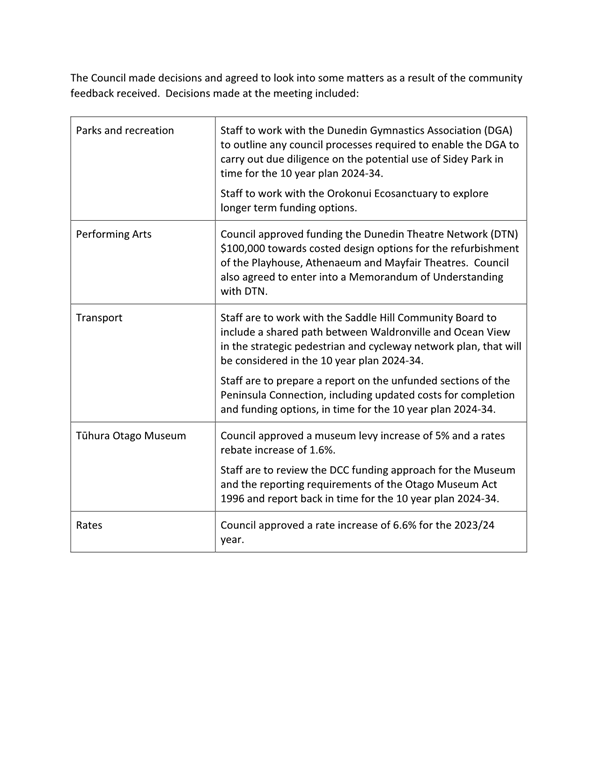




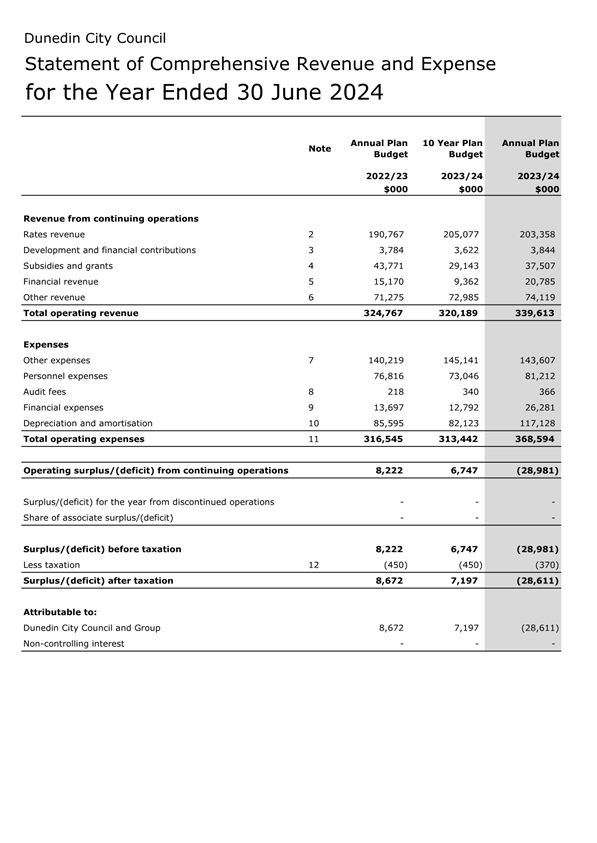
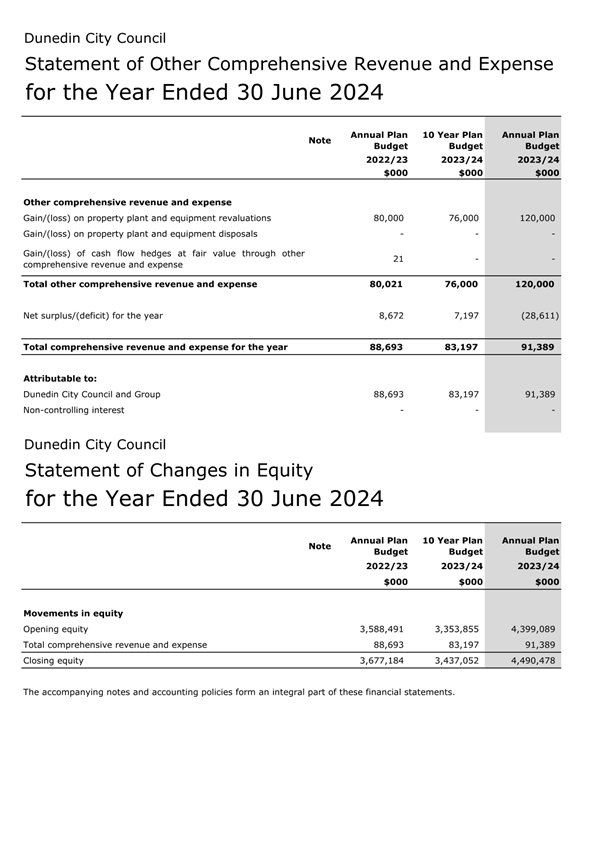
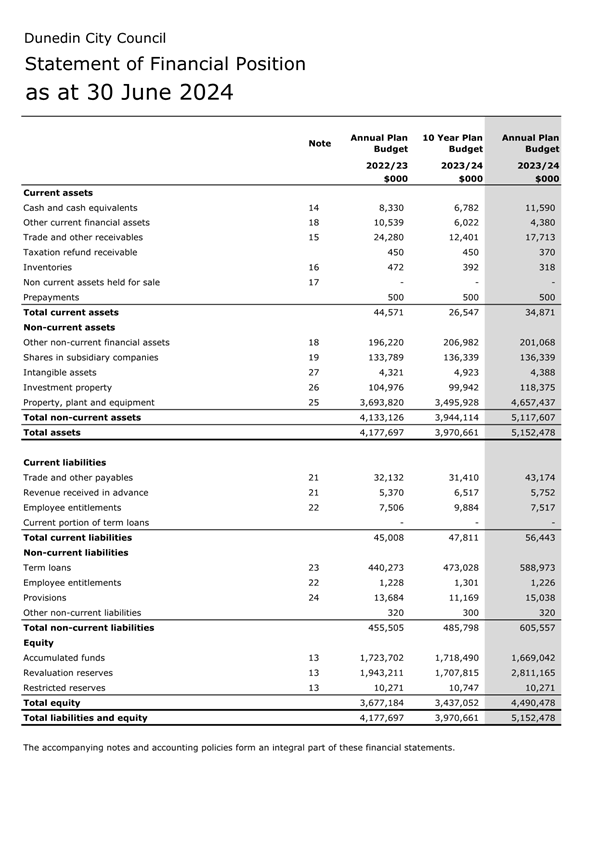

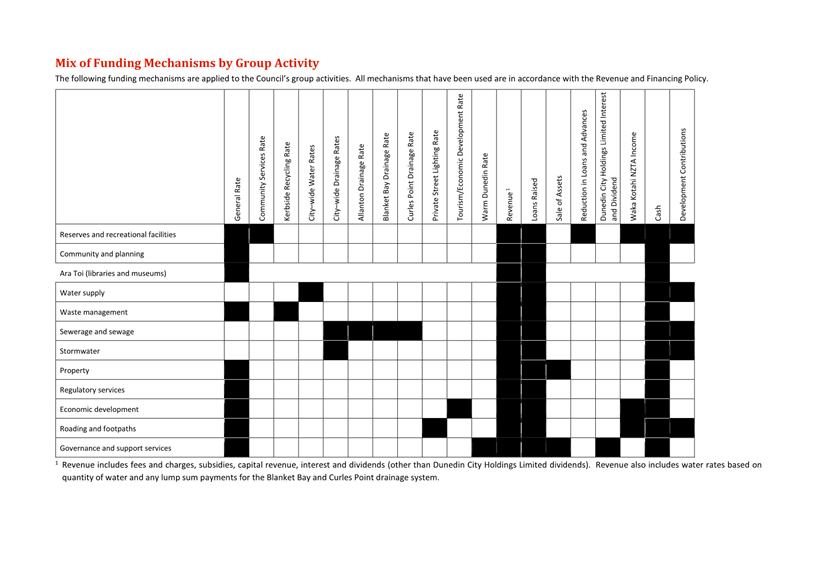
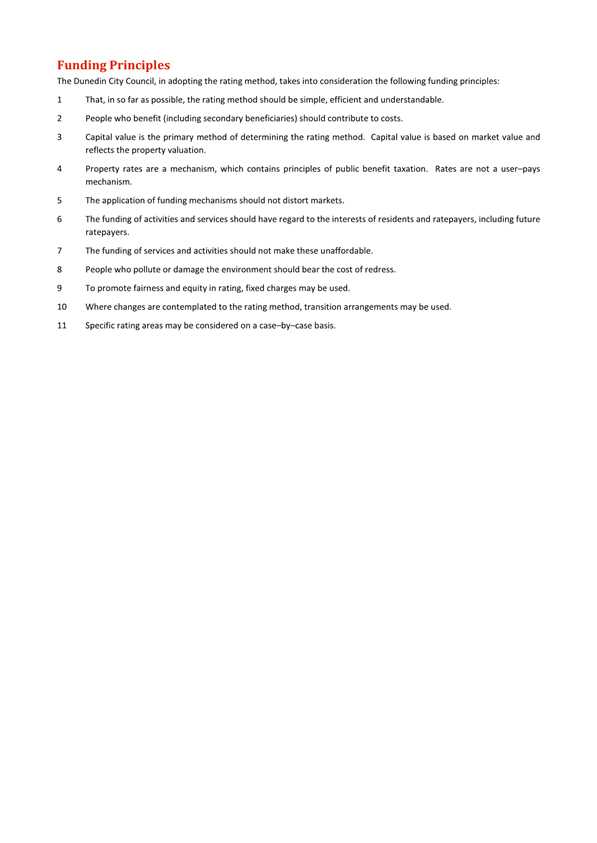
|

|
Council
27 June 2023
|
Setting of Rates for the 2023/24 Financial
Year
Department: Finance
EXECUTIVE SUMMARY
1 Following
adoption of the Annual Plan 2023/24, the Council now needs to set the rates as
provided for in the Funding Impact Statement for the 2023/24 year.
|
RECOMMENDATIONS
That the Council:
a) Sets the following rates under the Local Government (Rating)
Act 2002 on rating units in the district for the financial year commencing 1
July 2023 and ending on 30 June 2024.
1 General
Rate
A general rate set under section 13 of the Local
Government (Rating) Act 2002 made on every rating unit, assessed on a
differential basis as described below:
· A
rate of 0.2566 cents in the dollar (including GST) of capital value on every
rating unit in the "residential" category.
· A
rate of 0.2438 cents in the dollar (including GST) of capital value on every
rating unit in the "lifestyle" category.
· A
rate of 0.6338 cents in the dollar (including GST) of capital value on every
rating unit in the "commercial" category.
· A
rate of 0.4490 cents in the dollar (including GST) of capital value on every
rating unit in the "residential heritage bed and breakfasts"
category.
· A
rate of 0.2053 cents in the dollar (including GST) of capital value on every
rating unit in the "farmland" category.
· A
rate of 0.0508 cents in the dollar (including GST) of capital value on the
“stadium: 10,000+ seat capacity” category.
2 Community
Services Rate
A targeted rate for community services, set under section
16 of the Local Government (Rating) Act 2002, assessed on a differential
basis as follows:
· $111.50
(including GST) per separately used or inhabited part of a rating unit for
all rating units in the "residential, residential heritage bed and
breakfasts, lifestyle and farmland" categories.
· $111.50
(including GST) per rating unit for all rating units in the "commercial
and stadium: 10,000+ seat capacity" categories.
3 Kerbside
Recycling Rate
A targeted rate for kerbside recycling, set under section
16 of the Local Government (Rating) Act 2002, assessed on a differential
basis as follows:
· $106.10
(including GST) per separately used or inhabited part of a rating unit for
rating units in the "residential, residential heritage bed and
breakfasts, lifestyle and farmland" categories.
· $106.10
(including GST) per rating unit for rating units in the
"commercial" category.
4 Drainage
Rates
A targeted rate for drainage, set under section 16 of the
Local Government (Rating) Act 2002, assessed on a differential basis as
follows:
· $683.00
(including GST) per separately used or inhabited part of a rating unit for
all rating units in the "residential, residential heritage bed and
breakfasts, lifestyle and farmland" categories and which are
"connected" to the public sewerage system.
· $341.50
(including GST) per separately used or inhabited part of a rating unit for
all rating units in the "residential, residential heritage bed and
breakfasts, lifestyle and farmland" categories and which are
"serviceable" by the public sewerage system.
· $683.00
(including GST) per rating unit for all rating units in the "commercial,
residential institutions, schools and stadium: 10,000+ seat capacity"
categories and which are "connected" to the public sewerage system.
· $341.50
(including GST) per rating unit for all rating units in the "commercial,
residential institutions and schools" categories and which are
"serviceable" by the public sewerage system.
· $102.25
(including GST) per rating unit for all rating units in the "church"
category and which are "connected" to the public sewerage system.
Rating units which are not "connected" to the
scheme and which are not "serviceable" will not be liable for this
rate. Drainage is a combined targeted rate for sewage disposal and
stormwater. Sewage disposal makes up 78% of the drainage rate, and
stormwater makes up 22%. Non-rateable land will not be liable for the
stormwater component of the drainage targeted rate. Rates demands for
the drainage targeted rate for non-rateable land will therefore be charged at
78%.
5 Commercial
Drainage Rates – Capital Value
A targeted rate for drainage, set under section 16 of the
Local Government (Rating) Act 2002, assessed on a differential basis as
follows:
· A
rate of 0.2354 cents in the dollar (including GST) of capital value on every
rating unit in the "commercial and residential institution"
category and which are "connected" to the public sewerage system.
· A
rate of 0.1177 cents in the dollar (including GST) of capital value on every rating
unit in the "commercial" category and which are
"serviceable" by the public sewerage system.
· A
rate of 0.1766 cents in the dollar (including GST) of capital value on every
rating unit in the "school" category and which are
"connected" to the public sewerage system.
· A
rate of 0.0883 cents in the dollar (including GST) of capital value on every
rating unit in the "school" category and which are
"serviceable" by the public sewerage system.
· A
rate of 0.0190 cents in the dollar (including GST) of capital value on the
“stadium: 10,000+ seat capacity” category.
This rate shall not apply to properties in Karitane,
Middlemarch, Seacliff, Waikouaiti and Warrington. This rate shall not
apply to churches. Drainage is a combined targeted rate for sewage disposal
and stormwater. Sewage disposal makes up 78% of the drainage rate, and
stormwater makes up 22%. Non-rateable land will not be liable for the
stormwater component of the drainage targeted rate. Rates demands for
the drainage targeted rate for non-rateable land will therefore be charged at
78%.
6 Water
Rates
A targeted rate for water supply, set under section 16 of
the Local Government (Rating) Act 2002, assessed on a differential basis as
follows:
· $517.00
(including GST) per separately used or inhabited part of any
"connected" rating unit which receives an ordinary supply of water
within the meaning of the Dunedin City Bylaws excepting properties in
Karitane, Merton, Rocklands/Pukerangi, Seacliff, Waitati, Warrington, East
Taieri, West Taieri and North Taieri.
· $258.50
(including GST) per separately used or inhabited part of any
"serviceable" rating unit to which connection is available to
receive an ordinary supply of water within the meaning of the Dunedin City
Bylaws excepting properties in Karitane, Merton, Rocklands/Pukerangi,
Seacliff, Waitati, Warrington, East Taieri, West Taieri and North Taieri.
· $517.00
(including GST) per unit of water being one cubic metre (viz.
1,000 litres) per day supplied at a constant rate of flow during a full
24 hour period to any "connected" rating unit situated in
Karitane, Merton, Seacliff, Waitati, Warrington, West Taieri, East Taieri or
North Taieri.
· $258.50
(including GST) per separately used or inhabited part of any
"serviceable" rating unit situated in Waitati, Warrington, West
Taieri, East Taieri or North Taieri. This rate shall not apply to the
availability of water in Merton, Karitane or Seacliff.
7 Fire
Protection Rates
A targeted rate for the provision of a fire protection
service, set under section 16 of the Local Government (Rating) Act 2002,
assessed on a differential basis as follows:
· A
rate of 0.0670 cents in the dollar (including GST) of capital value on all
rating units in the "commercial" category. This rate shall
not apply to churches.
· A
rate of 0.0503 cents in the dollar (including GST) of capital value on all
rating units in the "residential institutions" category.
· A
rate of 0.0077 cents in the dollar (including GST) of capital value on the
“stadium: 10,000+ seat capacity” category.
· $155.10
(including GST) for each separately used or inhabited part of a rating unit
within the "residential, residential heritage bed and breakfasts,
lifestyle and farmland" category that is not receiving an ordinary
supply of water within the meaning of the Dunedin City Bylaws.
8 Water
Rates – Quantity of Water
A targeted rate for the quantity of water provided to any
rating unit fitted with a water meter, being an extraordinary supply of water
within the meaning of the Dunedin City Bylaws, set under section 19 of the
Local Government (Rating) Act 2002, according to the following scale of
charges (GST inclusive):
|
|
Annual Meter Rental
Charge
|
|
20mm nominal diameter
|
$166.57
|
|
25mm nominal diameter
|
$213.85
|
|
30mm nominal diameter
|
$237.49
|
|
40mm nominal diameter
|
$268.99
|
|
50mm nominal diameter
|
$544.75
|
|
80mm nominal diameter
|
$673.05
|
|
100mm nominal diameter
|
$710.20
|
|
150mm nominal diameter
|
$1,020.83
|
|
300mm nominal diameter
|
$1,324.72
|
|
70mm Hydrant Standpipe
|
$659.55
|
|
Reconnection Fee – includes the removal of
water restrictors installed due to non-compliance of the water bylaw
|
$464.25
|
|
Special Reading Fee
|
$63.09
|
|
|
Backflow Prevention Charge
|
|
Backflow Preventer
Test Fee
|
$115.04
|
|
Rescheduled Backflow
Preventer Test Fee
|
$65.36
|
|
Backflow Programme - incomplete application fee
(hourly rate)
|
$46.20
|
|
|
Water Charge
|
|
Merton, Hindon and individual farm supplied Bulk
Raw Water Tariff
|
$0.11 per cubic metre
|
|
All other treated water per cubic metre
|
$1.93 per cubic metre
|
|
|
Network Contributions
|
|
Disconnection of Water Supply – AWSCI to
excavate
|
$258.53
|
|
Disconnection of Water Supply – DCC
contractor to excavate
|
$1,012.95
|
Where the supply of a quantity of water is subject
to this Quantity of Water Targeted Rate, the rating unit will not be liable
for any other targeted rate for the supply of the same water.
9 Allanton
Drainage Rate
A targeted rate for the capital contribution towards the
Allanton Wastewater Collection System, set under section 16 of the Local
Government (Rating) Act 2002, of $411.00 (including GST) per rating unit, to
every rating unit paying their contribution towards the scheme as a targeted
rate over 20 years. Liability for the rate is on the basis of the
provision of the service to each rating unit. The Allanton area is
shown in the map below:
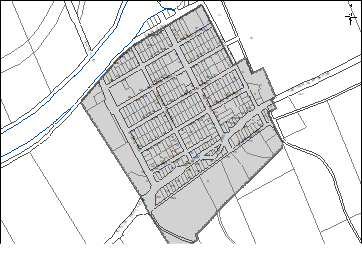
10 Blanket
Bay Drainage Rate
A targeted rate for the capital contribution towards the
Blanket Bay Drainage System, set under section 16 of the Local Government
(Rating) Act 2002, of $636.00 (including GST) per rating unit, to every
rating unit paying their contribution towards the scheme as a targeted rate over
20 years. Liability for the rate is on the basis of the provision
of the service to each rating unit. The Blanket Bay area is shown in
the map below:
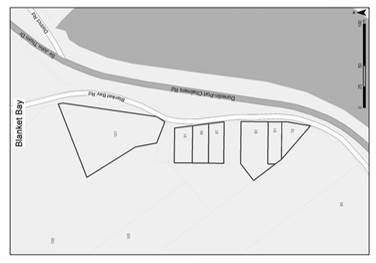
11 Curles
Point Drainage Rate
A targeted rate for the capital contribution towards the
Curles Point Drainage System, set under section 16 of the Local Government
(Rating) Act 2002, of $749.00 (including GST) per rating unit, to every
rating unit paying their contribution towards the scheme as a targeted rate
over 20 years. Liability for the rate is on the basis of the
provision of the service to each rating unit. The Curles Point area is
shown in the map below:
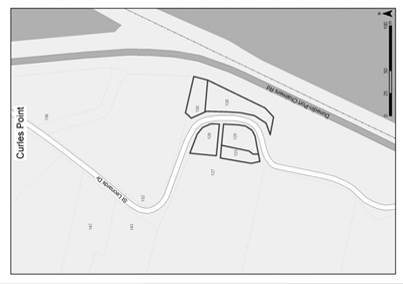
12 Tourism/Economic
Development Rate
A targeted rate for Tourism/Economic Development, set
under section 16 of the Local Government (Rating) Act 2002, assessed on
a differential basis as follows:
· 0.0087
cents in the dollar (including GST) of capital value on every rating unit in
the "commercial" category.
· 0.0011
cents in the dollar (including GST) of capital value on the “stadium:
10,000+ seat capacity” category.
13 Warm
Dunedin Targeted Rate Scheme
A targeted rate for the Warm Dunedin Targeted Rate
Scheme, set under section 16 of the Local Government (Rating) Act 2002, per
rating unit in the Warm Dunedin Targeted Rate Scheme.
The targeted rate scheme provides a way for homeowners to
install insulation and/or clean heating. The targeted rate covers the
cost and an annual interest rate. The interest rates have been and will
be:
Rates commencing 1 July 2013 and 1 July 2014 8%
Rates commencing 1 July 2015 and 1 July 2016 8.3%
Rates commencing 1 July 2017 7.8%
Rates commencing 1 July 2018 7.2%
Rates commencing 1 July 2019 6.8%
Rates commencing 1 July 2020 5.7%
Rates commencing 1 July 2021 4.4%
14 Private
Street Lighting Rate
A targeted rate for the purpose of
recovering the cost of private street lights, set under section 16 of the
Local Government (Rating) Act 2002, assessed on a differential basis as
follows:
· $156.80
(including GST) per private street light divided by the number of separately
used or inhabited parts of a rating unit for all rating units in the
"residential and lifestyle" categories in the private streets as
identified in the schedule below.
· $156.80
(including GST) per private street light divided by the number of rating
units for all rating units in the "commercial" category in the
private streets as identified in the schedule below.
|
1
|
Achilles Avenue
|
|
3
|
Balmoral Avenue
Mosgiel
|
|
1
|
Alton Avenue
|
|
4
|
Balmoral Avenue
Mosgiel
|
|
2
|
Alton Avenue
|
|
5
|
Balmoral Avenue
Mosgiel
|
|
2A
|
Alton Avenue
|
|
6
|
Balmoral Avenue
Mosgiel
|
|
3
|
Alton Avenue
|
|
7
|
Balmoral Avenue
Mosgiel
|
|
4
|
Alton Avenue
|
|
8
|
Balmoral Avenue
Mosgiel
|
|
5
|
Alton Avenue
|
|
9
|
Balmoral Avenue
Mosgiel
|
|
6
|
Alton Avenue
|
|
10
|
Balmoral Avenue
Mosgiel
|
|
7
|
Alton Avenue
|
|
11
|
Balmoral Avenue
Mosgiel
|
|
8
|
Alton Avenue
|
|
12
|
Balmoral Avenue
Mosgiel
|
|
9
|
Alton Avenue
|
|
17
|
Balmoral Avenue
Mosgiel
|
|
7
|
Angle Avenue
|
|
19
|
Barclay Street
|
|
9
|
Angle Avenue
|
|
211
|
Bay View Road
|
|
11
|
Angle Avenue
|
|
211A
|
Bay View Road
|
|
20
|
Angle Avenue
|
|
211B
|
Bay View Road
|
|
22
|
Angle Avenue
|
|
1
|
Beaufort Street
|
|
24
|
Angle Avenue
|
|
3
|
Beaufort Street
|
|
43
|
Arawa Street
|
|
119
|
Belford Street
|
|
47
|
Arawa Street
|
|
12
|
Bell Crescent
Green Island
|
|
17
|
Awa Toru Drive
Fairfield
|
|
14
|
Bell Crescent
Green Island
|
|
19
|
Awa Toru Drive
Fairfield
|
|
24
|
Bell Crescent
Green Island
|
|
21
|
Awa Toru Drive
Fairfield
|
|
26
|
Bell Crescent
Green Island
|
|
23
|
Awa Toru Drive
Fairfield
|
|
12
|
Bewley Avenue
Macandrew Bay
|
|
25
|
Awa Toru Drive
Fairfield
|
|
14
|
Bewley Avenue
Macandrew Bay
|
|
27
|
Awa Toru Drive
Fairfield
|
|
7
|
Bishop Verdon
Close Mosgiel
|
|
29
|
Awa Toru Drive
Fairfield
|
|
9
|
Bishop Verdon
Close Mosgiel
|
|
31
|
Awa Toru Drive
Fairfield
|
|
10
|
Bishop Verdon
Close Mosgiel
|
|
33
|
Awa Toru Drive
Fairfield
|
|
11
|
Bishop Verdon
Close Mosgiel
|
|
35
|
Awa Toru Drive Fairfield
|
|
12
|
Bishop Verdon
Close Mosgiel
|
|
37
|
Awa Toru Drive
Fairfield
|
|
8
|
Bonnington
Street
|
|
39
|
Awa Toru Drive
Fairfield
|
|
8a
|
Bonnington
Street
|
|
41
|
Awa Toru Drive
Fairfield
|
|
10
|
Bonnington
Street
|
|
43
|
Awa Toru Drive
Fairfield
|
|
20K
|
Brighton Road
Green Island
|
|
45
|
Awa Toru Drive
Fairfield
|
|
20J
|
Brighton Road
Green Island
|
|
47
|
Awa Toru Drive
Fairfield
|
|
20H
|
Brighton Road
Green Island
|
|
49
|
Awa Toru Drive
Fairfield
|
|
20G
|
Brighton Road
Green Island
|
|
60
|
Balmacewen Road
|
|
20F
|
Brighton Road
Green Island
|
|
60B
|
Balmacewen Road
|
|
20E
|
Brighton Road
Green Island
|
|
62
|
Balmacewen Road
|
|
20D
|
Brighton Road
Green Island
|
|
64
|
Balmacewen Road
|
|
20C
|
Brighton Road
Green Island
|
|
1
|
Balmoral Avenue
Mosgiel
|
|
20B
|
Brighton Road
Green Island
|
|
2
|
Balmoral Avenue
Mosgiel
|
|
20A
|
Brighton Road
Green Island
|
|
20
|
Brighton Road
Green Island
|
|
12
|
Carnea Heights
Mosgiel
|
|
34
|
Burgess Street
Green Island
|
|
22
|
Centennial
Avenue Fairfield
|
|
36
|
Burgess Street
Green Island
|
|
24
|
Centennial
Avenue Fairfield
|
|
38
|
Burgess Street
Green Island
|
|
26
|
Centennial
Avenue Fairfield
|
|
40
|
Burgess Street
Green Island
|
|
28
|
Centennial
Avenue Fairfield
|
|
42
|
Burgess Street
Green Island
|
|
150
|
Chapman Street
|
|
44
|
Burgess Street
Green Island
|
|
150A
|
Chapman Street
|
|
46
|
Burgess Street
Green Island
|
|
152
|
Chapman Street
|
|
48
|
Burgess Street
Green Island
|
|
12
|
Clearwater
Street Broad Bay
|
|
50
|
Burgess Street
Green Island
|
|
14
|
Clearwater
Street Broad Bay
|
|
8
|
Burkes Drive
Ravensbourne
|
|
16
|
Clearwater
Street Broad Bay
|
|
10
|
Burkes Drive
Ravensbourne
|
|
18
|
Clearwater
Street Broad Bay
|
|
181
|
Burt Street
|
|
20
|
Clearwater
Street Broad Bay
|
|
183
|
Burt Street
|
|
22
|
Clearwater
Street Broad Bay
|
|
185
|
Burt Street
|
|
24
|
Clearwater
Street Broad Bay
|
|
7
|
Bush Road
Mosgiel
|
|
26
|
Clearwater
Street Broad Bay
|
|
80
|
Caldwell Street
|
|
28
|
Clearwater
Street Broad Bay
|
|
82
|
Caldwell Street
|
|
30
|
Clearwater
Street Broad Bay
|
|
1
|
Campbell Lane
Mosgiel
|
|
32
|
Clearwater
Street Broad Bay
|
|
4
|
Campbell Lane
Mosgiel
|
|
34
|
Clearwater
Street Broad Bay
|
|
5
|
Campbell Lane
Mosgiel
|
|
36
|
Clearwater
Street Broad Bay
|
|
6
|
Campbell Lane
Mosgiel
|
|
22
|
Cole Street
|
|
7
|
Campbell Lane
Mosgiel
|
|
11
|
Corstorphine
Road
|
|
8
|
Campbell Lane
Mosgiel
|
|
11A
|
Corstorphine
Road
|
|
9
|
Campbell Lane
Mosgiel
|
|
13
|
Corstorphine
Road
|
|
10
|
Campbell Lane
Mosgiel
|
|
15
|
Corstorphine
Road
|
|
11
|
Campbell Lane
Mosgiel
|
|
17
|
Corstorphine
Road
|
|
12
|
Campbell Lane
Mosgiel
|
|
21
|
Corstorphine
Road
|
|
13
|
Campbell Lane
Mosgiel
|
|
23
|
Corstorphine
Road
|
|
14
|
Campbell Lane
Mosgiel
|
|
25
|
Corstorphine
Road
|
|
15
|
Campbell Lane
Mosgiel
|
|
11
|
Craighall
Crescent
|
|
30
|
Cardigan Street
North East Valley
|
|
15
|
Craighall Crescent
|
|
32
|
Cardigan Street
North East Valley
|
|
1
|
Dalkeith Road
Port Chalmers
|
|
34
|
Cardigan Street
North East Valley
|
|
2
|
Dalkeith Road
Port Chalmers
|
|
36
|
Cardigan Street
North East Valley
|
|
4
|
Dalkeith Road
Port Chalmers
|
|
3
|
Carnea Heights
Mosgiel
|
|
6
|
Dalkeith Road
Port Chalmers
|
|
4
|
Carnea Heights
Mosgiel
|
|
8
|
Dalkeith Road
Port Chalmers
|
|
5
|
Carnea Heights
Mosgiel
|
|
10
|
Dalkeith Road
Port Chalmers
|
|
6
|
Carnea Heights
Mosgiel
|
|
12
|
Dalkeith Road
Port Chalmers
|
|
7
|
Carnea Heights
Mosgiel
|
|
21
|
Davies Street
|
|
8
|
Carnea Heights
Mosgiel
|
|
22
|
Davies Street
|
|
10
|
Carnea Heights
Mosgiel
|
|
1
|
Devon Place
Mosgiel
|
|
2
|
Devon Place
Mosgiel
|
|
19
|
Duckworth
Street
|
|
3
|
Devon Place
Mosgiel
|
|
21
|
Duckworth
Street
|
|
4
|
Devon Place
Mosgiel
|
|
35
|
Duckworth
Street
|
|
5
|
Devon Place
Mosgiel
|
|
37
|
Duckworth
Street
|
|
6
|
Devon Place
Mosgiel
|
|
39
|
Duckworth
Street
|
|
7
|
Devon Place
Mosgiel
|
|
39a
|
Duckworth
Street
|
|
9
|
Devon Place
Mosgiel
|
|
41
|
Duckworth
Street
|
|
10
|
Devon Place
Mosgiel
|
|
47
|
Duckworth
Street
|
|
11
|
Devon Place
Mosgiel
|
|
49
|
Duckworth
Street
|
|
12
|
Devon Place
Mosgiel
|
|
53
|
Duckworth
Street
|
|
13
|
Devon Place
Mosgiel
|
|
|
Dunedin Airport
|
|
14
|
Devon Place
Mosgiel
|
|
1 – 31
|
Eastbourne
Street
|
|
15
|
Devon Place
Mosgiel
|
|
2 – 31
|
Eastbourne
Street
|
|
16
|
Devon Place
Mosgiel
|
|
3 – 31
|
Eastbourne
Street
|
|
17
|
Devon Place
Mosgiel
|
|
4 – 31
|
Eastbourne
Street
|
|
18
|
Devon Place
Mosgiel
|
|
5 – 31
|
Eastbourne
Street
|
|
19
|
Devon Place
Mosgiel
|
|
6 – 31
|
Eastbourne
Street
|
|
20
|
Devon Place
Mosgiel
|
|
7 – 31
|
Eastbourne
Street
|
|
21
|
Devon Place
Mosgiel
|
|
8 – 31
|
Eastbourne
Street
|
|
20
|
District Road
Roseneath
|
|
9 – 31
|
Eastbourne
Street
|
|
24
|
District Road
Roseneath
|
|
10 – 31
|
Eastbourne
Street
|
|
24A
|
District Road
Roseneath
|
|
11 – 31
|
Eastbourne
Street
|
|
139b
|
Doon Street
|
|
12 – 31
|
Eastbourne
Street
|
|
139a
|
Doon Street
|
|
13 – 31
|
Eastbourne
Street
|
|
139
|
Doon Street
|
|
14 – 31
|
Eastbourne
Street
|
|
141
|
Doon Street
|
|
15 – 31
|
Eastbourne
Street
|
|
143
|
Doon Street
|
|
16 – 31
|
Eastbourne
Street
|
|
145
|
Doon Street
|
|
17 – 31
|
Eastbourne
Street
|
|
149
|
Doon Street
|
|
18 – 31
|
Eastbourne
Street
|
|
151
|
Doon Street
|
|
19 – 31
|
Eastbourne
Street
|
|
5
|
Dorset Street
|
|
20 – 31
|
Eastbourne
Street
|
|
7
|
Dorset Street
|
|
21 – 31
|
Eastbourne
Street
|
|
10
|
Dorset Street
|
|
22 – 31
|
Eastbourne
Street
|
|
11
|
Dorset Street
|
|
23 – 31
|
Eastbourne
Street
|
|
12
|
Dorset Street
|
|
24 – 31
|
Eastbourne
Street
|
|
14
|
Dorset Street
|
|
25 – 31
|
Eastbourne
Street
|
|
15
|
Dorset Street
|
|
26 – 31
|
Eastbourne
Street
|
|
16
|
Dorset Street
|
|
27 – 31
|
Eastbourne
Street
|
|
18
|
Dorset Street
|
|
28 – 31
|
Eastbourne
Street
|
|
20
|
Dorset Street
|
|
29 – 31
|
Eastbourne
Street
|
|
21
|
Dorset Street
|
|
30 – 31
|
Eastbourne
Street
|
|
17
|
Duckworth
Street
|
|
31 – 31
|
Eastbourne
Street
|
|
32 – 31
|
Eastbourne
Street
|
|
20
|
Eton Drive
Mosgiel
|
|
33 – 31
|
Eastbourne
Street
|
|
2
|
Everton Road
|
|
34 – 31
|
Eastbourne
Street
|
|
3
|
Everton Road
|
|
35 – 31
|
Eastbourne Street
|
|
4
|
Everton Road
|
|
36 – 31
|
Eastbourne
Street
|
|
64
|
Every Street
|
|
37 – 31
|
Eastbourne
Street
|
|
66
|
Every Street
|
|
38 – 31
|
Eastbourne
Street
|
|
68
|
Every Street
|
|
39 – 31
|
Eastbourne
Street
|
|
70
|
Every Street
|
|
40 – 31
|
Eastbourne
Street
|
|
76
|
Every Street
|
|
41 – 31
|
Eastbourne
Street
|
|
7
|
Fern Road
Ravensbourne
|
|
42 – 31
|
Eastbourne
Street
|
|
9
|
Fern Road
Ravensbourne
|
|
43 – 31
|
Eastbourne
Street
|
|
11
|
Fern Road
Ravensbourne
|
|
46 – 31
|
Eastbourne
Street
|
|
13
|
Fern Road
Ravensbourne
|
|
47 – 31
|
Eastbourne
Street
|
|
15
|
Fern Road Ravensbourne
|
|
50 – 31
|
Eastbourne
Street
|
|
17
|
Fern Road
Ravensbourne
|
|
51 – 31
|
Eastbourne
Street
|
|
19
|
Fern Road
Ravensbourne
|
|
8
|
Echovale Avenue
|
|
21
|
Fern Road
Ravensbourne
|
|
10
|
Echovale Avenue
|
|
19
|
Ferntree Drive
|
|
12
|
Echovale Avenue
|
|
21
|
Ferntree Drive
|
|
45
|
Eglinton Road
|
|
23
|
Ferntree Drive
|
|
2
|
Elbe Street
|
|
25
|
Ferntree Drive
|
|
202
|
Elgin Road
|
|
43
|
Forfar Street
|
|
204
|
Elgin Road
|
|
45
|
Forfar Street
|
|
206
|
Elgin Road
|
|
47
|
Forfar Street
|
|
208
|
Elgin Road
|
|
47a
|
Forfar Street
|
|
1
|
Eton Drive
Mosgiel
|
|
49
|
Forfar Street
|
|
4
|
Eton Drive
Mosgiel
|
|
51
|
Forfar Street
|
|
5
|
Eton Drive
Mosgiel
|
|
53
|
Forfar Street
|
|
6
|
Eton Drive
Mosgiel
|
|
53a
|
Forfar Street
|
|
7
|
Eton Drive
Mosgiel
|
|
2 – 80
|
Formby Street
Outram
|
|
8
|
Eton Drive
Mosgiel
|
|
3 – 80
|
Formby Street
Outram
|
|
9
|
Eton Drive
Mosgiel
|
|
4 – 80
|
Formby Street
Outram
|
|
10
|
Eton Drive
Mosgiel
|
|
5 – 80
|
Formby Street
Outram
|
|
11
|
Eton Drive
Mosgiel
|
|
6 – 80
|
Formby Street
Outram
|
|
12
|
Eton Drive
Mosgiel
|
|
7 – 80
|
Formby Street
Outram
|
|
13
|
Eton Drive
Mosgiel
|
|
8 – 80
|
Formby Street
Outram
|
|
14
|
Eton Drive Mosgiel
|
|
10 – 80
|
Formby Street
Outram
|
|
15
|
Eton Drive
Mosgiel
|
|
12 – 80
|
Formby Street
Outram
|
|
16
|
Eton Drive
Mosgiel
|
|
13 – 80
|
Formby Street
Outram
|
|
17
|
Eton Drive
Mosgiel
|
|
14 – 80
|
Formby Street
Outram
|
|
18
|
Eton Drive
Mosgiel
|
|
15 – 80
|
Formby Street
Outram
|
|
19
|
Eton Drive
Mosgiel
|
|
16 – 80
|
Formby Street
Outram
|
|
17 – 80
|
Formby Street
Outram
|
|
8A
|
Glenfinnan
Place
|
|
18 – 80
|
Formby Street
Outram
|
|
8B
|
Glenfinnan
Place
|
|
19 – 80
|
Formby Street
Outram
|
|
9A
|
Glenfinnan
Place
|
|
20 – 80
|
Formby Street
Outram
|
|
9B
|
Glenfinnan Place
|
|
239
|
Fryatt Street
|
|
10A
|
Glenfinnan
Place
|
|
248
|
George Street
|
|
10B
|
Glenfinnan
Place
|
|
559
|
George Street
|
|
1
|
Glengarry Court
Mosgiel
|
|
150A
|
Gladstone Road
North Mosgiel
|
|
2
|
Glengarry Court
Mosgiel
|
|
150B
|
Gladstone Road
North Mosgiel
|
|
3
|
Glengarry Court
Mosgiel
|
|
150C
|
Gladstone Road
North Mosgiel
|
|
4
|
Glengarry Court
Mosgiel
|
|
150D
|
Gladstone Road
North Mosgiel
|
|
5
|
Glengarry Court
Mosgiel
|
|
150E
|
Gladstone Road
North Mosgiel
|
|
6
|
Glengarry Court
Mosgiel
|
|
152B
|
Gladstone Road
North Mosgiel
|
|
7
|
Glengarry Court
Mosgiel
|
|
152C
|
Gladstone Road
North Mosgiel
|
|
8
|
Glengarry Court
Mosgiel
|
|
152D
|
Gladstone Road
North Mosgiel
|
|
9
|
Glengarry Court
Mosgiel
|
|
152E
|
Gladstone Road
North Mosgiel
|
|
10
|
Glengarry Court
Mosgiel
|
|
154A
|
Gladstone Road
North Mosgiel
|
|
11
|
Glengarry Court
Mosgiel
|
|
214
|
Gladstone Road
North Mosgiel
|
|
12
|
Glengarry Court
Mosgiel
|
|
216
|
Gladstone Road
North Mosgiel
|
|
13
|
Glengarry Court
Mosgiel
|
|
218
|
Gladstone Road
North Mosgiel
|
|
14
|
Glengarry Court
Mosgiel
|
|
220
|
Gladstone Road
North Mosgiel
|
|
15
|
Glengarry Court
Mosgiel
|
|
222
|
Gladstone Road
North Mosgiel
|
|
16
|
Glengarry Court
Mosgiel
|
|
224
|
Gladstone Road
North Mosgiel
|
|
17
|
Glengarry Court
Mosgiel
|
|
226
|
Gladstone Road
North Mosgiel
|
|
18
|
Glengarry Court
Mosgiel
|
|
228
|
Gladstone Road
North Mosgiel
|
|
19
|
Glengarry Court
Mosgiel
|
|
230
|
Gladstone Road
North Mosgiel
|
|
20
|
Glengarry Court
Mosgiel
|
|
232
|
Gladstone Road
North Mosgiel
|
|
21
|
Glengarry Court
Mosgiel
|
|
234
|
Gladstone Road
North Mosgiel
|
|
22
|
Glengarry Court
Mosgiel
|
|
39
|
Glenbrook Drive
Mosgiel
|
|
23
|
Glengarry Court
Mosgiel
|
|
41
|
Glenbrook Drive
Mosgiel
|
|
24
|
Glengarry Court
Mosgiel
|
|
45
|
Glenbrook Drive
Mosgiel
|
|
48
|
Glenross Street
|
|
47
|
Glenbrook Drive
Mosgiel
|
|
50
|
Glenross Street
|
|
49
|
Glenbrook Drive
Mosgiel
|
|
54
|
Glenross Street
|
|
51
|
Glenbrook Drive
Mosgiel
|
|
56
|
Glenross Street
|
|
57
|
Glenbrook Drive
Mosgiel
|
|
58
|
Glenross Street
|
|
1
|
Glenfinnan
Place
|
|
60
|
Glenross Street
|
|
3
|
Glenfinnan
Place
|
|
110
|
Glenross Street
|
|
4A
|
Glenfinnan
Place
|
|
114
|
Glenross Street
|
|
4B
|
Glenfinnan
Place
|
|
116
|
Glenross Street
|
|
5
|
Glenfinnan
Place
|
|
230
|
Gordon Road Mosgiel
|
|
6
|
Glenfinnan
Place
|
|
229
|
Gordon Road
Mosgiel
|
|
7
|
Glenfinnan
Place
|
|
34
|
Grandview
Crescent
|
|
10
|
Halsey Street
|
|
313
|
Highcliff Road
|
|
1
|
Hampton Grove
Mosgiel
|
|
315a
|
Highcliff Road
|
|
2
|
Hampton Grove
Mosgiel
|
|
315b
|
Highcliff Road
|
|
3
|
Hampton Grove Mosgiel
|
|
317
|
Highcliff Road
|
|
4
|
Hampton Grove
Mosgiel
|
|
16
|
Highgate
|
|
5
|
Hampton Grove
Mosgiel
|
|
18
|
Highgate
|
|
6
|
Hampton Grove
Mosgiel
|
|
20
|
Highgate
|
|
7
|
Hampton Grove
Mosgiel
|
|
34a
|
Highgate
|
|
8
|
Hampton Grove
Mosgiel
|
|
34
|
Highgate
|
|
9
|
Hampton Grove
Mosgiel
|
|
216
|
Highgate
|
|
10
|
Hampton Grove
Mosgiel
|
|
218
|
Highgate
|
|
11
|
Hampton Grove
Mosgiel
|
|
144A
|
Highgate
|
|
12
|
Hampton Grove
Mosgiel
|
|
144B
|
Highgate
|
|
14
|
Hampton Grove
Mosgiel
|
|
146
|
Highgate
|
|
15
|
Hampton Grove
Mosgiel
|
|
146A
|
Highgate
|
|
16
|
Hampton Grove
Mosgiel
|
|
148
|
Highgate
|
|
17
|
Hampton Grove
Mosgiel
|
|
2
|
Hill Road
Warrington
|
|
18
|
Hampton Grove
Mosgiel
|
|
26
|
Ings Avenue
|
|
19
|
Hampton Grove
Mosgiel
|
|
26A
|
Ings Avenue
|
|
20
|
Hampton Grove
Mosgiel
|
|
26B
|
Ings Avenue
|
|
21
|
Hampton Grove
Mosgiel
|
|
364
|
Kaikorai Valley
Road
|
|
22
|
Hampton Grove
Mosgiel
|
|
366
|
Kaikorai Valley
Road
|
|
23
|
Hampton Grove
Mosgiel
|
|
368
|
Kaikorai Valley
Road
|
|
24
|
Hampton Grove
Mosgiel
|
|
372
|
Kaikorai Valley
Road
|
|
25
|
Hampton Grove
Mosgiel
|
|
374
|
Kaikorai Valley
Road
|
|
26
|
Hampton Grove Mosgiel
|
|
9
|
Kilgour Street
|
|
4
|
Harold Street
|
|
11
|
Kilgour Street
|
|
12
|
Harold Street
|
|
15
|
Kilgour Street
|
|
215a
|
Helensburgh
Road
|
|
20
|
Kinvig Street
|
|
217a
|
Helensburgh
Road
|
|
22
|
Kinvig Street
|
|
217b
|
Helensburgh
Road
|
|
2
|
Koremata Street
Green Island
|
|
219
|
Helensburgh
Road
|
|
4
|
Koremata Street
Green Island
|
|
219a
|
Helensburgh
Road
|
|
12
|
Koremata Street
Green Island
|
|
219b
|
Helensburgh
Road
|
|
32
|
Koremata Street
Green Island
|
|
221
|
Helensburgh
Road
|
|
34
|
Koremata Street
Green Island
|
|
223
|
Helensburgh
Road
|
|
8
|
Langham Terrace
|
|
49
|
Highcliff Road
|
|
3
|
Lawson Street
|
|
49A
|
Highcliff Road
|
|
4
|
Leithton Close
|
|
51
|
Highcliff Road
|
|
6
|
Leithton Close
|
|
57
|
Highcliff Road
|
|
9
|
Leithton Close
|
|
295
|
Highcliff Road
|
|
10
|
Leithton Close
|
|
297
|
Highcliff Road
|
|
11
|
Leithton Close
|
|
14
|
Leithton Close
|
|
12
|
Lynwood Avenue
|
|
15
|
Leithton Close
|
|
12a
|
Lynwood Avenue
|
|
18
|
Leithton Close
|
|
12c
|
Lynwood Avenue
|
|
19
|
Leithton Close
|
|
14
|
Lynwood Avenue
|
|
21
|
Leithton Close
|
|
3
|
McAllister Lane
Mosgiel
|
|
22
|
Leithton Close
|
|
5
|
McAllister Lane
Mosgiel
|
|
23
|
Leithton Close
|
|
7
|
McAllister Lane
Mosgiel
|
|
26
|
Leithton Close
|
|
9
|
McAllister Lane
Mosgiel
|
|
27
|
Leithton Close
|
|
11
|
McAllister Lane
Mosgiel
|
|
28
|
Leithton Close
|
|
13
|
McAllister Lane
Mosgiel
|
|
29
|
Leithton Close
|
|
15
|
McAllister Lane
Mosgiel
|
|
32
|
Leithton Close
|
|
17
|
McAllister Lane
Mosgiel
|
|
33
|
Leithton Close
|
|
19
|
McAllister Lane
Mosgiel
|
|
36
|
Leithton Close
|
|
210
|
Main South Road
Green Island
|
|
5
|
Leven Street
|
|
1
|
Mallard Place
Mosgiel
|
|
2
|
Leyden Terrace
|
|
2
|
Mallard Place
Mosgiel
|
|
21
|
Lock Street
|
|
3
|
Mallard Place
Mosgiel
|
|
1-23
|
London Street
|
|
4
|
Mallard Place
Mosgiel
|
|
2-23
|
London Street
|
|
5
|
Mallard Place
Mosgiel
|
|
|
|
|
6
|
Mallard Place
Mosgiel
|
|
3-23
|
London Street
|
|
7
|
Mallard Place
Mosgiel
|
|
4-23
|
London Street
|
|
8
|
Mallard Place
Mosgiel
|
|
6-23
|
London Street
|
|
9
|
Mallard Place Mosgiel
|
|
7-23
|
London Street
|
|
10
|
Mallard Place
Mosgiel
|
|
8-23
|
London Street
|
|
11
|
Mallard Place
Mosgiel
|
|
9-23
|
London Street
|
|
12
|
Mallard Place
Mosgiel
|
|
10-23
|
London Street
|
|
13
|
Mallard Place
Mosgiel
|
|
11-23
|
London Street
|
|
14
|
Mallard Place
Mosgiel
|
|
12-23
|
London Street
|
|
15
|
Mallard Place
Mosgiel
|
|
13-23
|
London Street
|
|
11
|
Malvern Street
|
|
14-23
|
London Street
|
|
15
|
Malvern Street
|
|
15-23
|
London Street
|
|
17a
|
Malvern Street
|
|
16-23
|
London Street
|
|
30
|
Marne Street
|
|
17-23
|
London Street
|
|
32
|
Marne Street
|
|
18-23
|
London Street
|
|
42
|
Marne Street
|
|
19-23
|
London Street
|
|
44
|
Marne Street
|
|
25
|
London Street
|
|
46
|
Marne Street
|
|
1–25
|
London Street
|
|
48
|
Marne Street
|
|
2–25
|
London Street
|
|
50
|
Marne Street
|
|
3–25
|
London Street
|
|
2
|
Meldrum Street
|
|
8
|
Lynwood Avenue
|
|
10
|
Meldrum Street
|
|
10
|
Lynwood Avenue
|
|
33
|
Melville Street
|
|
14
|
Middleton Road
|
|
268A
|
Pine Hill Road
|
|
16
|
Middleton Road
|
|
268B
|
Pine Hill Road
|
|
18
|
Middleton Road
|
|
270
|
Pine Hill Road
|
|
20
|
Middleton Road
|
|
272
|
Pine Hill Road
|
|
22
|
Middleton Road
|
|
274
|
Pine Hill Road
|
|
24
|
Middleton Road
|
|
278A
|
Pine Hill Road
|
|
26
|
Middleton Road
|
|
278B
|
Pine Hill Road
|
|
28
|
Middleton Road
|
|
390
|
Pine Hill Road
|
|
30
|
Middleton Road
|
|
409
|
Pine Hill Road
|
|
37
|
Middleton Road
|
|
411
|
Pine Hill Road
|
|
37a
|
Middleton Road
|
|
5
|
Pinfold Place
Mosgiel
|
|
39
|
Middleton Road
|
|
6
|
Pinfold Place
Mosgiel
|
|
43
|
Middleton Road
|
|
8
|
Pinfold Place
Mosgiel
|
|
47a
|
Middleton Road
|
|
9
|
Pinfold Place
Mosgiel
|
|
19
|
Montague Street
|
|
10
|
Pinfold Place
Mosgiel
|
|
21
|
Montague Street
|
|
11
|
Pinfold Place
Mosgiel
|
|
23
|
Montague Street
|
|
12
|
Pinfold Place
Mosgiel
|
|
29
|
Moray Place
|
|
13
|
Pinfold Place
Mosgiel
|
|
407
|
Moray Place
|
|
14
|
Pinfold Place
Mosgiel
|
|
29
|
Musselburgh
Rise
|
|
15
|
Pinfold Place
Mosgiel
|
|
31
|
Musselburgh
Rise
|
|
30
|
Puketai Street
|
|
33
|
Musselburgh
Rise
|
|
36
|
Puketai Street
|
|
35
|
Musselburgh
Rise
|
|
38
|
Puketai Street
|
|
35A
|
Musselburgh
Rise
|
|
19
|
Queen Street
|
|
35B
|
Musselburgh
Rise
|
|
19A
|
Queen Street
|
|
72
|
Newington
Avenue
|
|
1
|
Rata Court
Mosgiel
|
|
37
|
Norwood Street
|
|
2
|
Rata Court
Mosgiel
|
|
41
|
Norwood Street
|
|
3
|
Rata Court
Mosgiel
|
|
1
|
Pembrey Street
|
|
4
|
Rata Court
Mosgiel
|
|
2
|
Pembrey Street
|
|
5
|
Rata Court
Mosgiel
|
|
3
|
Pembrey Street
|
|
6
|
Rata Court
Mosgiel
|
|
4
|
Pembrey Street
|
|
223
|
Ravensbourne
Road Ravensbourne
|
|
5
|
Pembrey Street
|
|
87
|
Riselaw Road
|
|
6
|
Pembrey Street
|
|
89
|
Riselaw Road
|
|
7
|
Pembrey Street
|
|
89A
|
Riselaw Road
|
|
8
|
Pembrey Street
|
|
91
|
Riselaw Road
|
|
10
|
Pembrey Street
|
|
91A
|
Riselaw Road
|
|
11
|
Pembrey Street
|
|
93
|
Riselaw Road
|
|
264
|
Pine Hill Road
|
|
93A
|
Riselaw Road
|
|
264A
|
Pine Hill Road
|
|
21
|
Rosebery Street
|
|
266A
|
Pine Hill Road
|
|
16
|
Selkirk Street
|
|
266B
|
Pine Hill Road
|
|
11
|
Shand Street
Green Island
|
|
14
|
Sheen Street
|
|
67A
|
Tahuna Road
|
|
6
|
Silver Springs
Boulevard Mosgiel
|
|
67B
|
Tahuna Road
|
|
8
|
Silver Springs
Boulevard Mosgiel
|
|
69
|
Tahuna Road
|
|
10
|
Silver Springs
Boulevard Mosgiel
|
|
69A
|
Tahuna Road
|
|
12
|
Silver Springs
Boulevard Mosgiel
|
|
69B
|
Tahuna Road
|
|
14
|
Silver Springs
Boulevard Mosgiel
|
|
69C
|
Tahuna Road
|
|
16
|
Silver Springs
Boulevard Mosgiel
|
|
1
|
Taupo Lane
Ravensbourne
|
|
20
|
Silver Springs
Boulevard Mosgiel
|
|
2
|
Taupo Street
Ravensbourne
|
|
22
|
Silver Springs
Boulevard Mosgiel
|
|
1
|
Thomas Square Mosgiel
|
|
24
|
Silver Springs
Boulevard Mosgiel
|
|
2
|
Thomas Square
Mosgiel
|
|
26
|
Silver Springs
Boulevard Mosgiel
|
|
3
|
Thomas Square
Mosgiel
|
|
28
|
Silver Springs
Boulevard Mosgiel
|
|
4
|
Thomas Square
Mosgiel
|
|
1–27
|
St Albans
Street
|
|
5
|
Thomas Square
Mosgiel
|
|
2–27
|
St Albans
Street
|
|
6
|
Thomas Square
Mosgiel
|
|
3-27
|
St Albans
Street
|
|
7
|
Thomas Square
Mosgiel
|
|
4–27
|
St Albans
Street
|
|
8
|
Thomas Square
Mosgiel
|
|
5–27
|
St Albans
Street
|
|
9
|
Thomas Square
Mosgiel
|
|
6–27
|
St Albans
Street
|
|
4A
|
Totara Street
Ravensbourne
|
|
7–27
|
St Albans
Street
|
|
44
|
Turnbull Street
|
|
8–27
|
St Albans
Street
|
|
46
|
Turnbull Street
|
|
9–27
|
St Albans
Street
|
|
85A
|
Victoria Road
St Kilda
|
|
10–27
|
St Albans
Street
|
|
85B
|
Victoria Road
St Kilda
|
|
11–27
|
St Albans
Street
|
|
85C
|
Victoria Road
St Kilda
|
|
12–27
|
St Albans Street
|
|
85D
|
Victoria Road
St Kilda
|
|
13–27
|
St Albans
Street
|
|
85G
|
Victoria Road
St Kilda
|
|
4
|
Stanley Square
Mosgiel
|
|
85H
|
Victoria Road
St Kilda
|
|
5
|
Stanley Square
Mosgiel
|
|
85I
|
Victoria Road
St Kilda
|
|
6
|
Stanley Square
Mosgiel
|
|
85J
|
Victoria Road
St Kilda
|
|
7
|
Stanley Square
Mosgiel
|
|
85K
|
Victoria Road
St Kilda
|
|
8
|
Stanley Square
Mosgiel
|
|
85L
|
Victoria Road
St Kilda
|
|
9
|
Stanley Square
Mosgiel
|
|
85M
|
Victoria Road
St Kilda
|
|
10
|
Stanley Square
Mosgiel
|
|
85N
|
Victoria Road
St Kilda
|
|
11
|
Stanley Square
Mosgiel
|
|
85P
|
Victoria Road
St Kilda
|
|
12
|
Stanley Square
Mosgiel
|
|
85Q
|
Victoria Road
St Kilda
|
|
365
|
Stuart Street
|
|
85R
|
Victoria Road
St Kilda
|
|
367
|
Stuart Street
|
|
85T
|
Victoria Road
St Kilda
|
|
367A
|
Stuart Street
|
|
146
|
Victoria Road
St Kilda
|
|
55
|
Sunbury Street
|
|
44
|
Waimea Avenue
|
|
57
|
Sunbury Street
|
|
46
|
Waimea Avenue
|
|
59
|
Sunbury Street
|
|
48
|
Waimea Avenue
|
|
59A
|
Sunbury Street
|
|
50
|
Waimea Avenue
|
|
67
|
Tahuna Road
|
|
58
|
Waimea Avenue
|
|
62
|
Waimea Avenue
|
|
15
|
Wenlock Square
Mosgiel
|
|
60
|
Wallace Street
|
|
17
|
Wenlock Square
Mosgiel
|
|
18
|
Warwick Street
|
|
18
|
Wenlock Square
Mosgiel
|
|
23
|
Warwick Street
|
|
19
|
Wenlock Square
Mosgiel
|
|
1
|
Wenlock Square
Mosgiel
|
|
20
|
Wenlock Square
Mosgiel
|
|
2
|
Wenlock Square
Mosgiel
|
|
21
|
Wenlock Square
Mosgiel
|
|
3
|
Wenlock Square
Mosgiel
|
|
72
|
Wesley Street
|
|
4
|
Wenlock Square
Mosgiel
|
|
19
|
Woodside
Terrace
|
|
5
|
Wenlock Square
Mosgiel
|
|
20
|
Woodside
Terrace
|
|
6
|
Wenlock Square
Mosgiel
|
|
22
|
Woodside
Terrace
|
|
7
|
Wenlock Square
Mosgiel
|
|
23
|
Woodside
Terrace
|
|
8
|
Wenlock Square
Mosgiel
|
|
24
|
Woodside
Terrace
|
|
9
|
Wenlock Square
Mosgiel
|
|
25
|
Woodside
Terrace
|
|
10
|
Wenlock Square
Mosgiel
|
|
25A
|
Woodside
Terrace
|
|
11
|
Wenlock Square
Mosgiel
|
|
26
|
Woodside
Terrace
|
|
12
|
Wenlock Square
Mosgiel
|
|
27
|
Woodside
Terrace
|
|
14
|
Wenlock Square
Mosgiel
|
|
29
|
Woodside
Terrace
|
Differential Matters and Categories
b) Adopts the following differential categories for the
2023/24 financial year.
The differential categories are determined in
accordance with the Council's land use codes. The Council's land use
codes are based on the land use codes set under the Rating Valuation Rules
2008 and are set out in Attachment A. In addition, the Council has
established categories for residential institutions, residential heritage bed
and breakfasts, the stadium: 10,000+ seat capacity, churches, and schools.
1 Differentials
Based on Land Use
The Council uses this matter to:
· Differentiate
the General rate.
· Differentiate
the Community Services rate.
· Differentiate
the Kerbside Recycling rate.
· Differentiate
the Private Street Lighting rate.
· Differentiate
the Tourism/Economic Development rate.
· Differentiate
the Fire Protection rate.
The differential categories based on land use are:
· Residential
– includes all rating units used for residential purposes including
single residential, multi-unit residential, multi-use residential,
residential special accommodation, residential communal residence dependant
on other use, residential bach/cribs, residential carparking and residential
vacant land.
· Lifestyle
– includes all rating units with Council's land use codes 2, 20,
21, 22 and 29.
· Commercial
– includes all rating units with land uses not otherwise categorised as
Residential, Residential Heritage Bed and Breakfasts, Lifestyle, Farmland or
Stadium: 10,000+ seat capacity.
· Farmland
- includes all rating units used solely or principally for agricultural or
horticultural or pastoral purposes.
· Residential
Heritage Bed and Breakfasts – includes all rating units meeting the
following description:
· Bed
and breakfast establishments; and
· Classified
as commercial for rating purposes due to the number of bedrooms (greater than
four); and
· Either:
· the
majority of the establishment is at least 80 years old, or
· the
establishment has Heritage New Zealand Pouhere Taonga Registration, or
· the
establishment is a Dunedin City Council Protected Heritage Building as
identified in the District Plan; and
· The
bed and breakfast owner lives at the facility.
· Stadium:
10,000+ seat capacity – this includes land at 130 Anzac Avenue,
Dunedin, Assessment 4026695, Valuation reference 27190-01403.
2 Differentials
Based on Land Use and Provision or Availability of Service
The Council uses these matters to differentiate the
drainage rate and the commercial drainage rate.
The differential categories based on land use are:
· Residential
– includes all rating units used for residential purposes including
single residential, multi-unit residential, multi-use residential,
residential special accommodation, residential communal residence dependant
on other use, residential bach/cribs, residential carparking and residential
vacant land.
· Lifestyle
- includes all rating units with Council's land use codes 2, 20, 21, 22 and
29.
· Farmland
- includes all rating units used solely or principally for agricultural or
horticultural or pastoral purposes.
· Commercial
– includes all rating units with land uses not otherwise categorised as
Residential, Residential Heritage Bed and Breakfasts, Lifestyle, Farmland,
Residential Institutions, Stadium: 10,000+ seat capacity, Churches or Schools.
· Stadium:
10,000+ seat capacity – this includes land at 130 Anzac Avenue,
Dunedin, Assessment 4026695, Valuation reference 27190-01403.
· Residential
Heritage Bed and Breakfasts – includes all rating units meeting the
following description:
· Bed
and breakfast establishments; and
· Classified
as commercial for rating purposes due to the number of bedrooms (greater than
four); and
· Either:
· the
majority of the establishment is at least 80 years old or
· the
establishment has Heritage New Zealand Pouhere Taonga Registration or
· the
establishment is a Dunedin City Council Protected Heritage Building as
identified in the District Plan; and
· The
bed and breakfast owner lives at the facility.
· Residential
Institutions - includes only rating units with the Council's land use codes
95 and 96.
· Churches
– includes all rating units used for places of religious worship.
· Schools
- includes only rating units used for schools that do not operate for profit.
The differential categories based on provision or
availability of service are:
· Connected
– any rating unit that is connected to a public sewerage drain.
· Serviceable
– any rating unit that is not connected to a public sewerage drain but
is capable of being connected to the sewerage system (being a property
situated within 30 metres of a public drain).
3 Differentials
Based on Provision or Availability of Service
The Council uses this matter to differentiate the
water rates.
The differential categories based on provision or
availability of service are:
· Connected
– any rating unit that is supplied by the water supply system.
· Serviceable
– any rating unit that is not supplied but is capable of being supplied
by the water supply system (being a rating unit situated within 100 metres of
the nearest water supply).
Minimum Rates
c) Approves that where the total amount of rates
payable in respect of any rating unit is less than $5.00 including GST, the
rates payable in respect of the rating unit shall be such amount as the
Council determines but not exceeding $5.00 including GST.
Low Value Rating
Units
d) Approves that rating units with a capital value
of $8,500 or less will only be charged the general rate.
Land Use Codes
e) Approves that the land use codes attached to
this report are adopted as the Council's land use codes for the purpose of
the rating method.
Separately Used or Inhabited Part of a Rating Unit
f) Adopts the following definition of a separately used or
inhabited part of a rating unit:
"A
separately used or inhabited part of a rating unit includes any portion
inhabited or used by the owner/a person other than the owner, and who has the
right to use or inhabit that portion by virtue of a tenancy, lease, licence,
or other agreement.
This
definition includes separately used parts, whether or not actually occupied
at any particular time, which are provided by the owner for rental (or other
form of occupation) on an occasional or long term basis by someone other than
the owner.
For the
purpose of this definition, vacant land and vacant premises offered or
intended for use or habitation by a person other than the owner and usually
used as such are defined as 'used'.
For the
avoidance of doubt, a rating unit that has a single use or occupation is
treated as having one separately used or inhabited part."
Lump Sum
Contributions
g) Approves that no lump sum contributions will be
sought for any targeted rate.
Rating by
Instalments
h) Approves the following schedule of rates to be collected
by the Council, payable by four instalments.
The City is divided into four areas based on
Valuation Roll Numbers, as set out below:
|
Area 1
|
Area 2
|
Area 3
|
Area 3 continued
|
|
Valuation Roll
Numbers:
|
|
26700
|
26990
|
26500
|
27550
|
|
26710
|
27000
|
26520
|
27560
|
|
26760
|
27050
|
26530
|
27600
|
|
26770
|
27060
|
26541
|
27610
|
|
26850
|
27070
|
26550
|
27760
|
|
26860
|
27080
|
26580
|
27770
|
|
26950
|
27150
|
26590
|
27780
|
|
26960
|
27350
|
26620
|
27790
|
|
26970
|
27360
|
26640
|
27811
|
|
26980
|
27370
|
26651
|
27821
|
|
27160
|
27380
|
26750
|
27822
|
|
27170
|
27500
|
26780
|
27823
|
|
27180
|
27510
|
27250
|
27831
|
|
27190
|
27520
|
27260
|
27841
|
|
27200
|
27851
|
27270
|
27871
|
|
|
27861
|
27280
|
27911
|
|
|
27880
|
27450
|
27921
|
|
|
27890
|
27460
|
27931
|
|
|
27901
|
27470
|
27941
|
|
|
28000
|
|
|
|
|
28010
|
|
|
|
|
28020
|
|
|
Area 4 comprises ratepayers with multiple
assessments who pay on a schedule.
Due Dates for Payment of Rates
i) Approves the due dates for all rates with the
exception of water rates, which are charged based on water meter consumption,
will be payable in four instalments due on the dates below:
|
|
Area 1
|
Area 2
|
Area 3
|
Area 4
|
|
Instalment 1
|
01/09/23
|
08/09/23
|
22/09/23
|
08/09/23
|
|
Instalment 2
|
24/11/23
|
01/12/23
|
15/12/23
|
01/12/23
|
|
Instalment 3
|
16/02/24
|
23/02/24
|
08/03/24
|
23/02/24
|
|
Instalment 4
|
17/05/24
|
24/05/24
|
07/06/24
|
24/05/24
|
Water meter invoices are sent separately from other
rates. Where water rates are charged based on metered consumption using
a meter other than a Smart Water Meter, invoices are sent on a quarterly or
monthly basis and the due date for payment shall be on the 20th of the month
following the date of the invoice as set out in the table below:
|
Date of
Invoice
|
Date
for Payment
|
|
July 2023
|
20 August 2023
|
|
August 2023
|
20 September 2023
|
|
September 2023
|
20 October 2023
|
|
October 2023
|
20 November 2023
|
|
November 2023
|
20 December 2023
|
|
December 2023
|
20 January 2024
|
|
January 2024
|
20 February 2024
|
|
February 2024
|
20 March 2024
|
|
March 2024
|
20 April 2024
|
|
April 2024
|
20 May 2024
|
|
May 2024
|
20 June 2024
|
|
June 2024
|
20 July 2024
|
Where water rates are charged
based on consumption calculated using a Smart Water Meter, invoices will be
sent out on a monthly basis, with the due date being on the 20th of the
month.
Penalties
j) Resolves to charge the following penalties on
unpaid rates:
1 A
charge of 10% of the unpaid rates instalment will be added to the amount of
any instalment remaining unpaid the day after the instalment due date set out
above.
2 Where
a ratepayer has not paid the first instalment by the due date of that
instalment, and has paid the total rates and charges in respect of the rating
unit for the 2023/24 rating year by the due date of the second instalment,
the 10% additional charge for the first instalment shall be remitted.
3 For
amounts levied in any previous financial year and which remain unpaid on
1 October 2023, 10% of that sum shall be charged, including
additional charges (if any).
4 For
amounts levied in any previous financial year and which remain unpaid on
1 April 2024, 10% of that sum shall be charged, including
additional charges (if any).
Assessing and Recovering Rates
k) Approves that the Chief Executive Officer, Chief
Financial Officer and Rates and Revenue Team Leader be authorised to take all
necessary steps to assess and recover the above rates.
|
BACKGROUND
2 The
Annual Plan 2023/24 provides an update of year three of the 10 year plan
2021-31. The draft budget did not propose any significant changes to the
10 year plan, and while consultation was not required, comprehensive engagement
was undertaken.
DISCUSSION
3 The
rating method for the 2023/24 year incorporates the following changes:
· An increase in the community services targeted rate from $103.50 to
$111.50.
· The differentiated stadium: 10,000+ capacity rates have been
increased by the June 2022 Local Government Cost Index of 7.6%.
Limit
on "Fixed" Charging
4 Section
21 of the Local Government (Rating) Act 2002 includes a limit on certain
rates. In any one year, the Council may not collect more than 30% of its
total rates revenue by way of:
· Any
uniform annual general charge.
· Any
targeted rate that is calculated as a fixed amount per rating unit or
separately used or inhabited part of a rating unit (and which is not used
solely for water supply or sewage disposal).
5 The
Council does not use a uniform annual general charge. The relevant
targeted rates for the 2023/24 year are the kerbside recycling rate, the
community services rate and the drainage fixed charge. These rates equate
to 20% of total rates revenue.
OPTIONS
6 The
option provided is to set rates in accordance with the Local Government Act 2002
and the Local Government (Rating) Act 2002 in order to provide rates funding in
the 2023/24 year in accordance with the 2023/24 budget.
NEXT STEPS
7 The
Council can now set and assess the rates described in its Funding Impact
Statement.
Signatories
|
Author:
|
Carolyn Allan - Senior Management Accountant
|
|
Authoriser:
|
Gavin Logie - Chief Financial Officer
|
Attachments
|
|
Title
|
Page
|
|
⇩a
|
Land Use Code
|
294
|
|
SUMMARY
OF CONSIDERATIONS
|
|
Fit with purpose
of Local Government
This decision enables democratic local
decision making and action by, and on behalf of communities and promotes the
social, economic, environmental and cultural well-being of communities in the
present and for the future.
|
|
Fit with strategic
framework
|
|
Contributes
|
Detracts
|
Not applicable
|
|
Social Wellbeing Strategy
|
☒
|
☐
|
☐
|
|
Economic Development Strategy
|
☒
|
☐
|
☐
|
|
Environment Strategy
|
☒
|
☐
|
☐
|
|
Arts and Culture Strategy
|
☒
|
☐
|
☐
|
|
3 Waters Strategy
|
☒
|
☐
|
☐
|
|
Spatial Plan
|
☒
|
☒
|
☐
|
|
Integrated Transport Strategy
|
☒
|
☐
|
☐
|
|
Parks and Recreation Strategy
|
☒
|
☐
|
☐
|
|
Other strategic projects/policies/plans
|
☒
|
☐
|
☐
|
This decision fits with the strategic framework because it
provides the necessary rates funding to implement the activities outlined in
the Annual Plan 2023/24.
|
|
Māori Impact
Statement
The 10 year plan and Annual Plan provides a mechanism for
Māori to contribute to local decision-making. The Council’s
engagement with Mana Whenua and Mātāwaka is an ongoing and
continuous process.
|
|
Sustainability
There are no implications for sustainability.
|
|
10 year plan
/Annual Plan / Financial Strategy /Infrastructure Strategy
The Council has adopted the Annual Plan 2023/24 and can
now set and assess the rates described in its Funding Impact Statement for
the 2023/24 year.
|
|
Financial
considerations
The Council has adopted the Annual Plan 2023/24 and can
now set and assess the rates described in its Funding Impact Statement.
|
|
Significance
The decision sets the rates for the 2023/24 year as
outlined in the Annual Plan 2023/24.
|
|
Engagement –
external
Community engagement was undertaken on the draft budget.
|
|
Engagement -
internal
Internal engagement has occurred with staff in the
relevant departments.
|
|
Risks: Legal /
Health and Safety etc.
Legal risks were considered, and appropriate advice
sought.
|
|
Conflict of Interest
There are no known conflicts of interest.
|
|
Community Boards
Community Boards may be interested in this report and were
involved in the Annual Plan 2023/24 engagement.
|
|

|
Council
27 June 2023
|
Notice
of Motion
Notice of Motion - Support for University of Otago
EXECUTIVE SUMMARY
1 In
accordance with Standing Order 26.1, the following Notice of Motion was
received from Cr David Benson-Pope and seconded by Cr Carmen Houlahan at least
five clear working days before the meeting, for inclusion on the agenda for the meeting being held on Tuesday,
27 June 2023:
|
RECOMMENDATIONS
That the Council:
a) Receives the Notice of Motion.
|
Attachments
|
|
Title
|
Page
|
|
⇩a
|
Notice of Motion - University
of Otago
|
298
|
|

|
Council
27 June 2023
|
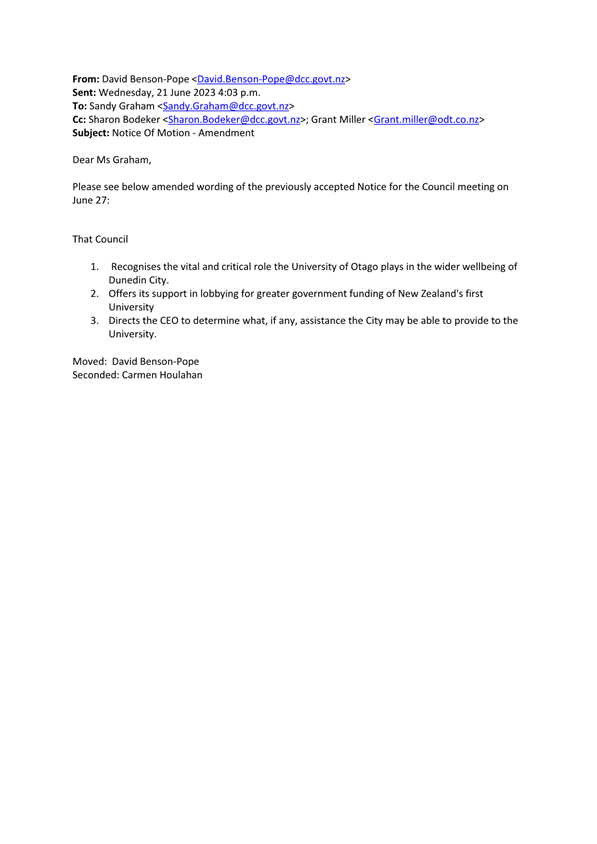
|

|
Council
27 June 2023
|
Resolution to Exclude the
Public
That the Council excludes
the public from the following part of the proceedings of this meeting (pursuant
to the provisions of the Local Government Official Information and Meetings Act
1987) namely:
|
General subject of the matter to be considered
|
Reasons
for passing this resolution in relation to each matter
|
Ground(s) under
section 48(1) for the passing of this resolution
|
Reason for
Confidentiality
|
|
C1
Confirmation of the Confidential Minutes of Ordinary Council meeting -
27 April 2023 - Public Excluded
|
S7(2)(a)
The
withholding of the information is necessary to protect the privacy of natural
persons, including that of a deceased person.
S7(2)(g)
The
withholding of the information is necessary to maintain legal professional
privilege.
S7(2)(h)
The
withholding of the information is necessary to enable the local authority to
carry out, without prejudice or disadvantage, commercial activities.
S7(2)(i)
The
withholding of the information is necessary to enable the local authority to
carry on, without prejudice or disadvantage, negotiations (including
commercial and industrial negotiations).
S7(2)(b)(i)
The
withholding of the information is necessary to protect information where the
making available of the information would disclose a trade secret.
|
.
|
|
|
C2
Confidential Council Actions from Resolutions at Council Meetings
|
S7(2)(a)
The
withholding of the information is necessary to protect the privacy of natural
persons, including that of a deceased person.
S7(2)(g)
The
withholding of the information is necessary to maintain legal professional
privilege.
S7(2)(h)
The
withholding of the information is necessary to enable the local authority to
carry out, without prejudice or disadvantage, commercial activities.
S7(2)(i)
The
withholding of the information is necessary to enable the local authority to
carry on, without prejudice or disadvantage, negotiations (including
commercial and industrial negotiations).
|
S48(1)(a)
The public conduct of
the part of the meeting would be likely to result in the disclosure of information
for which good reason for withholding exists under section 7.
|
|
|
C3
Confidential Council Forward Work Programme - June 2023
|
S7(2)(h)
The
withholding of the information is necessary to enable the local authority to
carry out, without prejudice or disadvantage, commercial activities.
|
S48(1)(a)
The public conduct of
the part of the meeting would be likely to result in the disclosure of
information for which good reason for withholding exists under section 7.
|
|
|
C4
Property Options
|
S7(2)(g)
The
withholding of the information is necessary to maintain legal professional
privilege.
S7(2)(h)
The
withholding of the information is necessary to enable the local authority to
carry out, without prejudice or disadvantage, commercial activities.
S7(2)(i)
The
withholding of the information is necessary to enable the local authority to
carry on, without prejudice or disadvantage, negotiations (including
commercial and industrial negotiations).
|
S48(1)(a)
The public conduct of
the part of the meeting would be likely to result in the disclosure of
information for which good reason for withholding exists under section 7.
|
|
|
C5
Dunedin City Holdings Group: Director Appointments and Re-Appointments
|
S7(2)(a)
The
withholding of the information is necessary to protect the privacy of natural
persons, including that of a deceased person.
|
S48(1)(a)
The public conduct of
the part of the meeting would be likely to result in the disclosure of
information for which good reason for withholding exists under section 7.
|
|
|
C6
Director Vacancies and Reappointment - Dunedin City Holdings Limited
|
S7(2)(a)
The
withholding of the information is necessary to protect the privacy of natural
persons, including that of a deceased person.
|
S48(1)(a)
The public conduct of the
part of the meeting would be likely to result in the disclosure of
information for which good reason for withholding exists under section 7.
|
This report is
confidential because the appointment of director is made public once the
applicant has been notified of the decision..
|
This resolution is made in
reliance on Section 48(1)(a) of the Local Government Official Information and
Meetings Act 1987, and the particular interest or interests protected by
Section 6 or Section 7 of that Act, or Section 6 or Section 7 or Section 9 of
the Official Information Act 1982, as the case may require, which would be
prejudiced by the holding of the whole or the relevant part of the proceedings
of the meeting in public are as shown above after each item.










































































